
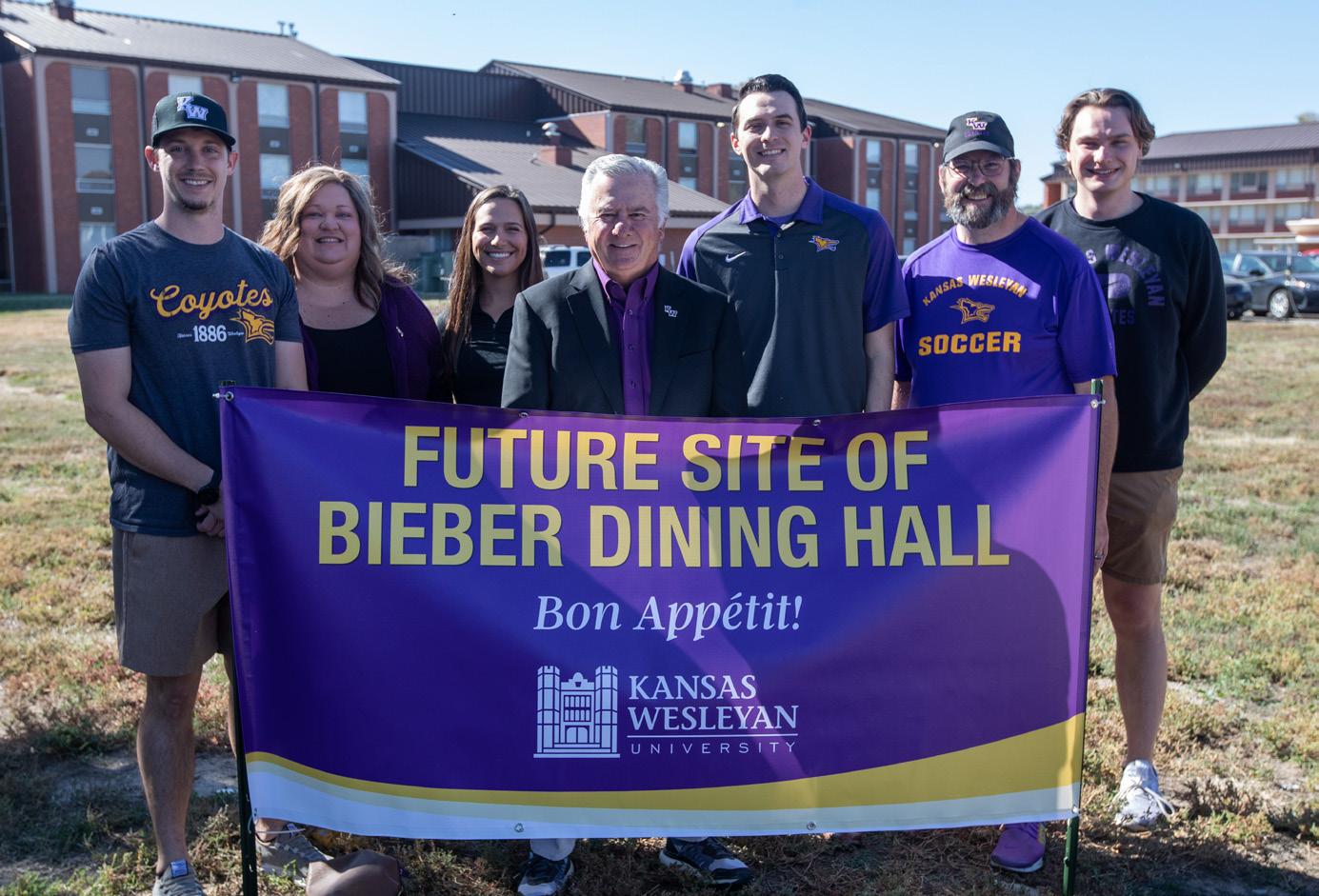
KANSAS WESLEYAN UNIVERSITY Fall 2022
CONTACT
KWU launches next phase of growth
New construction projects
Building into the future
In the history of any organization, there are moments that change its trajectory. Amazon stopped focusing exclusively on book sales. Walmart launched the supercenter. McDonald’s sold something besides hamburgers and fries. I believe that, for Kansas Wesleyan, this year’s Homecoming was one of those moments. In this issue, you’ll see photos from a joyous weekend of gathering together and you’ll read about our two concept unveiling ceremonies that I believe will change the future of this institution. KWU revealed a plan for building new student housing, which we’re calling “Coyote Village,” and for a new dining facility, Bieber Dining Hall bon appétit! This issue’s stories recall past housing. Harold Nelson ’49 remembers living in the basement of Lockwood Hall. Ellene Franzen Austin ’66 recalls the process of moving beds in Pfeiffer, when it was brand new. Memories of housing and dining are tied to the college experience. By building both new student housing and a new dining hall, we hope to create new memories for the next generation of Coyote students.
2022 A message from President Matt Thompson
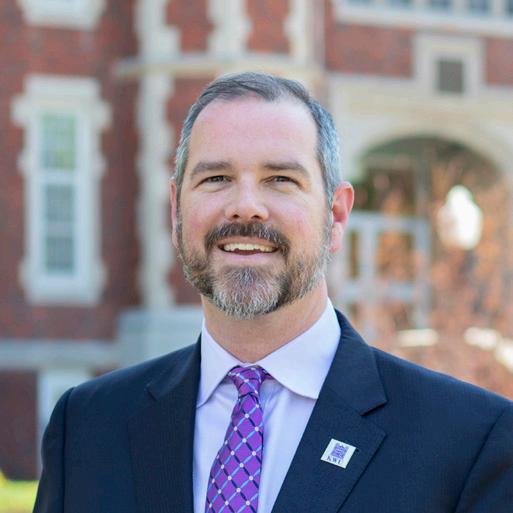
Speaking of those students, we welcomed a tremendous group to campus this fall. Our total enrollment of 859 students marks a 20% jump from three years ago, and a leap of nearly 6% from a year ago! The growth is true across numerous majors and programs and is one of KWU’s biggest enrollment booms ever. Perhaps most notably, 80% of the student body now hails from within a six-hour drive of campus. Statistics show that this boosts studentretention rates.
What’s another factor in increased retention? Building and investing in community, both internal and external. KWU has always invested in Salina, but during the past three years, we have taken that investment to another level. Our annual economic impact is now estimated at $46 million, and our connections within Salina continue to grow and solidify. That’s happening through numerous avenues, including the university’s new Criminal Justice certificate program. Put together with help from Saline County, the program offers bachelor’s level coursework to employees of the Saline County Sheriff’s Office and Salina Police Department. It is made possible by Executive Order 11246, Saline County and the U.S. Department of the Treasury.
Our internal community continues to benefit from growth in our campus ministry programs. Boosted by a stronger relationship with University United Methodist Church, the space available to campus ministry has grown, providing a location specific to these programs. We continue to be committed to ministering to our students and meeting them where they are in their respective faith journeys. That is an essential part of the Kansas Wesleyan experience.
All told, the past few months continue our progression toward becoming the destination private university in the state. While work remains to be done, we will remember Homecoming 2022 as a moment when we, as a campus community, stepped into the future and never looked back.
All the best,
Matt Thompson, Ph.D., President and CEO

and
Design:
Writing Assistance: Bob Davidson Dan Froehlich Skylar
’21 Photo Credits: Tanner Colvin ’11 Wendy Gibson G’13 Jean Kozubowski Skylar Nelson ’21 Editorial Assistance: Kris Heck ’20 Executive Vice President of Advancement and University Operations Ken Oliver Send address changes to: Advancement Office 100 E. Claflin Ave. Salina, KS 67401 alumni@kwu.edu 785-833-4392
Kansas Wesleyan University Fall 2022 Contact is the official magazine of Kansas Wesleyan University
is published by the Office of Marketing and Communications. Managing Editor: Brad Salois
Jean Kozubowski
Nelson
The Contact Magazine is printed by Consolidated Printing. Contact Consolidated for all your printing needs! P.O. Box 1217 • Salina, KS • 800.432.0266 • www.consolidatedprinting.com
For she's a busy, good fellow
Most scholars taking a research leave use the opportunity to narrow their focus and limit their studies.
Dr. Meredith Drees, associate professor of Religion and Philosophy at Kansas Wesleyan University, is taking the opposite approach.
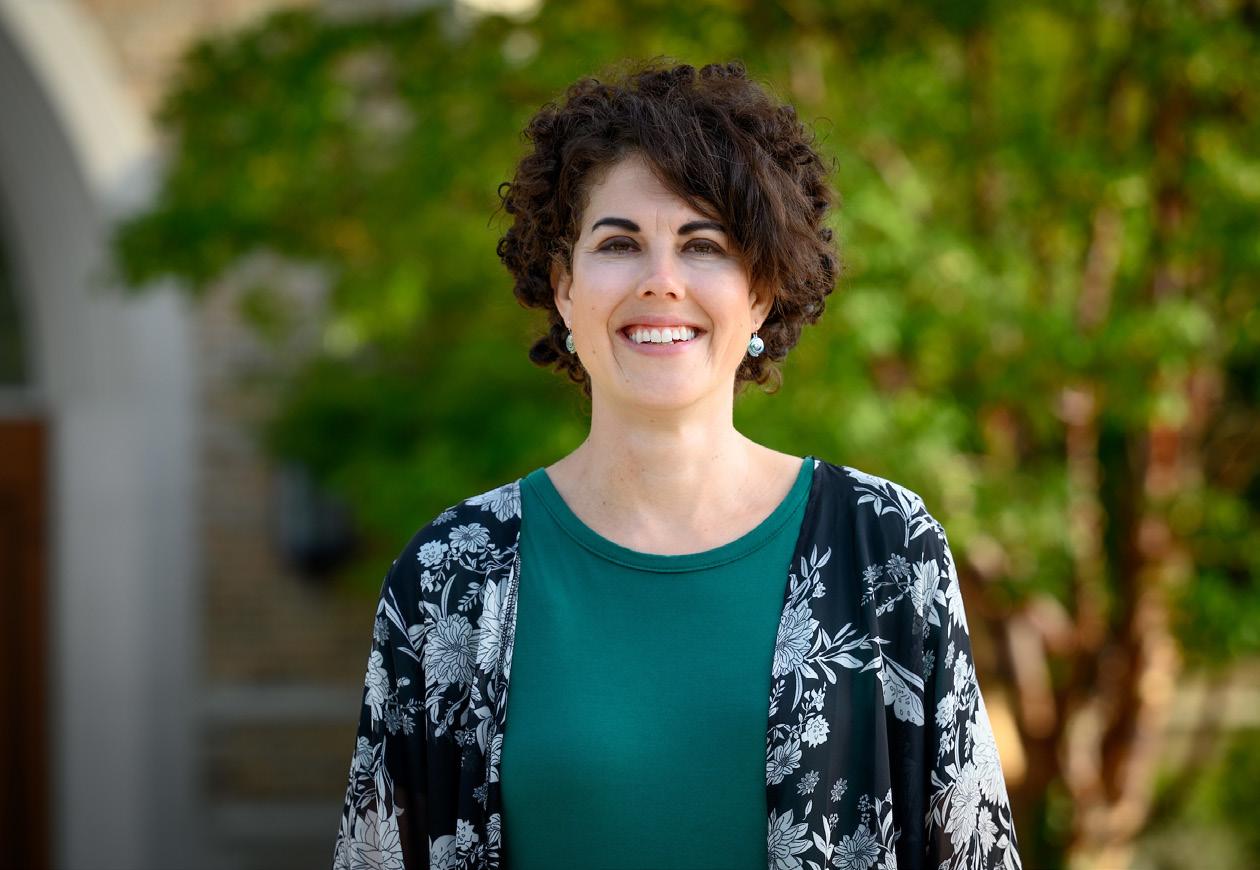
She expanded her projects by a couple of millennia and is organizing multiple international conferences during the time she is a research fellow for 2022-23 at the Center for Philosophy and Religion at the University of Notre Dame in Indiana.
Drees joins five other fellows for a year at Notre Dame, which started Aug. 15 and will go through May 15.
Her official project is writing her second book, which will look at questions mostly centered around Immanuel Kant’s religion and questions Iris Murdoch raises. One of the questions is, is forgiveness possible without God.
Love, virtue, forgiveness
“I’ll be looking at interpretations of love and virtue and forgiveness,” she said, because that is also the theme of the fellowship.
The editor of Drees’ first book “Aesthetic Experience and Moral Vision in Plato, Kant, and Murdoch: Looking Good/Being Good” and a reviewer recommended Drees for the fellowship at Notre Dame.
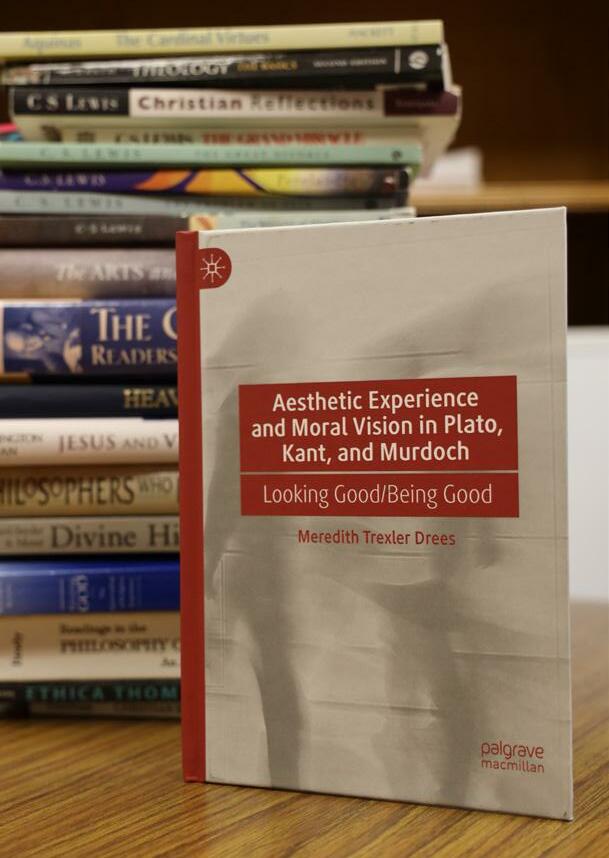
That book, published last year, ad dresses the ways in which Plato, Kant and Iris Murdoch share the thesis that aesthetic experience is connected to morality. Plato lived more than 2,400 years ago in ancient Greece; Immanuel Kant was an 18th-century German philosopher; and Murdoch was a 20th-century English novelist and philosopher.
The subtitle is a pun, Drees said. “‘Looking good’ doesn’t refer to being attractive but to being good at looking,” she explained.
“The reason for my title is that Iris Murdoch’s view of what it means to be good is to truly look at other people, as to be able to see them for who they truly are.”
Drees has written an outline of
another book, which results from some questions that came out of the first one, Drees said.
“This outline is for another eight-chapter book. They expect me to have that completed by the time I leave in May — a chapter a month!”
Conferences, colloquies
Drees will have a busy year. Besides the “chapter a month,” she'll work with the Iris Murdoch Research Centre, in Chichester, England, on an international conference to be held in July at Notre Dame. She has already been asked to speak at the Centre in 2024 in England.
She has been asked to speak at the American Society for Aesthetics annual meeting in Portland, Ore., in November on her research at Notre Dame.
Drees is organizing a colloquium on Kant’s religion, bringing in schol ars from around the world, the first of its kind, also at Notre Dame from March 31-April 1.
Plato has not been forgotten. Drees has been asked to co-edit a book about ancient philosophy for the fall of 2023.
In June, before she left for Indiana, she was the aesthetics speaker at the 2022 Rutgers Summer Institute for
Diversity in Philosophy, representing the American Society for Aesthetics.
The Rutgers Summer Institute was all about diversity, equity and inclusion, Drees said.
Her topic was how the idea of “looking” that Murdoch has helps us to really see other people and pay attention to them. In that sense, she said, it promotes inclusion.
“We’re not ‘othering,’ we’re includ ing, appreciating other people,” she said.
Years of study and work
Despite all the recent attention Drees is getting, she’s far from an overnight success.
“I spent nearly 20 years working on some of these topics,” she said. “I started working as an undergraduate on the connections between ethics and aesthetics.”
That led her to the work she did in graduate school that led to the first book.
She worked on the final edits of her book while undergoing chemo therapy for breast cancer. That story was in the Spring 2022 Contact.
It was a tough time, she admitted, but she had to “transition to grati tude to get through it. If you see it as this thing that’s negative, it can
Drees is working on a followup to the book she published in 2021, among other projects during her fellowship at Notre Dame.
just eat away at you. But if you see it as something positive, you can grow from it,” Drees said.
“When I had cancer, I was focusing on goals and dreams because I didn’t want to focus on, ‘I’m going through chemo.’ Looking ahead is part of what got me through it. It served a purpose – it propelled me forward to the other side.”
Drees has been at KWU since 2013, when she joined the faculty as an adjunct. She passed her review for tenure this spring.
Teaching and research
Drees is as enthusiastic about teaching as she is about her research. Students voted her the 2019-20 Exemplary Teacher of the Year.
The stereotype is you have to be a researcher or a teacher, but Drees thinks it’s possible to do high-level research and teach.
“You can do it all – you can be really connected and support your students, and your research should inform what you’re doing with your students,” Drees said. “My secret is I’ve tried to make it all holistic and make it work together.”
By Jean Kozubowski
Fall 2022 CONTACT 3
Photo by Matt Cashore/University of Notre Dame
Meredith (Trexler) Drees, associate professor of Religion and Philosophy, is spending the year as a fellow at the Center for Philosophy and Religion at the University of Notre Dame in Indiana.
A look back at

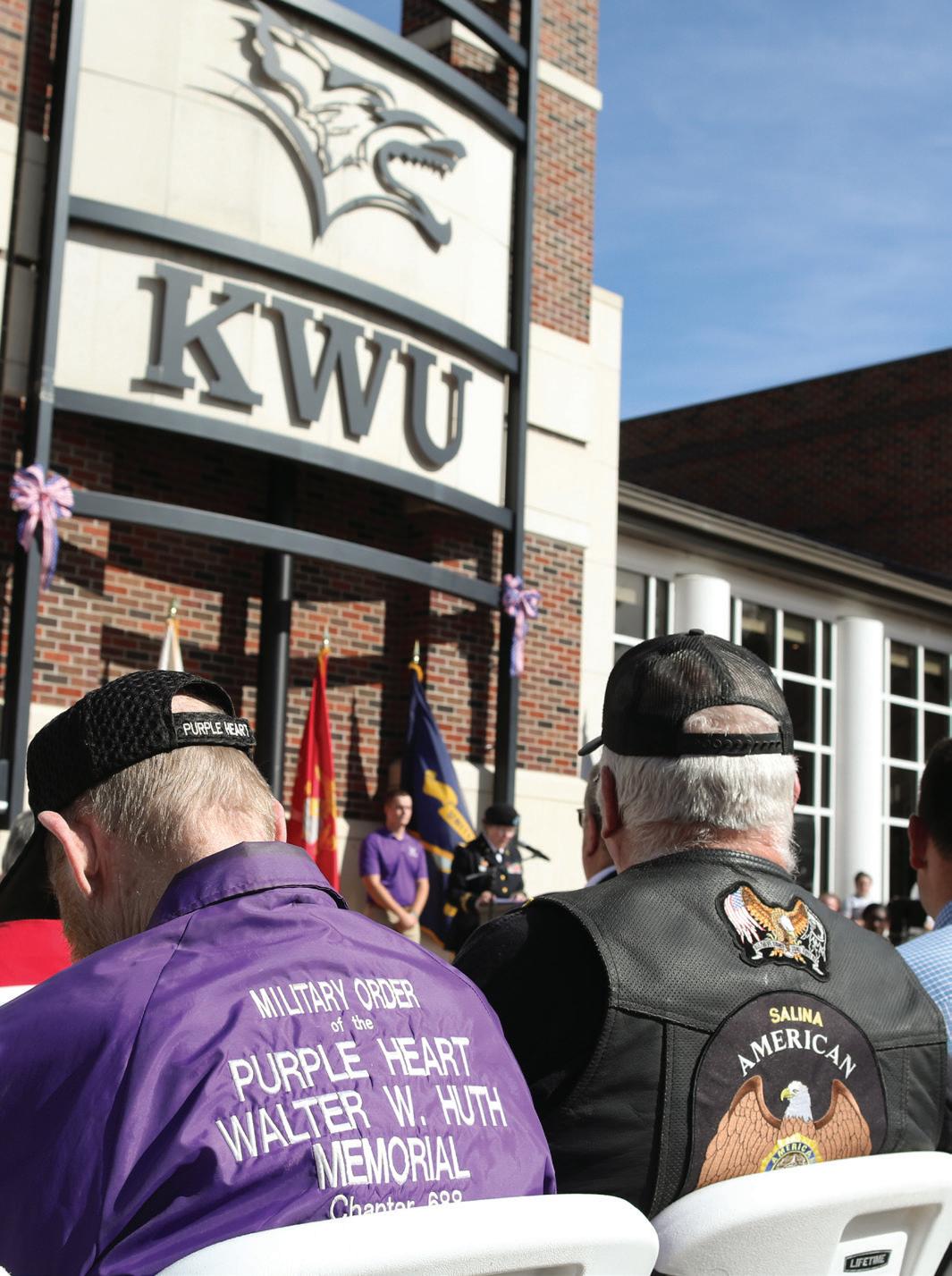
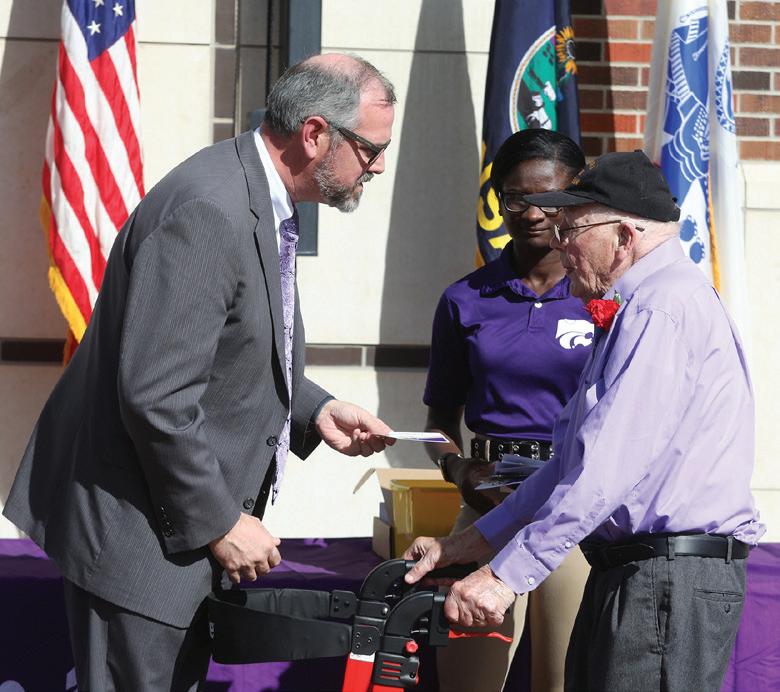
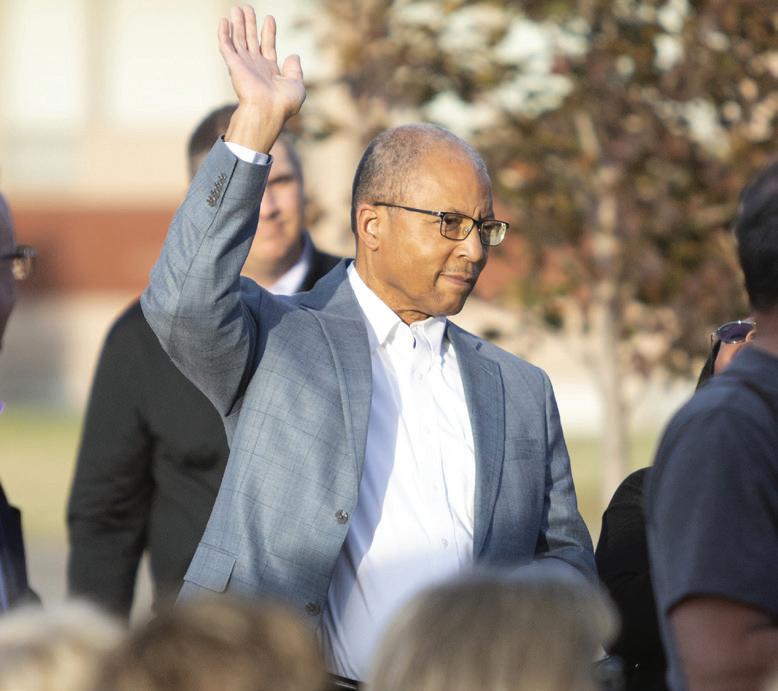
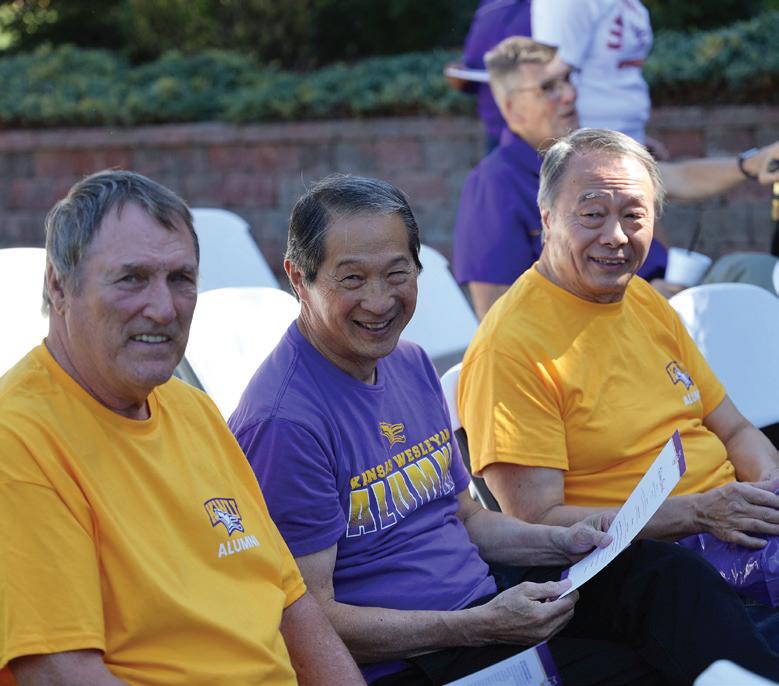
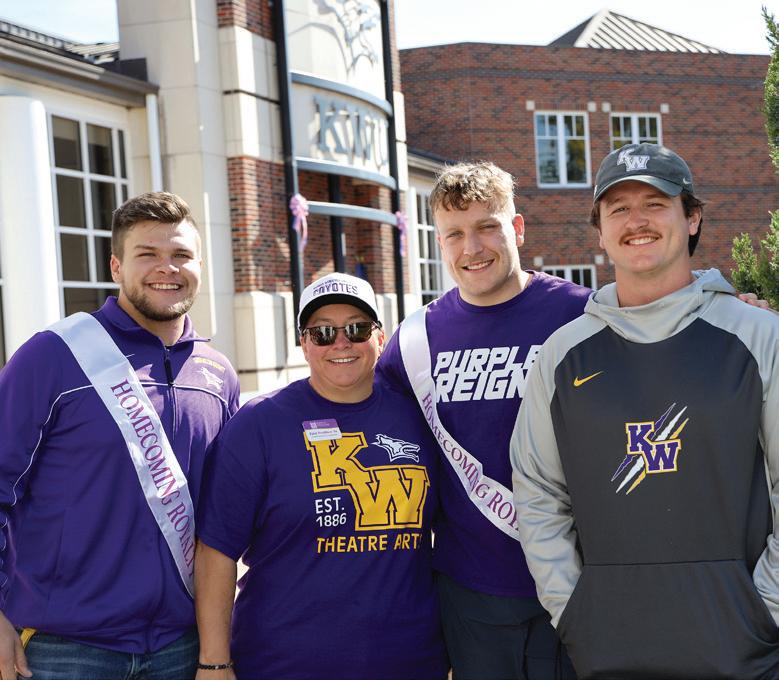
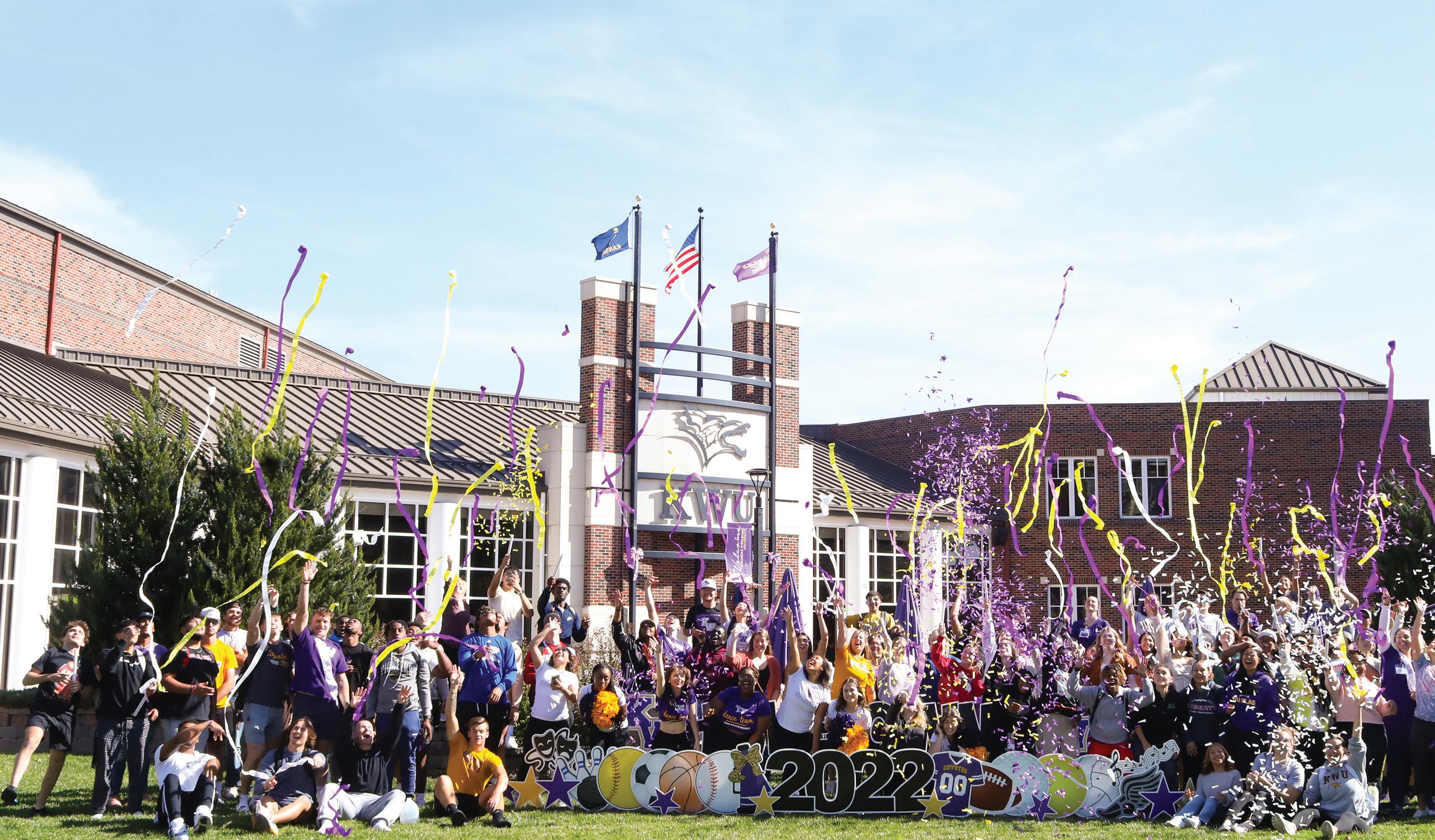
| 2022
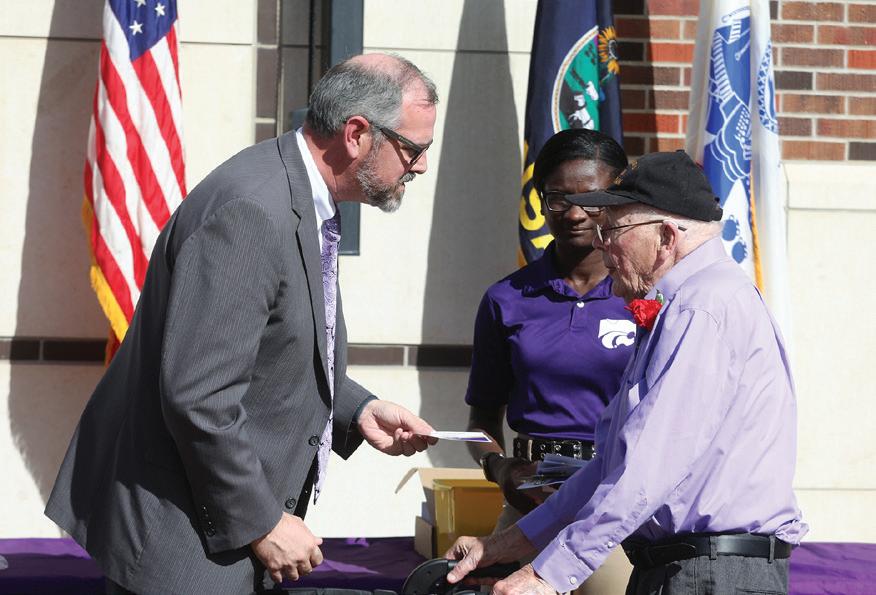
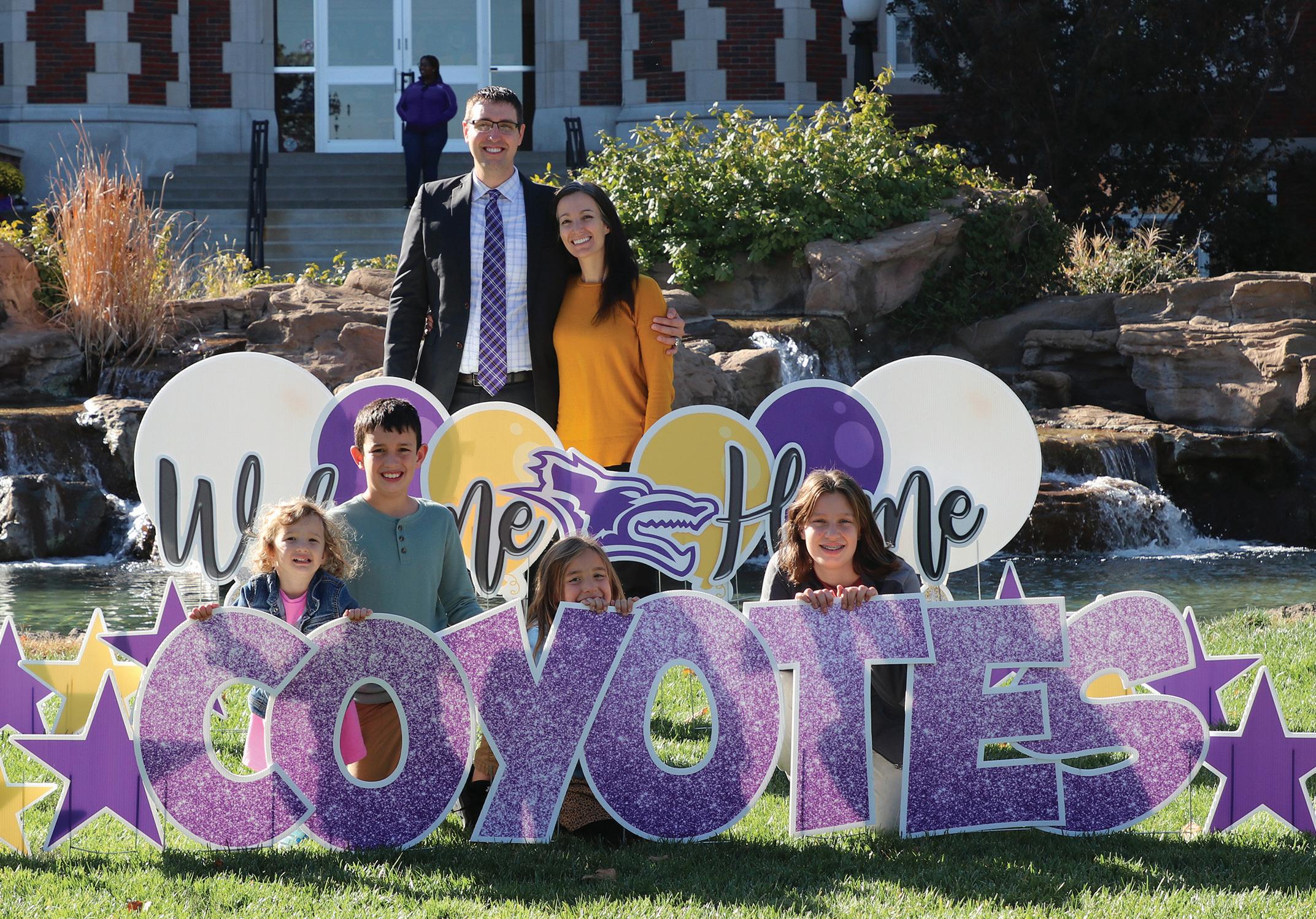
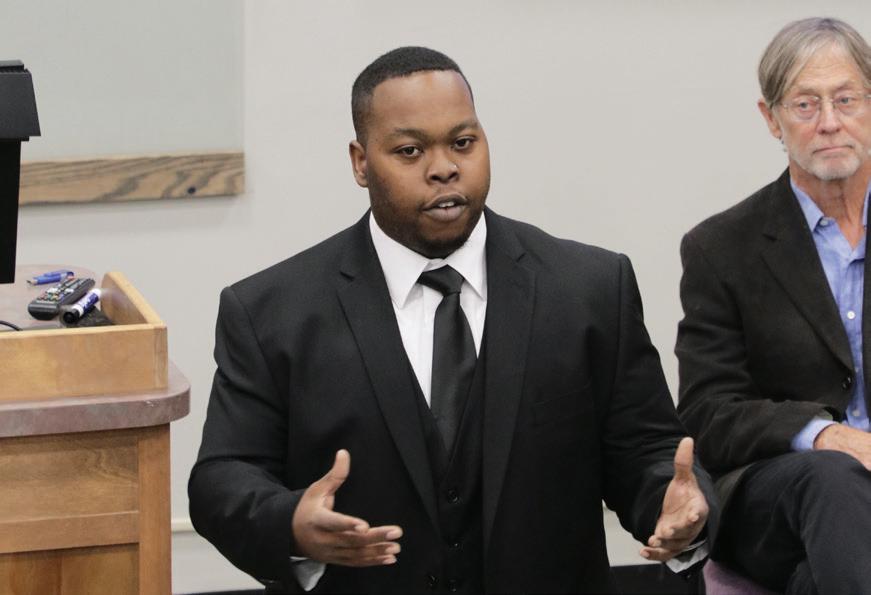
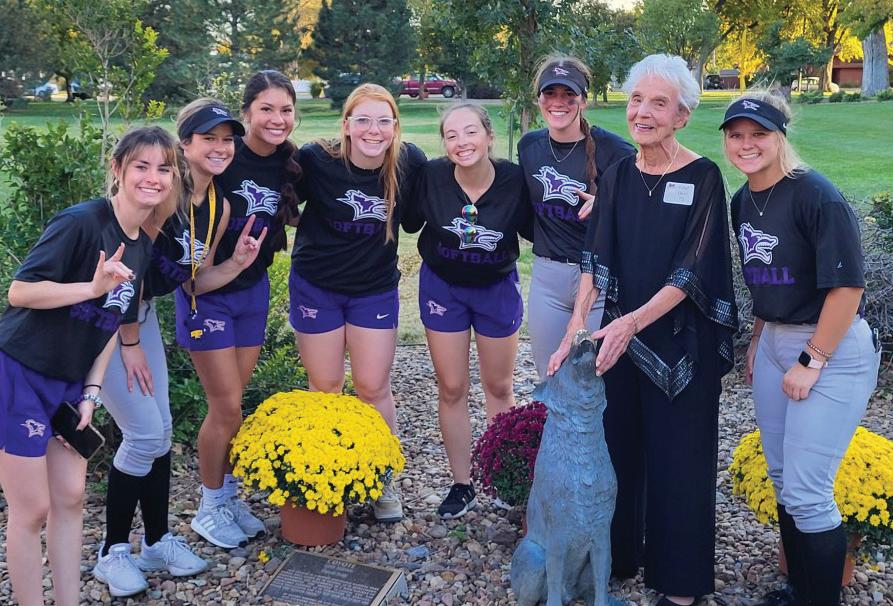
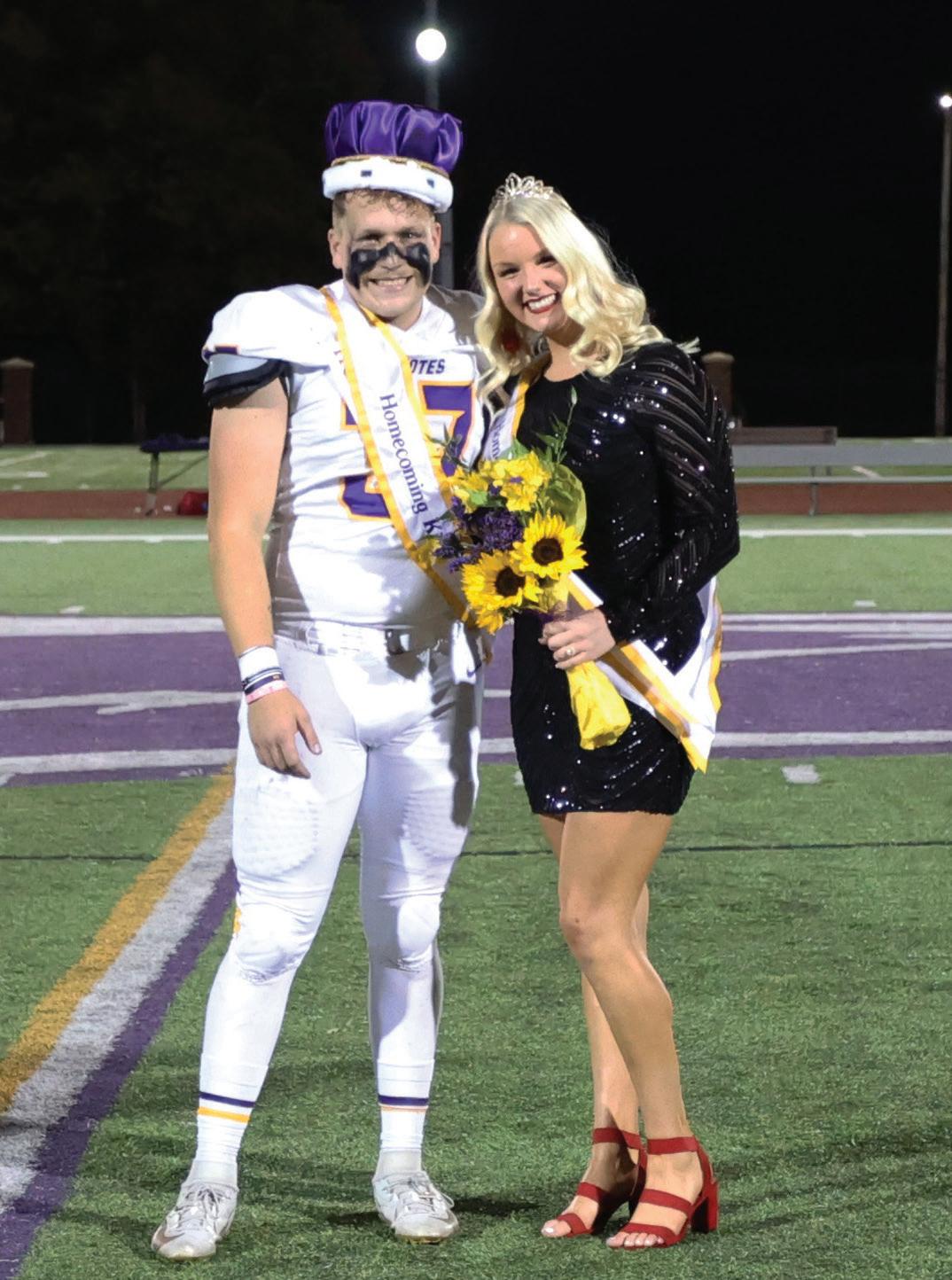
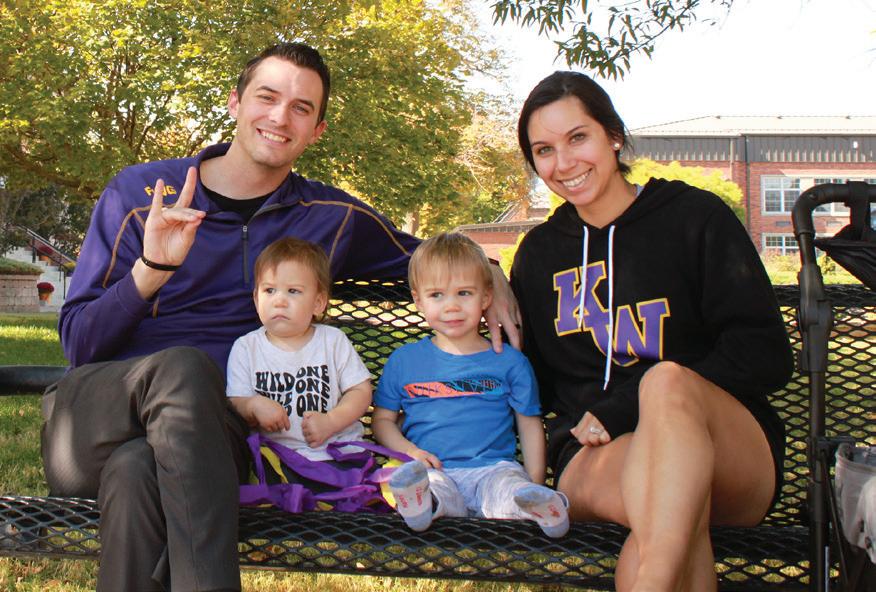
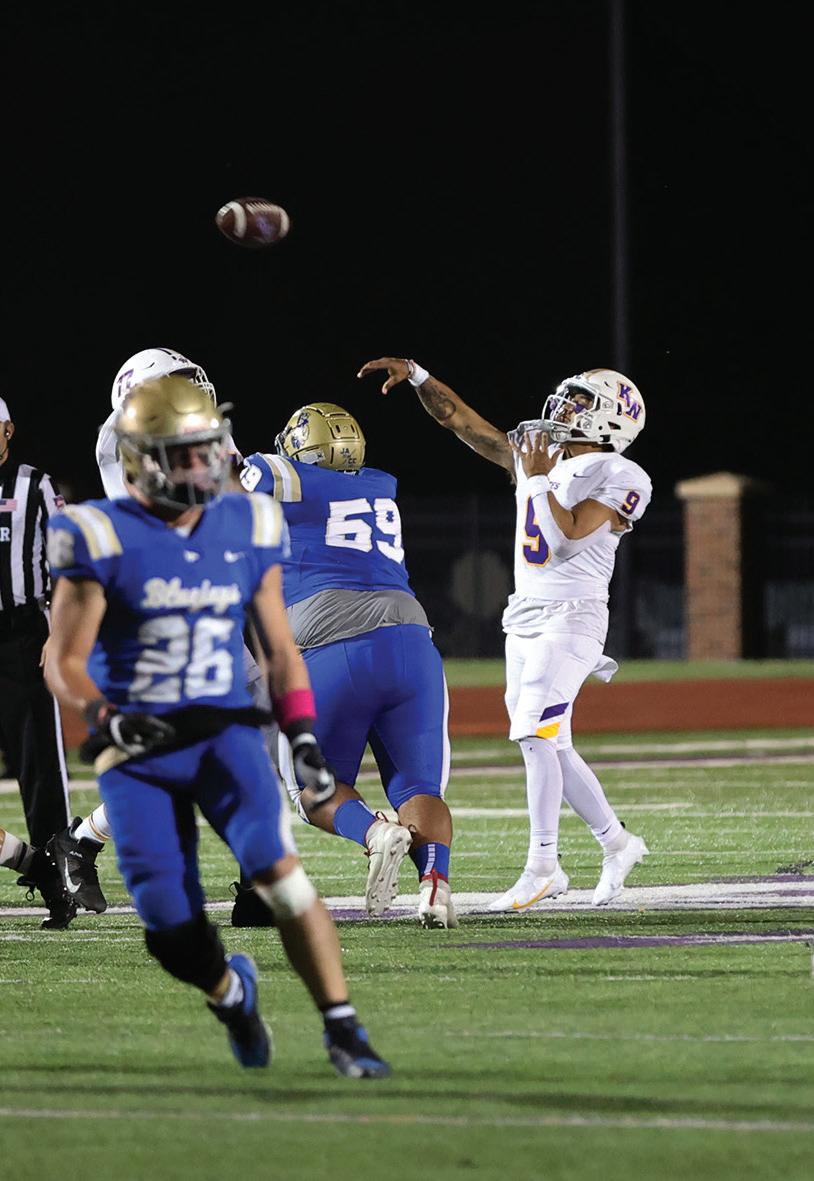
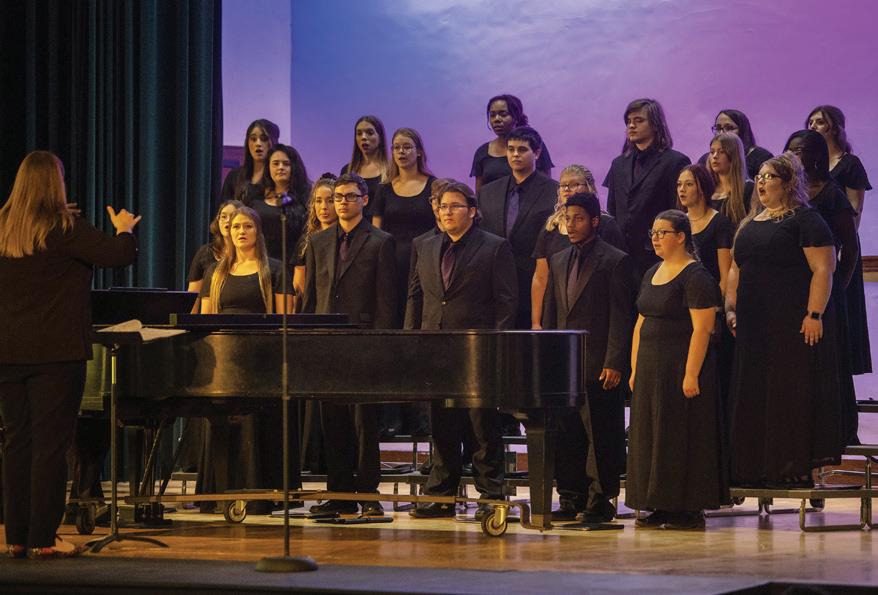
Fall 2022 CONTACT 5 @goKWU or @KWUCoyotes | Kansas Wesleyan University | Kansas Wesleyan University Save the Date for Spring Alumni, Family & Community Weekend – April 21-23, 2023
COYOTE VILLAGE
KWU gets ahead of the curve with student housing
“Home is where the heart is.”
No one knows where this expression originated, although some ascribe it to the Roman writer Pliny. Kansas Wesleyan University believes that, by building a true home for its students, the university will foster a feeling of community that could last for generations. Students will remember their time at KWU with even greater fondness.
That's why the university has invested in numerous studentfocused projects during the past five years, the latest of which are true student homes.
KWU unveiled the concept of Coyote Village, its first new student housing since 1967, on Oct. 20 before a crowd of trustees, students, community supporters and other members of the KWU family.
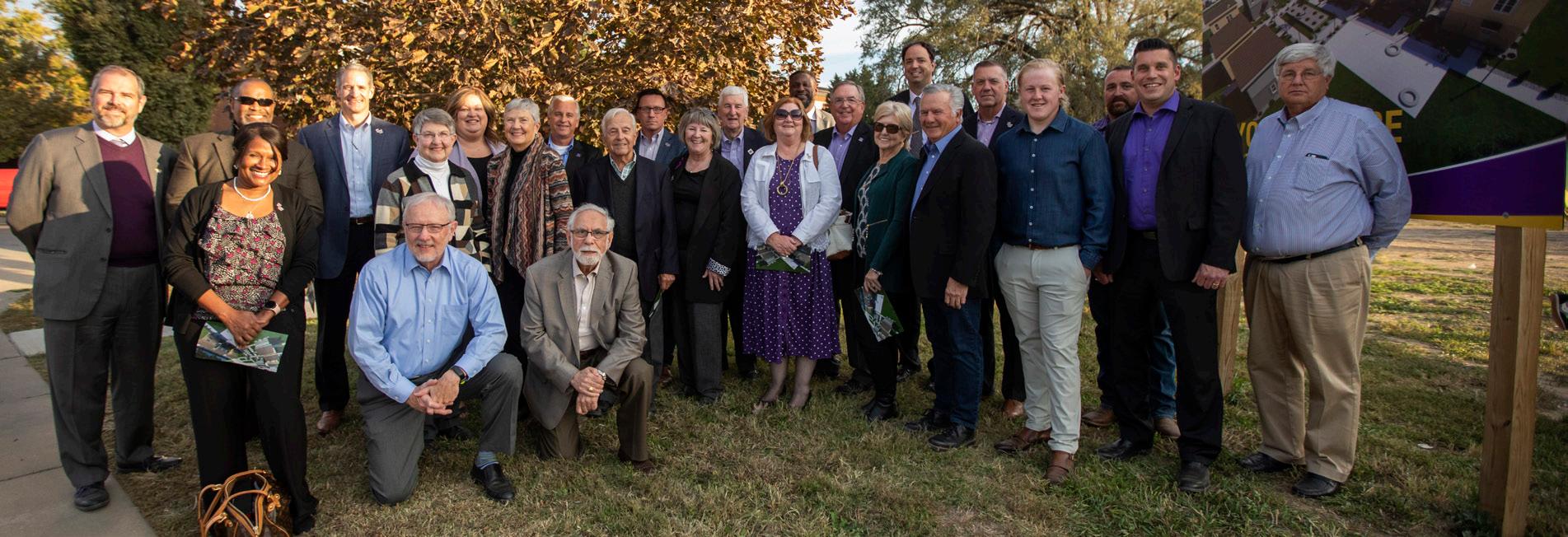
Much of the construction will be done with local companies.
Coyote Village is a series of small, two-story houses that will be on Highland Avenue between Claflin and Cloud, on the west end of the KWU campus. The opening phase
of construction, which will include seven of these homes, is scheduled for occupancy during the 2023-24 academic year.
The homes will include two bedrooms, a bathroom, kitchen and sitting area on the first floor; three bedrooms, bathroom and living room on the second floor. They'll be built just like a house.
“Student housing is a tremendously important part of the college experience,” said Dr. Matt Thompson, KWU president. “These small houses cater to what students are looking for, as they offer more privacy and flexibility than a traditional residence hall. They will offer a true home-type feel, with stackable washer and dryer,
stove, refrigerator, two bathrooms and two living areas, all in addition to private, individual bedrooms.”
In preparation for the new housing, the university has already completed a new parking lot across the street, Oliver said.
It's not just the physical space that has university leadership excited.
“This will add a whole new dynamic to residence life,” said Bridget Weiser, vice president of student development. “Coyote Village will have different activities, things like corn hole, fire pits and gathering spaces. It will enhance what we're offering on campus as a whole, but there will definitely be a unique element to this space.”
“This project came about somewhat cyclically," said Oliver.
“To continue our enrollment growth, we knew the university would need to improve our residential housing. However, it takes time to have significant enrollment growth, the kind that merits a full, $12 million-$15 million residence hall. With this project, KWU can build these homes in small groups and build alongside its enrollment growth curve, thereby growing the student experience right alongside the university's enrollment.”
Coyote Village will be the first new student housing built by KWU since Feb. 24, 1967, when the groundbreaking was held for Wesley Hall, completed in 1969.
“Whether Wesley, Wilson, Pfeiffer, Schuyler, North or South Hall, student housing at KWU has always been a place to create memories. It is that type of camaraderie that the university hopes to inspire with the creation of Coyote Village,” Oliver said.
“Because these will be small homes, with just five individuals living together, we expect there will be strong ties developed in Coyote Village. The homes are a step into the future for our university, but we believe that in some ways, this may hearken back to a time when student housing brought groups closer together. We look forward to Coyote Village becoming a part of our campus’ heartbeat.”
6 CONTACT | Fall 2022
THE FUTURE OF COLLEGE RESIDENCE LIFE
University officials, faculty, staff, board members, alumni and supporters gather to celebrate for the concept unveiling for Coyote Village on Oct. 20.
For more than 100 years, students found a home on, around campus
Kansas Wesleyan has had a long history surrounding campus housing, going back to 1904, when Schuyler Hall was opened as a women's residence.
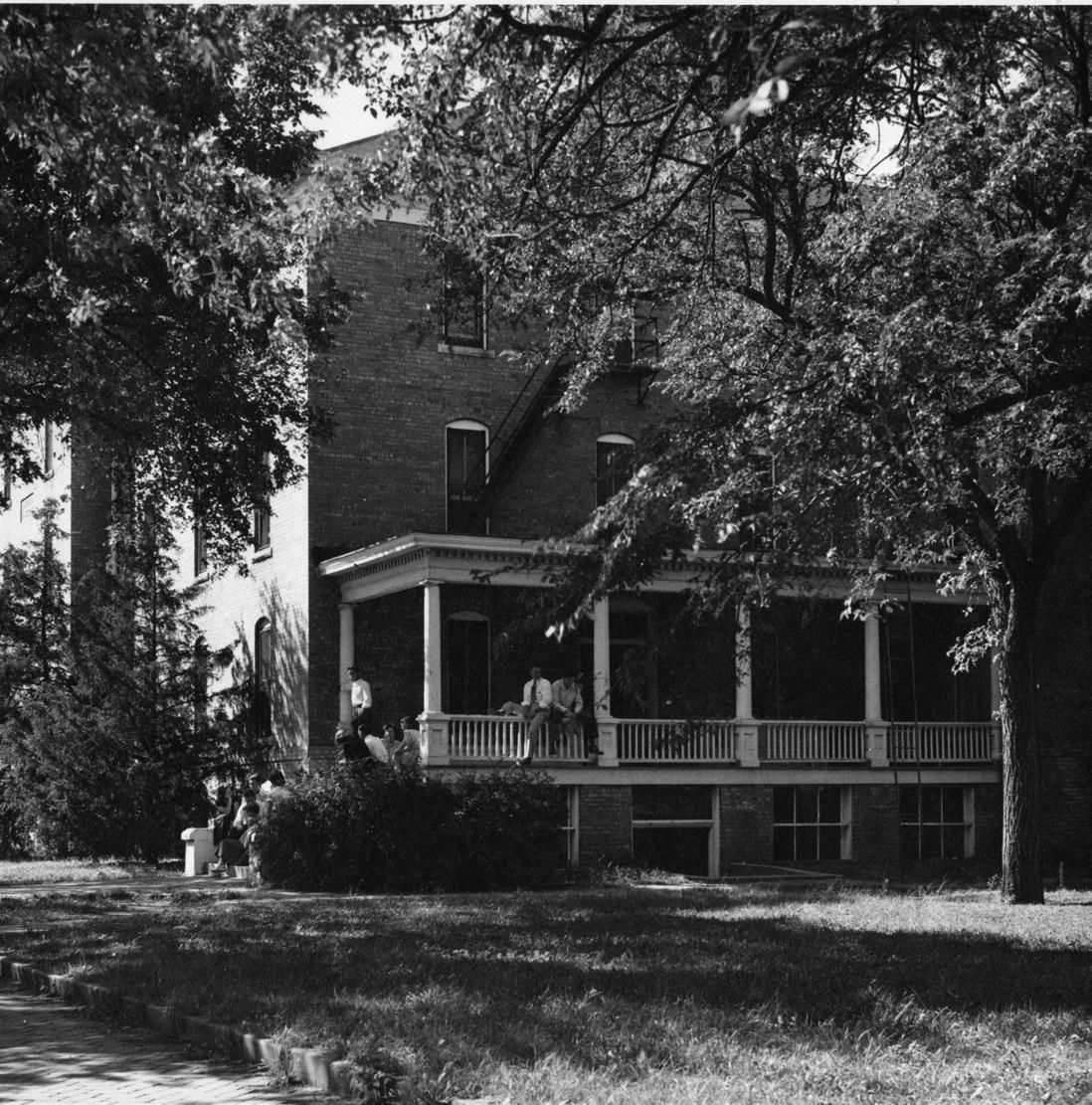
Now the university is preparing to begin construction on Coyote Village, starting with seven small houses, each of which will house five students.
Housing may be going from large rooms to tiny houses, from Schuyler Hall to Coyote Village, but the sense of community is an attribute that has always been fostered.
Schuyler Hall
Schuyler Hall was a grand, fourstory structure. Female students moved in that September, though only the basement and first floor were completed.
One early resident noted, “Many and amusing experiences will the first girls to occupy Schuyler Hall have to relate, experiences that can never be had by those who follow us, for when most of us arrived on September 8th only the first story above the basement was completed. The rooms were large and bare, but we went to work with a will and soon with pictures and curtains made them both cozy and home like.”
It had four parlors and rooms dedicated for music and reading and included a kitchen, laundry, music hall and meeting rooms. The women ate in Kemble Dining Hall, part of Schuyler.
The building was to have cost $12,000, according to KWU historian John Cornett, but, “It was found that the heating plant had been added, sidewalks built, rooms furnished and decorated and insurance paid, the total cost approximated $17,000. When completed, it included 50 large student rooms, a dining-room with accommodation for 200,
Schuyler Hall was built in 1904 as a residence hall for women and turned over to the men in 1951, when Pfeiffer Hall was built. It was demolished in 1966.
reception, and library rooms.”
Male students often boarded in town.
Room and board
According to the 1905-06 college catalogue, students at the KWU Business College, at Santa Fe and Walnut, could get “room and board, everything furnished, private family, $2.50 to $2.75. Good room furnished and taken care of near the college at 50 cents a week each, two to a room. The college dining hall on the first floor of the building will furnish a good quality of board at $1.85 per week in advance.”
Pfeiffer Hall
Male undergrads didn’t have a place to live on campus until 1951, when Pfeiffer Hall was built for the women and Schuyler Hall was turned over to the men.
Ellene Franzen Austin ’66 lived in Schuyler for a year, then moved
into a remodeled Pfeiffer in 1963. She remembered Schuyler as an old house with large rooms and high ceilings. The old dorm was cheaper than Pfeiffer.
Pfeiffer seemed very new and modern, compared with Schuyler, but it wasn’t necessarily an improvement. The beds were so uncomfortable that Ellene and her roommate moved the mattress on to the floor. She found the nights so noisy that she slept with a soft pillow over her eyes and ears.
There were no elevators, remembered Dr. Karen Franzen Johnson ’68, who lived in Pfeiffer from 1964 to 1968, which made life harder for her sister Lois Clegg ’74, who lived on the third floor.
Karen moved into an honor dorm her last year. Bunk beds accommodated four women in each apartment, with desks in the living area. And she no longer had a curfew.
History of KWU residence halls
Schuyler Hall Built in 1904 for women, given to men in 1951, torn down in 1966. Dedicated in honor of Dr. Aaron Schuyler, the University’s second president and a beloved university founder.
Pfeiffer Hall Built in 1951; 100room addition in 1963. Named in honor of philanthropist Annie Merner Pfeiffer, wife of Henry Pfeiffer. The Pfeiffer Foundation was established in 1939 and provided funds to liberal arts institutions across the nation, particularly those like KWU with ties to the Methodist Church.
Barracks Purchased after World War II for married and nontraditional students. Sold in 1958.
North and South Halls Built in 1957 for nontraditional, married students and junior faculty. Torn down in 2021 and 2022, respectively.
Wilson Hall Built originally for men, now co-ed, named for Murray A. Wilson, who was on the Board of Trustees and was a member of the executive committee during the 1940s and 1950s. He helped to finance and furnish the hall, along with various other Wesleyan benefactors.
Wesley Hall Ground broken in 1967, completed in 1969. Called the New Men's Dorm for 22 years, until 1991, when it was named in honor of the founders of the Methodist Church, John and Charles Wesley.
Fall 2022 CONTACT 7 Continued, Page 8
“My future husband, Al, (class of '62) invited me to a Peter, Paul and Mary concert in Kansas City," recalled Kathy Franzen ’65, who lived in Pfeiffer Hall. “I would not have made it back by curfew. Mrs. Fuson, who was a truly gentle soul and a dorm mother to us all, gave me permission to go, and opened the door for me to come in late.”
(Editor's note: Women had curfews at KWU at this time; men did not).
Curfews for women were 10 p.m. on weekdays, midnight on weekends, and enforced by the housemother.
Wilson Hall
Men moved into their own, brandnew residence hall in 1961, when Wilson Hall was built.
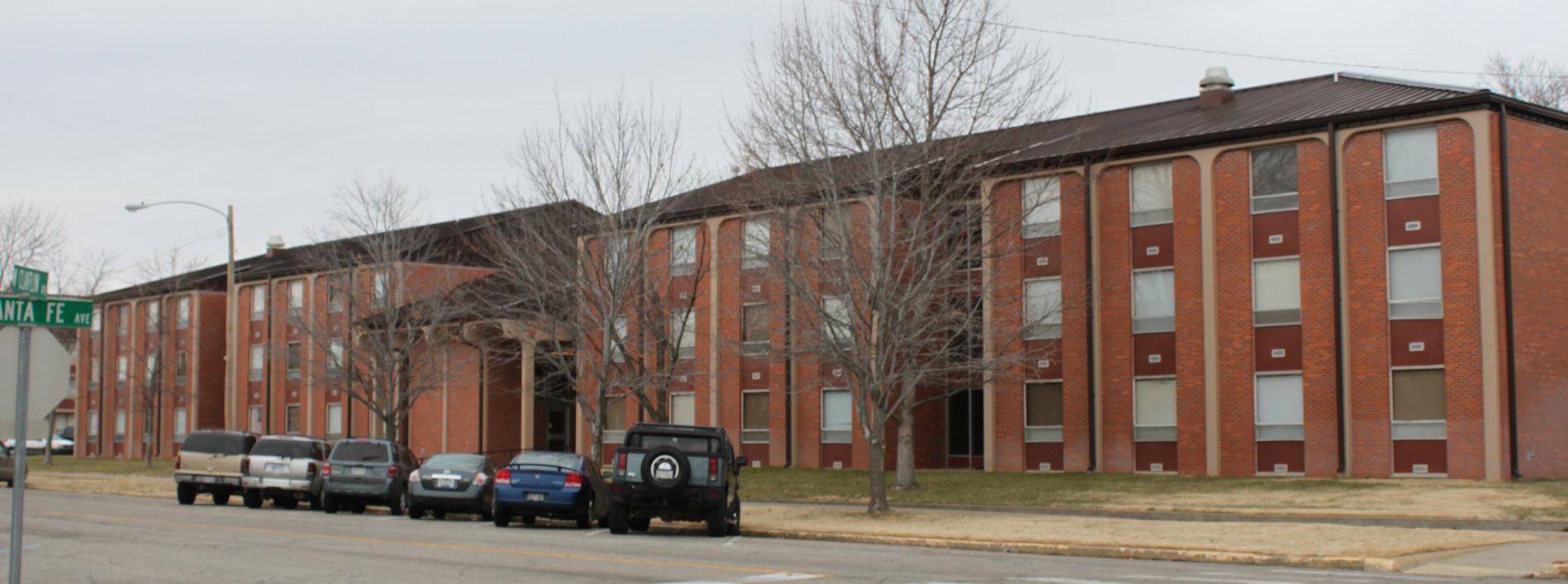
Like Schuyler and Pfeiffer, bathrooms in Wilson were down at the end of the hall. Residents were supposed to yell, “Flushing!” when you did, so that dorm-mates in the shower didn’t get scalded.
With the men settled in their new space, Schuyler Hall was demolished in 1966.
North and South halls
After World War II, the university secured three barracks
that accommodated married and nontraditional students. They were sold in 1958, after being replaced by North Hall and South Hall in 1957.
Longtime Coyotes will remember the cultures of North and South Hall, which many spoke fondly of during their tear-downs in the summers of 2021 and ’ 22, respectively. These often served as homes for those in unique situations, such as married couples or junior faculty.
Wesley Hall
Construction on the last campus residence hall was begun in 1967 and completed in 1969. In 1991, 22 years later, it was finally christened Wesley Hall, for the founders of the Methodist Church.
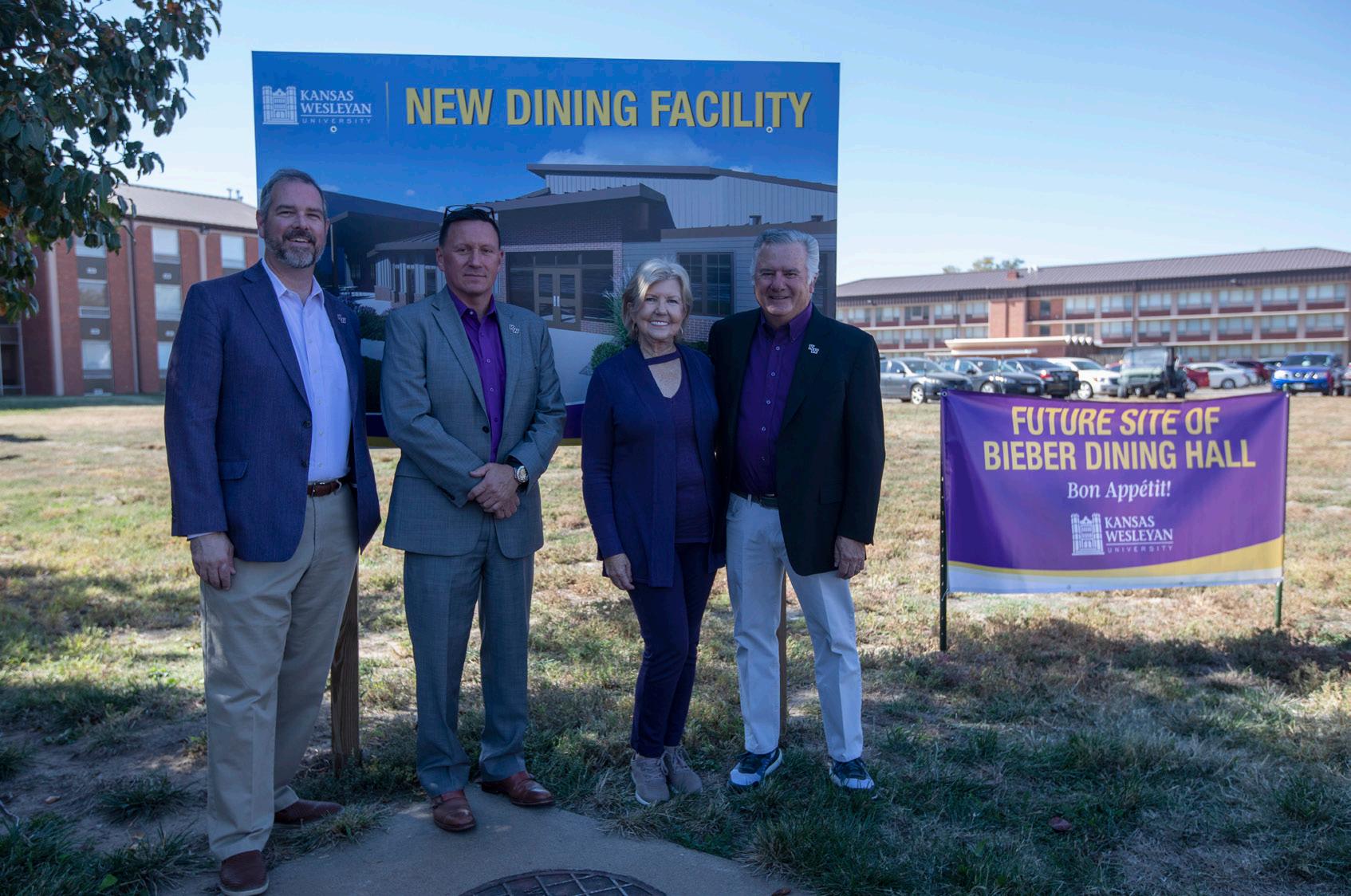
New concepts in room — and board
Homecoming & Family Weekend saw the unveiling of two new ideas affecting student life. On Oct. 20, the concept of Coyote Village, small houses as an alternative to residence halls, was unveiled. On Oct. 22, the university celebrated a new, stand-alone dining hall, thanks to the generosity of Jeff Bieber ’71. The structure, to be called Bieber Dining Hall bon appétit!, will be built on the corner of Kirwin and Santa Fe. It will include a range of dining and beverage options. Pictured at the site are Dr. Matt Thompson, KWU president; Ken Oliver, executive vice president of Advancement and university operations; and Margie ’71 and Jeff Bieber.
A look back
When KWU last built new student housing in 1967:
• The median household income was $7,143.
• A first-class stamp cost 5 cents.
• New movies included In Cold Blood, The Dirty Dozen and Guess Who’s Coming to Dinner.
• Johnny Unitas of Baltimore won the NFL Most Valuable Player award. In baseball, Tom Seaver was named the National League Rookie of the Year. Seaver would pitch through the 1986 season, meaning that his tenure in MLB overlapped that of five Kansas Wesleyan presidents.
• The Grammy Award for Album of the Year went to one of the most famous albums of all time, Sgt. Pepper’s Lonely Hearts Club Band from the Beatles.
8 CONTACT | Fall 2022
Wesley Hall, shown here in 2016, is the last residence hall built on the Kansas Wesleyan campus, until this year. Ground was broken for Wesley in 1967 and the hall was finished in 1969.
History From Page 7
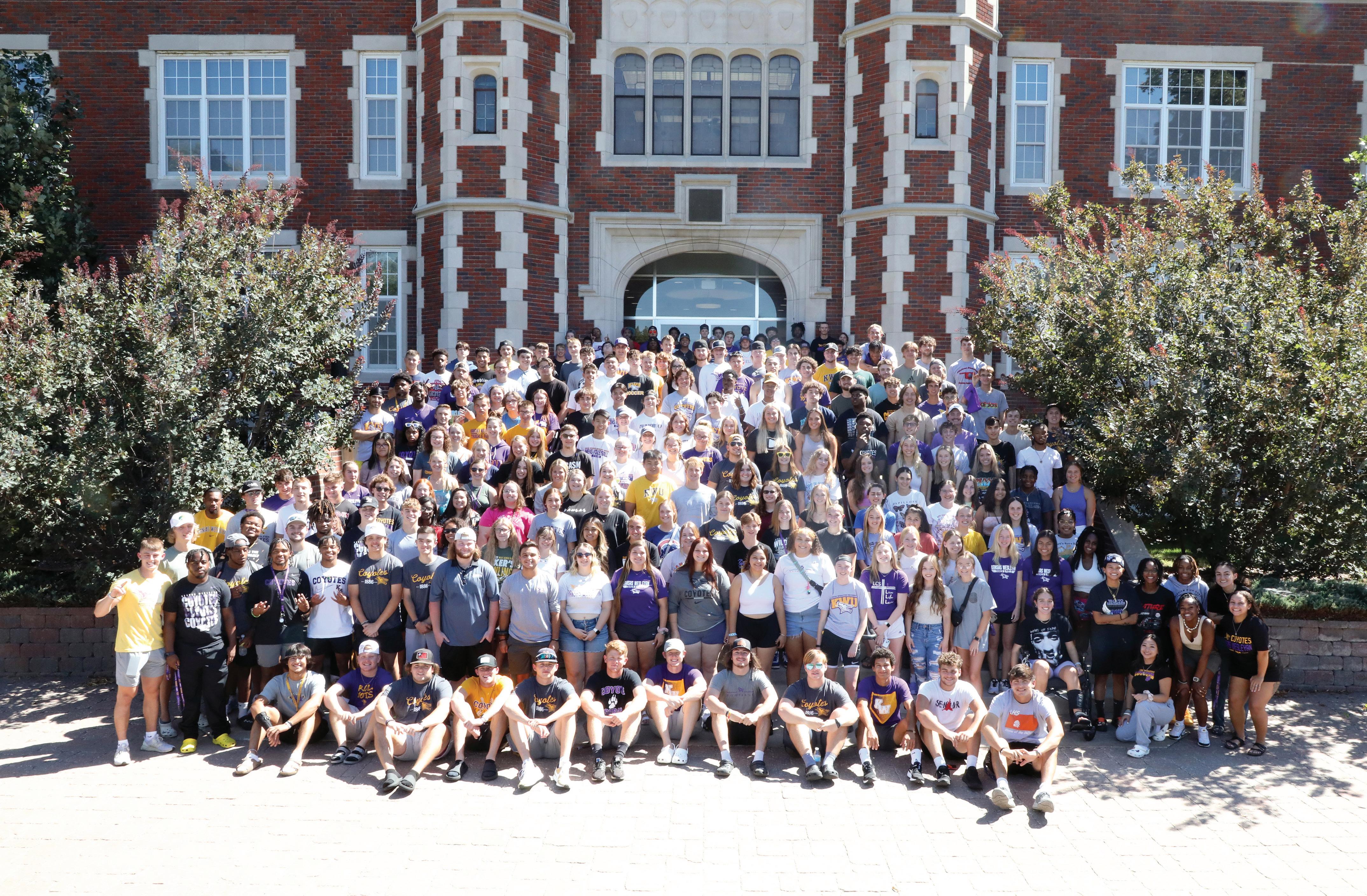
Fall 2022 CONTACT 9
in student
jump in enrollment
increase in enrolled students in
of KWU’s student body comes from within six hours of campus, which aids with both recruitment
retention. current top majors include Nursing, Business, Psychology and Sports Management. 5.8% 27% 80% 3 4 Coyotes! Coyotes! total students! 859 19.97% the top states students hail from in this class are Kansas, Texas and Oklahoma. 2022-23
increase
enrollment since 2019.
since last year.
KWU’s MBA program.
and
NELSON ’49 RECALLS TOUGH TIMES, FUN
Harold Nelson ’49 wasn’t planning on going to college. His plan was to stay home on the farm in Scandia.
He wasn’t interested in going to Kansas Wesleyan, even though a cousin, B.O. Peterson, was a member of the Class of 1903.
But a college recruiter talked him and a cousin, Warren Nelson, into it.
That was the beginning of a long and very deep family connection to Kansas Wesleyan.
Harold was back on the KWU campus to celebrate his 99th birthday on Sept. 14 and spoke about his experiences.
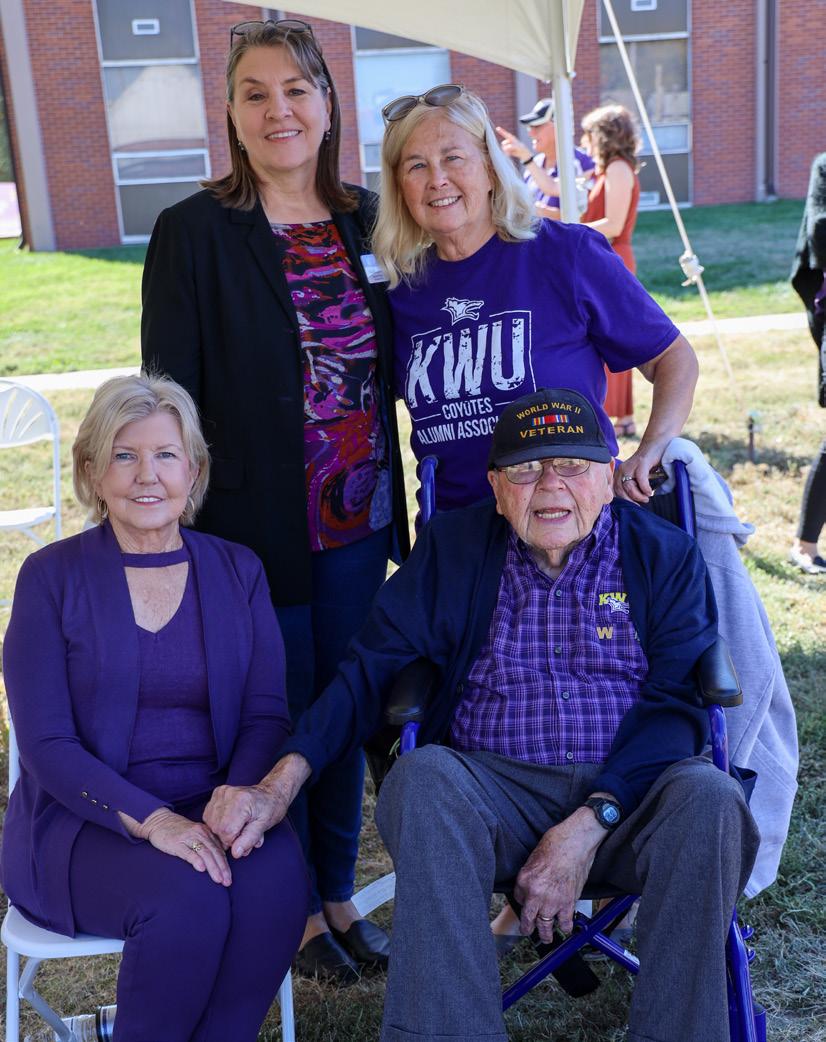
The “two lonely persons up there, not knowing why” were joined in the fall of 1942 by five foot ball players in their living quarters in the base ment of Lockwood Hall, the first administration building that had been replaced by Pioneer Hall, he said.
“The basement was just kind of a junk place,” Nelson said. “Not much down there.”
There was, however, a mouse. The football players were noisy, but they knew how to solve a problem.
“One of them came in and shot the mouse in the room where we were,” Nelson said. “Got rid of the mouse.”
Getting meals was another problem. The only dorm on the campus at that time, Schuyler Hall, was strictly all women, as was Kemble Hall, the cafeteria in Schuyler. Volunteers sometimes would bring them food, but that didn’t always work well, he said. Most male students boarded in town. Grocery stores and restaurants in town were also often an inconvenient distance.
“Everything south of here was all farmland,” Nelson said. “No nothing.”
There wasn’t much between campus and town northward, either. At times, the administration canceled classes because of dust storms arising from the plowed fields, Nelson said.
“They didn’t think it was wise for the students to be out in the dust storm,” he said.
He paid for college with various odd jobs. For one job, the president’s wife hired him to scrub the wood floors, on his hands and knees, in the president’s house. He earned $1 a week, Nelson remembered.
But there were also a lot of fun times, he said, with people playing all kinds of tricks. Some student would take a cow up to the third floor of Lockwood, which was vacant at the time.
“Of course, a cow will go up to the third floor easier than coming down from the third floor,” Nelson said. “We had those kinds of things.”
The first year and a half, he still planned to go back to the farm or work in the agricultural field.
“The war changed everything,” Nelson said.
’49 poses with his
Anita Wiley ’88 (standing, right) and nieces Margie Bieber ’71 (seated) and Michelle Jensen, KWU associate director of student financial planning.
In March 1943, Nelson was drafted into World War II and left to serve in the Army Air Corps. He became a tail gunner in a B-17 and flew 22 missions out of Foggia, Italy.
The school was going to refund his tuition, but he said to apply it to his sister Irene (Renken), who planned to become a war nurse. She graduated just as the war ended.
Nelson came back to Kansas Wesleyan in the fall of 1946, with his older brother Albert.
Al Nelson ’50 taught students and future teachers for 32 years at Kansas Wesleyan. The Albert Nelson Student Success Center is named for him.
There were a lot of fun times going on then, too. One night a group of girls from Schuyler Hall showed up at the house to serenade them. The boys had a big jar of pennies and threw the copper coins at the girls.
On occasion, a large group of boys would make a lot of noise, then rush the cinema — the Vogue or the Fox (now the Stiefel Theatre) — and watch a movie for free.
And there was choir, and choir tours.
“That was something very important for folks,” Nelson said.
The Nelson brothers both sang and joined the college choir. The first tour after the war was to the West. To pay their way, they set up the risers and acted as roadies.
“We always had ‘Beautiful Savior,’ that was always our theme song,” said Nelson, who sang a
few bars in President Matt Thompson’s office a few days before his 99th birthday. “That was something that was always really, really special.”
On choir tours, alumni were always asked to come up and join in the song, he said, and he always did.
He also sang it to his wife, in the nursing home, when he'd call her to say good night.
He met his wife at KWU, of course.
When Nelson came back to KWU in 1946, the school asked him to help welcome incoming freshman at Convocation in Sams Chapel.
Evelyn “Evie” Eisenhauer, of Solomon, nudged her best friend, sitting beside her, and whispered that she was going to marry that young man speaking on stage.
Evie and Harold Nelson were married July 25, 1948, at University United Methodist Church. They were married 71 years, before she died in December 2019.
After the war, Harold changed his career plans from farming to ministry.
Nelson and four of his friends spent their last year of college at Drew University in New Jersey, graduating with a Master of Divinity degree the same day he received his bachelor’s degree from Kansas Wesleyan.
His first appointment was to a church on Staten Island. He was offered good appointments back East, he said, but he and his wife had already decided to come back to Kansas. Evie graduated from Kansas Wesleyan in 1950, the same year as Al Nelson. Al’s future wife, Elizabeth Street, graduated in 1949, with Harold.
Throughout their careers, Nelson served various churches, and Evie taught music and special education from kindergarten to the college level.
In 1978, while he was pastor at Trinity Unit ed Methodist Church, they bought a house in McPherson and lived there off and on for 40 years. In 2018, the Nelsons moved to Manhattan, to be with their daughter, Nita Nelson Wiley ’88.
They remained active and generous with Kansas Wesleyan. Harold served on the Board of Trustees from 1972-1981. In 2010 Harold and Evie set up an endowed scholarship for students going into education or religion.
No one is quite sure of the exact count, but Amber Wiley Klug ’09, Nita’s daughter, counted in 2010 and came up with 80 relatives with connections to KWU — students, parents and grandparents. There are many more, if you include relatives of Elizabeth Street, Albert Nelson’s wife.
Kansas Wesleyan presented Harold with an honorary Doctor of Divinity degree and Albert with a Doctor of Humane Letters degree in 1983.
By Jean Kozubowski
10 CONTACT | Fall 2022
Harold Nelson
daughter
KWU welcomes law enforcement officers to new certificate courses
KWU, in collaboration with the Saline County Sheriff’s Office and the Salina Police Department, launched the Saline County Workforce Development Program this fall. The program offers three certificate programs — Leadership for the Future, Culturally Informed and Trauma Informed — at no cost to the law enforcement officers.
The officers will go through the program together, as a cohort. The courses can be used as a supplement to an existing bachelor’s degree or to help a student work toward a bachelor’s degree.
“As a university, KWU prides itself on provid ing opportunities that make our community bet ter,” said Dr. Matt Thompson, KWU president. “This is true across all of our academic programs, from our MBA to our undergraduate coursework, and this agreement is another example. Our first responders are the backbone of our community. They do tremendous work on our behalf, each and every day. We’re proud to provide this op portunity for them to earn college credit without incurring debt. In addition, national data shows that additional education leads to improved policing.
This certificate will enhance their skills. Being able to help build Salina up in this fashion, as we build KWU up, is a true honor, and we are grateful for the opportunity. We look forward to similar opportunities in the future.”
Two eight-week online courses will be offered each semester. Books, tuition and all fees will be provided free. Only individuals employed by the
sheriff’s office and police department are currently eligible, but partnerships with other counties and municipalities may be explored in the future.
Pictured above is a portion of the first cohort at the program’s orientation in August.
This program is made possible by a grant provided by Executive Order 112456, Saline County and the U.S. Department of the Treasury.
MORTON ’16 TAKES ON INTERIM CHIEF JOB
Sean Morton ’16 was named interim police chief of the Salina Police Department in July. He came late to being a Coyote, but he’s all in now.
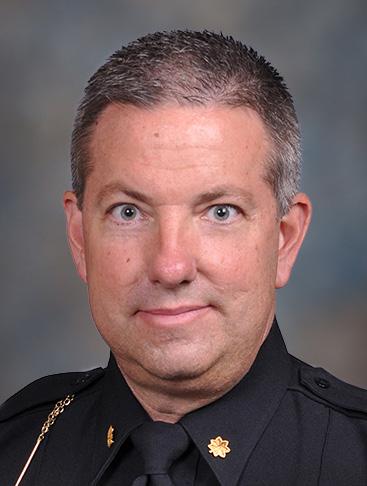
He earned his bachelor’s degree in Criminal Justice in 2016 from Kansas Wesleyan as a nontraditional student.
Morton worked his way up through the ranks of the Salina Police Department, from police officer in 1991 to lieutenant supervising the patrol and training units. He has been a detective in the criminal investigation unit and the drug task force.
In 2014, he was promoted to captain over the Support Division, which includes the emergency communications, records and training units. Later that same year, he was promoted to deputy chief, second in command.
Finishing his bachelor’s degree was a career decision, Morton said.
“I felt that if I ever wanted to have a chance to be considered for the chief of police position, I needed to have a bachelor’s degree,” he said. “I needed to keep my options open. Most chief of
police positions require that the candidate have, at a minimum, a bachelor’s degree. Plus, I also thought that someone who was in the deputy chief’s position should also hold at a minimum of a bachelor’s degree.”
A native of Marysville, Morton came to Salina with an associate degree from Cloud County Community College.
Even with that, Morton had a demanding career and a family to balance with his schoolwork.
Online courses made that possible.
“I think it goes hand-in-hand with classes that Kansas Wesleyan is offering to law enforcement now,” Morton said.
The Saline County Workforce Development Program welcomed its first cohort of students this fall. It's not that different from his own online degree program that he finished while he was working with the police department.
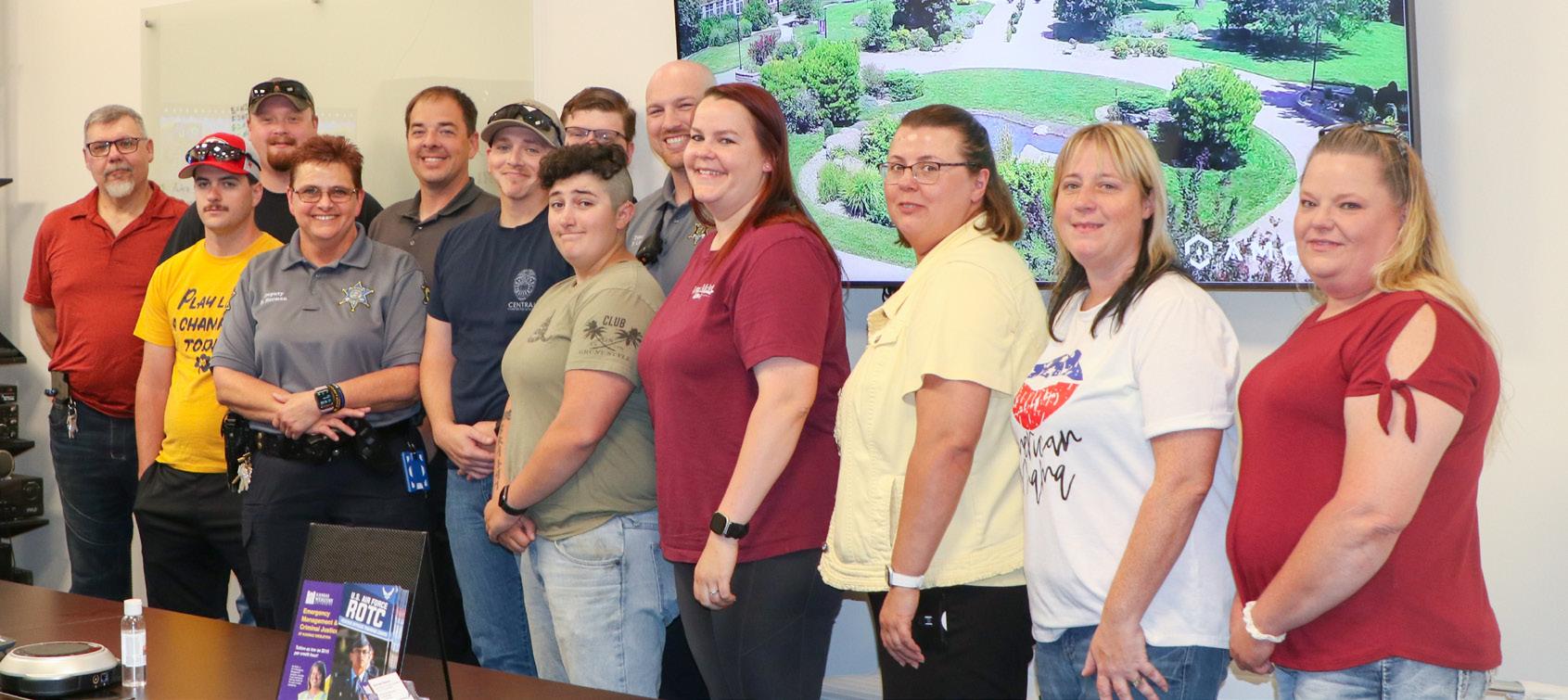
Cohorts go through one of the three online certificate programs together. The certificates count toward earning a bachelor’s degree, if the student chooses.
He also likes that the courses are from a local university, so much so that his son is a current student.
“You can (take online courses) with a lot of colleges, but it’s nice to have that college in your community,” he said. “If you needed to, you could communicate with the instructor, you could come down and have a meeting.”
Kansas Wesleyan has a very good reputation, as well, Morton said.
Nine current department employees have taken courses at Kansas Wesleyan, not all of them police officers. One works in records, two other are in dispatch.
“I feel like we’ve gotten a lot of good employees from Kansas Wesleyan,” he said, “people of good character, something that is very important in our line of work.
Besides graduating and working as deputy chief in 2016, Morton attended the 10-week FBI National Academy course at the FBI training academy in Quantico, Va. Only about 1 percent of all law enforcement officers in the U.S. are chosen to attend this professional course for police administrators.
He is not applying for the chief of police job; he plans to retire next year.
By Jean Kozubowski
Fall 2022 CONTACT 11
Sean Morton
Judge began life of service at KWU
Public service is in Angela Coble ’94’s nature, even in her profession, but she sees it as so much more.
“Of course, we can vote in elections as they come up to hope to shape our community, but really public service is kind of the ultimate exercise in democracy,” Coble said. “By volunteering and actually working in our community every day, that’s how we can really shape our community.”
Public service is also Coble’s profession. Almost a year ago, she was appointed to the 14-judge Kansas Court of Appeals by Gov. Laura Kelly.
“I, of course, vote, but the best way to make sure we live in a place we want to live in is to get out there and do something about it. I feel like I started doing that at Wesleyan, and I’ve kept doing it to date.”
Kansas Wesleyan wasn’t on Angela Chesney’s radar in high school in Stockton. But she had been named Junior Miss Rooks County, and KWU offered scholarships to all county junior misses. So she came to check it out.
“I just fell in love with it,” Coble said. “Coming from such a small town, I was looking for that smaller community feel. Before I graduated high school, I came and tried out for cheerleader here at Wesleyan and made the cheer team. I was offered the Presidential Scholarship, so I had that group,” which met on a weekly basis.
“Between choir and cheer squad and Presidential Scholars meetings, it didn’t take long to get involved,” Coble said.
She lived in Pfeiffer, where she was an RA her sophomore and junior years.
Coble started at Kansas Wesleyan as a freshman psychology major in 1990. But after she took her first criminolo gy class, a requirement for her major, she switched to criminal justice but kept psychology as a minor.
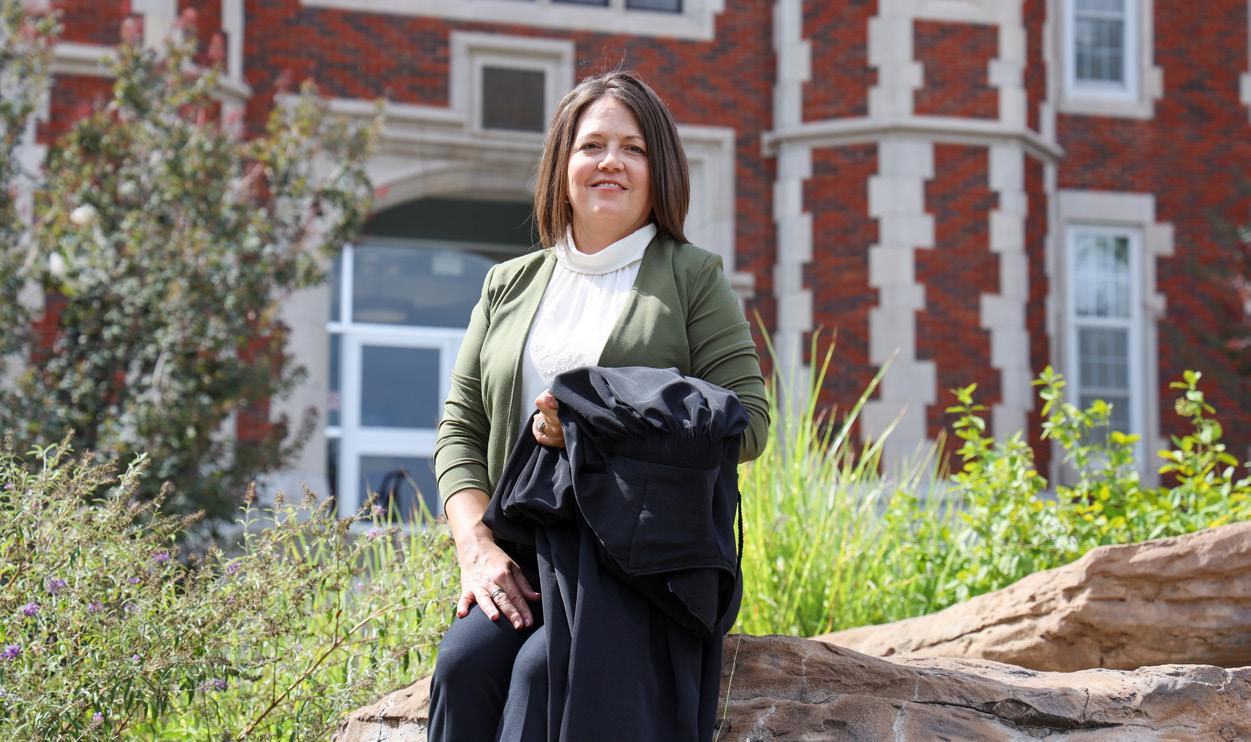
“My advisor was Don Olsen. He was great,” she said.
Then she took a Spanish class from Consuelo Diaz and added a Spanish minor.
“I would never have thought that I would go to college and minor in Spanish. But how could you go into Ms. Diaz’s class and not?” Coble asked. “She was so fantastic. She’s the one who really inspired me to go ahead and seek a minor in Spanish because she was so engaging and supportive.”
The Spanish was useful when she went to Mexico with a Habitat for Humanity group for 10 days.
“We raised money and went to Mexico City,” she said. “I never worked so hard in my life! We stayed with the locals, and they fed us at each of the (three) job sites. It was an eye-opening experience for me, never having been outside Kansas much, to see how other people lived, different cultures.”
Choir tours also exposed her to parts of the country she’d never seen.
“I was pretty shy, but having to put yourself out there, staying in host families’ homes, having to go into someone else’s house and make conversation — that added to the whole college experience.”
Also part of the college experience was being homecoming queen in the fall of 1993.
Her studies didn’t suffer as part of the “college experience,” which also included an internship and part-time jobs during her four years.
“I got the student Hall of Fame award at graduation and the academic award that year,” Coble
said. “I still have my Kansas Honor Society pin.”
Less typical was that she married between her junior and senior years and they moved to North Hall. She had her first son four days before graduating.
While her then-husband went to medical school, Coble found a job in the clerk’s office of the federal court in Kansas City.
“I got to see all the cases that came in and follow the progression of the cases and read legal documents,” Coble said.
One of her supervisors, a lawyer, told her to read one of the documents and if she found it interesting, she should consider law school.
“That really cemented my thought that I would some day go to law school,” Coble said, and she applied to Washburn University School of Law.
Her first year, she commuted from Salina. She wanted to stay involved with her four children.
“I thought, it’s only three years,” Coble said. “I can do anything for only three years. Sleep was totally overrated at that point.”
She moved to Topeka for her last two years, after she was divorced.
In 2009, she accepted a job at Kennedy, Berkley, Yarnevich and Williamson law firm in Salina as a civil litigator, but she was asked to work in family law and other areas, as well.
“… the best way to make sure we live in a place we want to live in is to get out there and do something about it. I feel like I started that at Wesleyan, and I've kept doing it to date.”
— Judge Angela Coble ’94
“The nice thing about that practice was it took me into a lot of county courts in surrounding counties,” she said.
From there, she accepted a job as a clerk for a federal judge in Wichita, then for that judge’s replacement.
“I always knew I’d like to do the law clerk route because I knew I’d like the research and writing of the law, more than appearing in court,” Coble said. “I like digging into the law, researching, then writing a brief.”
Law clerks are research attorneys, chamber counsel, law clerk — “It all means the same thing,” Coble said. “Basically you’re the judge’s attorney, doing research for her, advising her on how she should rule on specific disputes, then drafting her opinions.”
By the time she started applying for judgeships, she’d written more than 300 briefs.
In true Coble fashion, she’s also kept up with her outside activities.
She has been on the boards of the Salina Healthcare Foundation and Airport Authority. Other leadership positions have been with the Salina Emergency Aid-Food Bank, Lead ership Salina, Four Rivers Support Committee, school and parentteacher organizations, and professional bar associations.
“It's just my nature that I enjoy being involved and want to be part of the community. I think Wesleyan really reinforced and helped to grow that,” she said.
By Jean Kozubowski
12 CONTACT | Fall 2022
Angela Coble ’94 was appointed a state appellate judge early in 2022. She says her career in public service started and was nurtured at Kansas Wesleyan.
Salina offers Kansas Wesleyan and its students countless internship and clinical opportunities, an art scene unmatched in the region and greatly varying restaurants and shopping. but do you know what kwu gives back?
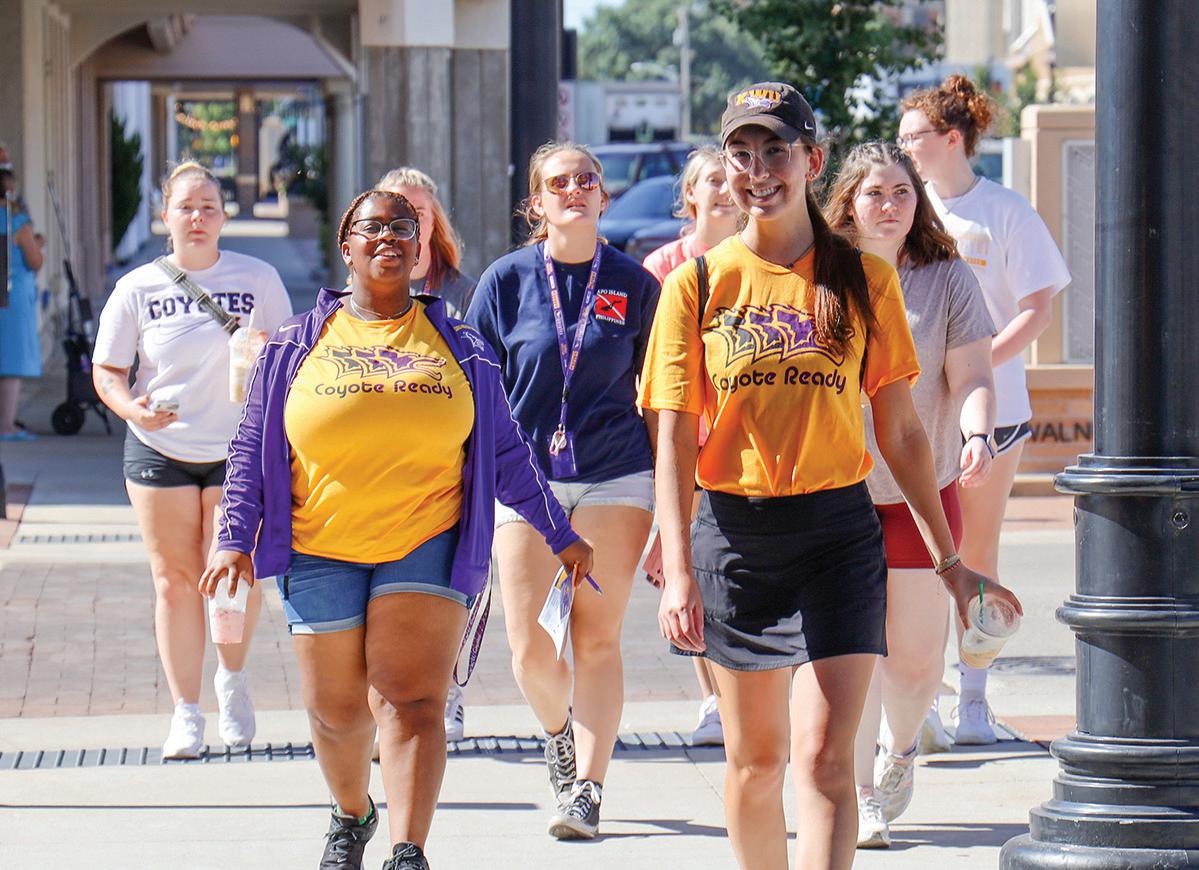
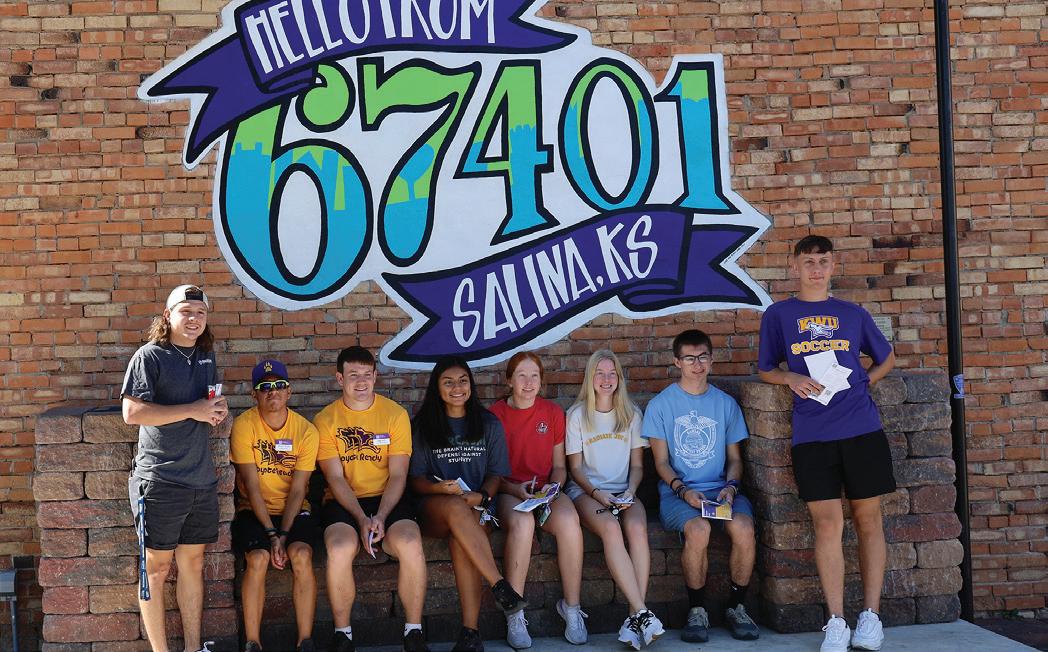
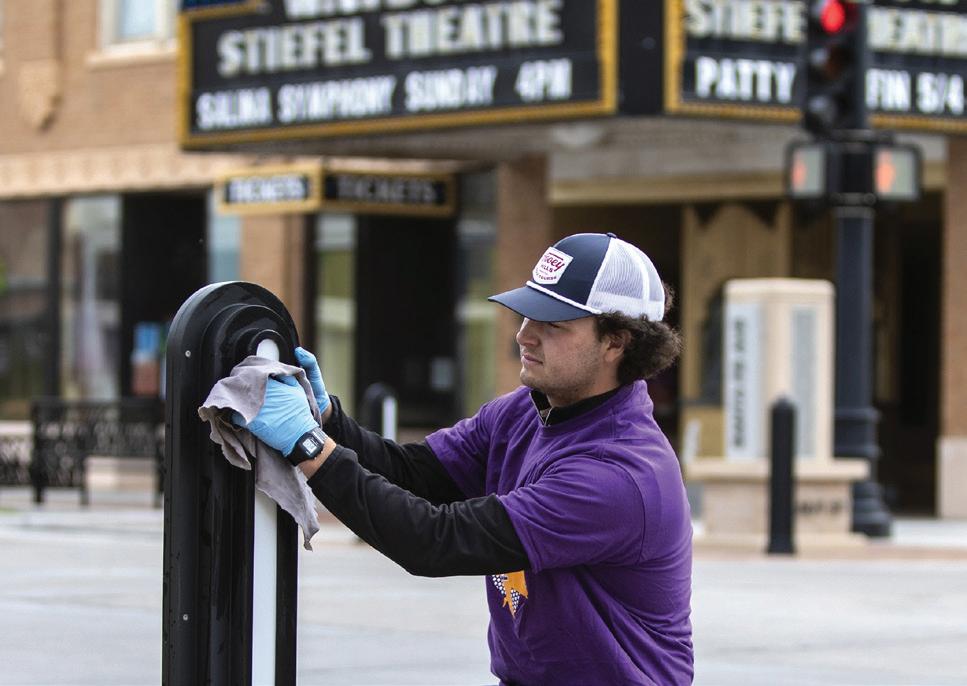
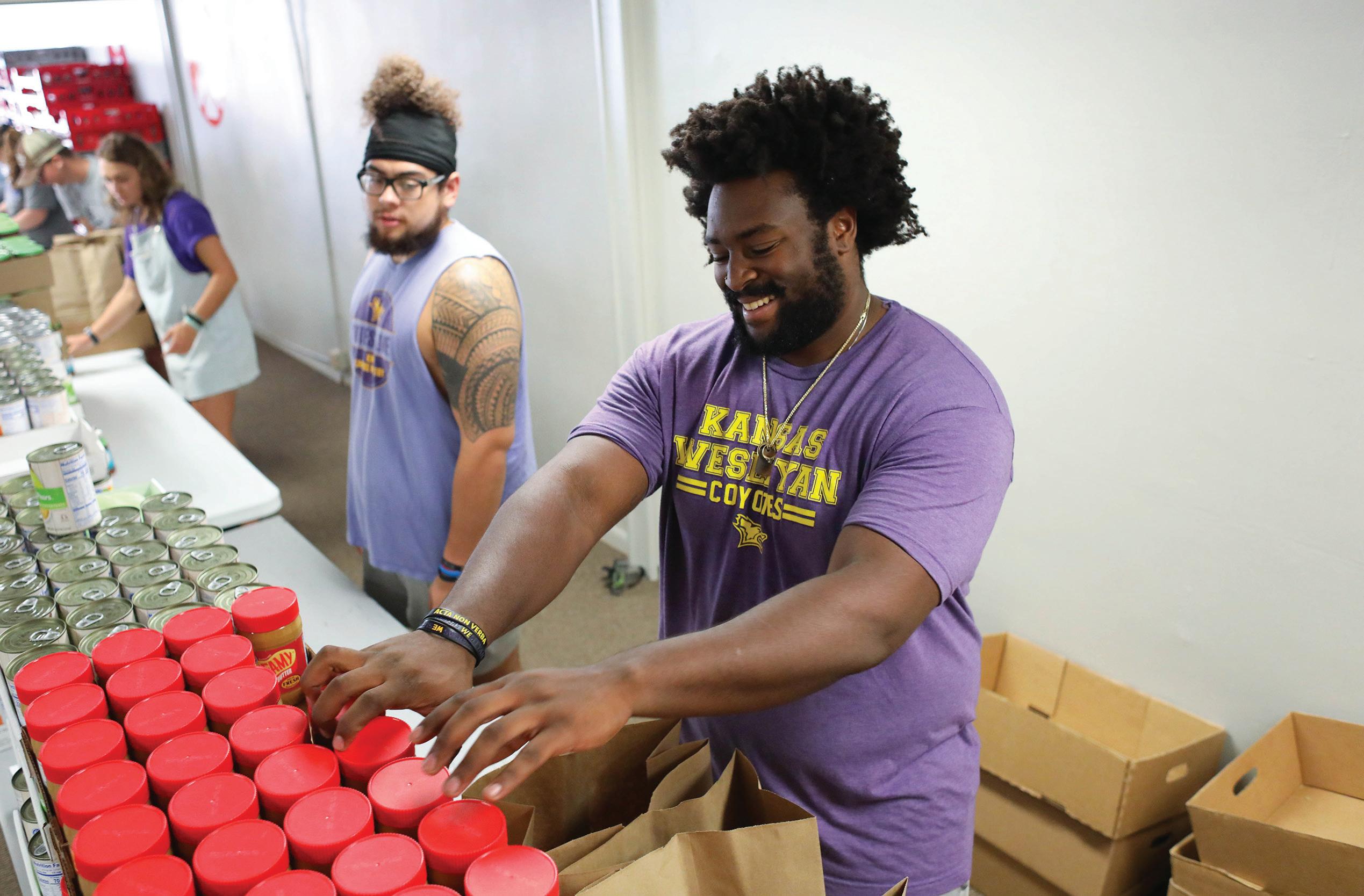
KWU supports numerous community events and initiatives, including the Smoky Hill River Festival, the Love, Chloe Foundation, the Rolling Hills Zoo and many more!
KWU scholarships are available to employees of Salina Regional Health Center, and the university partners with the county Sheriff’s Office and Police Department to provide certificate program opportunities.
The university invests in the community through facilities, like the Salina Tennis Alliance, and through scholarship opportunities, such as the RISE scholarship for teacher education.
$46MILLION annual economic impact on the region!
Fall 2022 CONTACT 13
Alumnae move to principal's offices in Salina-area schools
Experiences lead Ebel ’02 to administration
With her high school diploma in hand, Jennifer Ebel ’02 looked toward a future that would enable her to help children. Though that idea would manifest itself in multiple ways during her early adulthood, it eventually led her to her current position as Schilling Elementary School’s newest principal.
At first, Ebel thought she might become a social worker or teach German. When she realized neither option was the perfect fit, she funneled her passion for helping children and teaching into her elementary education studies.
Some of her inspiration came from her own grade-school experiences at the now-closed Lowell Elementary School in Salina.
“Those teachers wrapped their arms around us and they loved us,” she said. “So, I had a great experience there.”
Ebel spent much of her 20-year-long teaching career as a literacy coach but was most recently the lead teacher at Oakdale Elementary School in Salina. Becoming a principal was not in her original plan.
“I joined a cohort to work on my master’s degree,” she said. "I realized I enjoyed working with adult learners, so it was the best of both worlds to
move into administration.”
She looks forward to continuing the strong sense of community within Schilling Elementary.
“Schilling has this culture of family," she said. “Since I joined the staff, they have embraced me. We give each other grace and dignity when we mess up. It’s an extremely caring environment. I hope to continue that.”
This sense of community isn’t limited to the staff of Schilling Elementary. She noted the use of “SOAR” slips at Schilling, which teachers fill out
to celebrate the achievements of their students. The slips then go to Ebel.
“I love getting to celebrate with the kids,” she said. “For one student, you might celebrate that they’re completing an assignment. For another, it might be that they finished a 400-page book. It’s totally based on the kid. That’s what I enjoy, the individual celebrations to help these little people grow.”
For Ebel, her own growth and success could not have been achieved without those who stood beside her as she navigated her education and chose a career path, she said.
“I got here because of all the people in my life,” she said. “If my parents hadn’t supported me in all my craziness, then I wouldn’t have gotten here. Wesleyan did the same thing. Some of my professors would come out with other education students, and they would check up on me. It’s the people at USD 305 that helped get me here, too.
“None of us can do anything alone, and I had my family. I had my KWU family, I had my USD 305 family. You have to have the right people in your corner, and I was blessed to have that every step of my way.”
By Skylar Nelson
Galvan ’06 planned for principal's position
“From the time I was a little girl, all I wanted to do was be a teacher. I can’t remember ever wanting to do anything else,” said Heather Galvan ’06, who began her first year as Meadowlark Ridge Elementary’s principal in August.
Galvan, a Salina native and graduate from Salina Central High School, has a career in education that spans 15 years and multiple positions, including time spent in special education, student counseling and coordinating curriculum for students with special needs.
She knew from the start of her career, however, that she wanted to achieve an administrative position and received a master’s degree in educational administration from Fort Hays State University.
“Being a special education teacher and school psychologist has helped me with understanding behaviors and how to properly deal with them,” she said. "I realized I had the ability to help more than just the students in my classroom. It was
important to me to help teachers understand how to put certain interventions into place.
“I was especially interested in Meadowlark Ridge because of the knowledge and experience of the teachers,” she said. “The teachers are very good at what they do. Building relationships and having an open-door policy is something that is crucial. I try to be in classrooms daily and visible for all teachers and students.”
Galvan’s broad understanding of education began early on during her time at Kansas Wesleyan
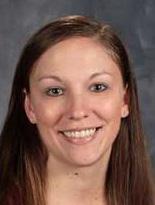
University. Every semester leading up to her student teaching, she was able to observe local classrooms.
“Nothing prepares you for being a teacher like actually being in the classroom,” she said. “What may work for one student doesn’t always work for another. You have to be flexible and willing to adapt at any moment. Each student deserves a chance to work at their own pace and celebrate the small successes.”
At Meadowlark Ridge, she looks forward to applying this knowledge to its special education program, where she can work with the education team to help students who struggle with trauma and emotional regulation.
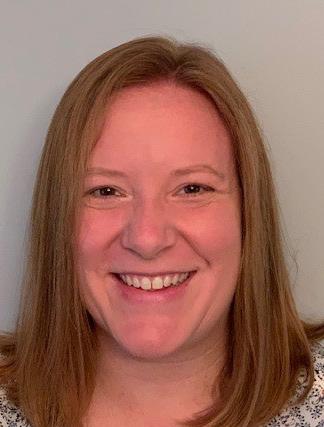
“There is no greater feeling than being able to work with students and help them overcome obstacles, whether those are academic or social and emotional skills.”
By Skylar Nelson
14 CONTACT | Fall 2022
“I realized I enjoyed working with adults, so it was the best of both worlds to move into administration.”
— Jennifer Ebel ’02
“Nothing prepares you for being a teacher like actually being in the classroom.”
KWU senior volunteers medical aid in Africa
For Kansas Wesleyan University senior Meredith Angelotti, the chance viewing of a TikTok video led to a life-changing volunteer experience.
In July, Angelotti spent two weeks working with African Impact, a nonprofit she learned about after seeing a creator on TikTok discuss her experience with the group.
As a biomedical chemistry major planning to become a physician assistant, Angelotti chose to sign on for the community and global health project taking place in Livingstone, Zambia.
She and her group focused primarily on homebased care. Each day, care coordinators took them to communities, and they provided basic check-ups, over-the-counter pain medications, wound care and clinic referrals to residents. Wound care was critical in these communities.
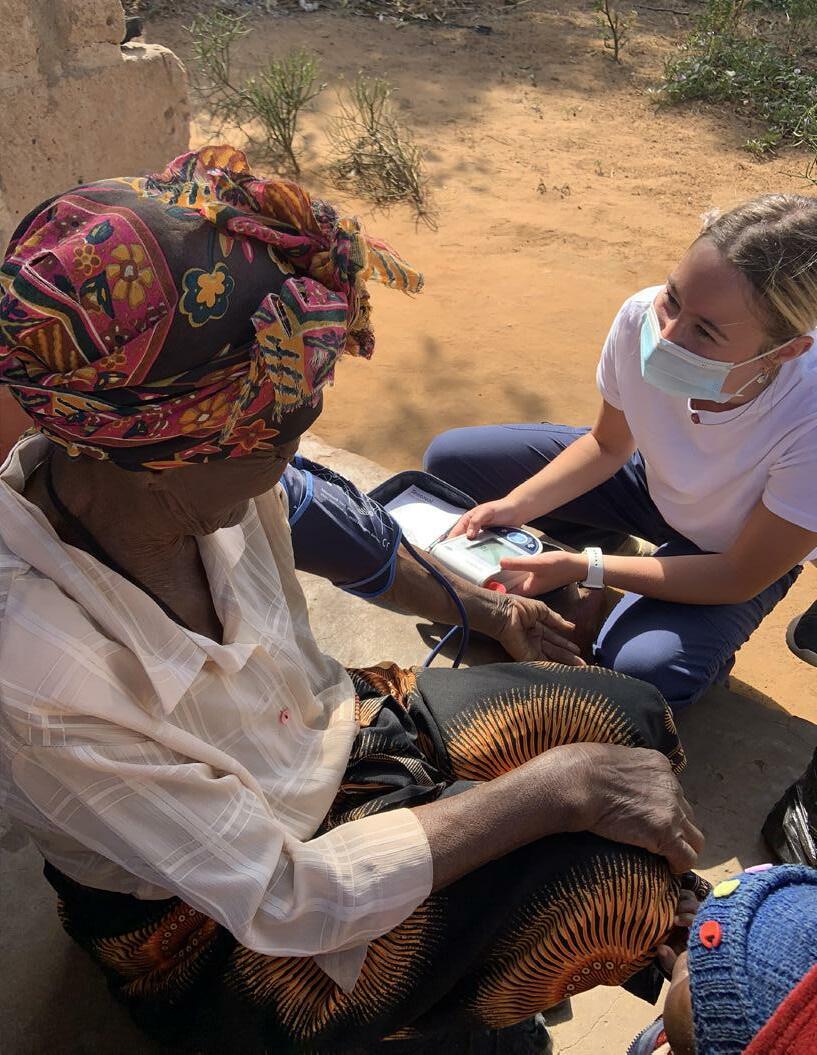
“A lot of people have wounds that are so bad that they’re recommended for amputation, but they won’t get their leg amputated because then they can’t work,” Angelotti said.
Many of the wounds began as small cuts that got infected. Without antibiotics readily available in local clinics, they worsened.
"The wound grows and grows and grows, and then I can see the bone in their foot,” she said. “So, we teach them how to clean it, how to dress it. Then we give them enough supplies for them to change their own wound until we come back.”
Part of educating those in Livingstone included teaching health-based courses. Angelotti taught classes about HIV and a menstrual health course for young women in the community.
“My cultural competence increased drastically,” she said. “I learned a lot about not discrediting
something just because I’m not familiar with it. People have different sets of cultural ideals, and just because they’re different from mine doesn’t mean they’re wrong.”
For example, this cultural awareness clued Angelotti in on how diet, climate, water access and other factors can alter what one considers a healthy baseline for medical readings.
"Blood glucose and blood pressure ranges are a lot different there,” she said. “They’re a lot higher
because they eat more sodium, and they don’t drink enough water. I learned so much that I can apply to medicine in the United States to provide better patient care.”
Her experiences in Zambia have also changed how she goes about her daily life back in the U.S.
"[In Livingstone], they don’t have a wastemanagement system, so they burn all their trash,” she said. “They’re very cautious about what they use and how much they use. Here, we just throw stuff away without even thinking about where it goes after.
“I’m so much more aware. Going to the grocery store, I don’t use plastic anymore. I bring my own bags. I used to do it before when I remembered, but now I’m, like, ‘I need to do this,’ because we take so much for granted.”
To fund her trip, Angelotti used GoFundMe and received additional help from the KWU Women’s Auxiliary group to supplement her two-week stint in Zambia.
Though she was excited to go, Angelotti was also intimidated by this new adventure.
“Traveling across the world alone was a big step for me,” Angelotti said. “Everyone told me, ‘You’re going to have the best time of your life; you’re going to leave a piece of your heart there,' and I thought, ‘Oh yeah, whatever,’ and then I got there, and the third day I’m, like, ‘My whole heart is going to be left here.’
“I'm grateful that I went into it with an open mind and didn’t have set precursors about what I was going to see,” she said. “I’ve made friends that I know are going to be my friends for life.”
By Skylar Nelson
Mayginnes ’09 set for next step in career
Growing up in Salina, Krystle (Griem) Mayginnes ’09 regularly drove by the Kansas Wesleyan campus and was drawn to the university by what she heard about it from her friends and others in town.
“I had the most excellent professors in all of my classes, but especially in the education department,” Mayginnes said. “Their classes were very informative and they prepared me very well for my teaching job. They inspired my love of education.”
Fast forward to today and Mayginnes has taken what she learned at KWU into her new position as the assistant principal at Winfield Scott Elementary School in Fort Scott, Kan.
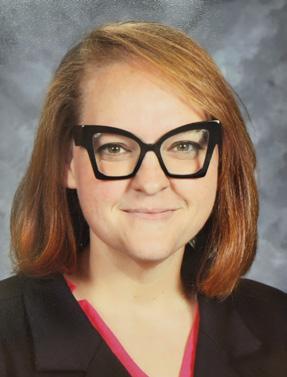
“I used to see a lot of my professors around Salina, and they always
remembered me,” Mayginnes said.
“Earlier in my career I used to email back and forth with them and ask them questions and get answers. I think it was great to have that relationship and someone you could seek advice from later on, too.”
more than ready for the next step in her career arc when the opportunity arose in Fort Scott.
Krystle Mayginnes
Graduating in December 2009, Mayginnes taught English in three high schools and one middle school before earning her master’s in Educational Leadership from Emporia State in December 2020. Coupled with her degree from KWU, she was
“It’s kind of a different role because I get to see the whole school instead of just one classroom,” Mayginnes said of the shift into an administrative role. “I always loved working with kids. You can see that growth that happens from the beginning of the school year to the end. I always thought that was something very impactful. All those little things that you do make an impact and affect the future for a lot of kids.”
Though the new role has taken her out of the classroom on a daily basis, the benefit she sees is in her ability to affect more students and teachers.
“I’m not teaching, per se, every
day, but I’m in and out of classes all the time, working with teachers and students in the classroom,” Mayginnes said. “I get to see a lot more students (as assistant principal). When I was in my classroom I might have 100 kids that I got to know really well, but now I have 400 kids that I know just a little less about. But there is still that relationship with them.”
Though she may be out of the classrooms on the KWU campus, her connection to it has never ended.
“Most of my family still lives in Salina so I am around it quite a bit,” she said. “I like to see what’s going on and sometimes go to a football or soccer game.”
By Dan Froehlich
Fall 2022 CONTACT 15
While volunteering in Livingstone, Zambia, KWU senior Meredith Angelotti takes a community member’s blood pressure.
Endowed scholarships
are an important part of the KWU experience, as they lessen the financial burden on countless Coyotes each year. The university’s endowed scholarship count has grown to 225 this year, but we need your help to continue to offer this many great opportunities. Learn more by contacting a member of the Advancement staff directly, or by emailing michelle@kwu.edu.
KWU continues to approach the completion of the Power of AND
, the largest comprehensive campaign in school history! The university received a challenge grant from the Mabee Foundation in October that helped it near completion of its Music campaign as well.
16 CONTACT | Fall 2022 $25.3 million
$3.8 million
and KWU’s Power of AND Campaign
Pledges and cash (in hand) raised
Raised toward $4.5 million Music campaign Growth of Endowed Scholarships
.
campaign
Number of endowed scholarships offered Fall 2018 Fall 2019 Fall 2020 Fall 2021 186 189 192 200 $ $ $ $ 225 Fall 2022 $ $9.3M Phase 2 $.7M Left $16M Phase 1 It’s A gre At tI me to be A Coyote! go AL $26 Million
KWU names six to boards
NEW BOARD OF TRUSTEES MEMBERS
Kansas Wesleyan Universi ty announced four new addi tions to its Board of Trustees in early August.
The newest trustees are Dennis Berndt ’92, Salina; Dr. Pamela Braxton Davis, Salina; Dr. Karen Franzen Johnson ’68, Lincoln, Calif.; and Rev. Karen Rice Ratzlaff, Hutchinson, Kan. Capsules on each appear below.
At the final meeting for 2021-22, the board recognized the late Rev. Nathan Stanton ’91 in a presentation to his widow, Brenda Stanton, and son Isaac Stanton. Stanton passed away in March after serving seven years on the board.
Dennis Berndt ’92
Berndt is the ownermanager of B&K Bail Bonds in Salina. He has a long fam ily connection to KWU, as he is the grandson of former trustee Walker Briney. Both of his parents were alumni, as were an aunt, uncle and several other family members.
Berndt holds his bachelor’s degree in Accounting from KWU. He just completed nine years on the KWU Foundation Board, where he served as treasurer, chaired
the Audit Committee, and served on the Finance and Investment Committee.
Pamela Braxton Davis, M.D.
Davis’ specialty is diagnos tic radiology, and she is affiliated with the Salina Regional Health Center and several regional medical facilities. She continues a family tradition of service to the KWU board, following her brother Dr. Mace Braxton Jr., who served as trustee from 1999 until his death in 2005.
Davis brings with her a deep commitment to serve her community.
Davis received her medical degree from Howard Univer sity College of Medicine.
Karen Franzen Johnson ’68, Ed.D
Johnson is a retired education consultant and former school principal. The Franzen family has a deep KWU legacy. Its Coyote lineage dates back 60 years, and seven members of her family are KWU alumni. The Franzen family established a scholarship at KWU in honor of their mother, Ruby, to provide other first-generation college students the opportunity that was provided to them.
Johnson earned a bachelor’s degree in History at KWU, her master’s degree from Syracuse University and her doctorate in Education Policy and Administration from
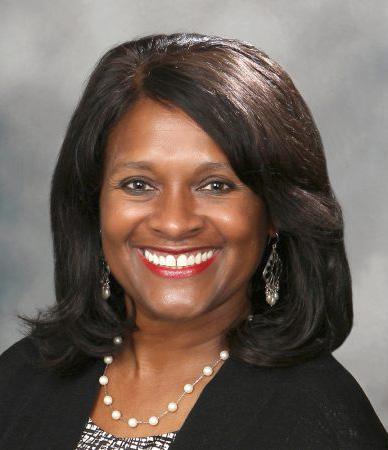
NEW FOUNDATION BOARD MEMBERS
The two newest members of the Kansas Wesleyan University Foundation board are Jandrea Blumanhourst ’89 and Jenell Hulse. Their appointments took effect July 1.
Hulse, construction division manager and commercial loan officer at Bank VI, hails from nearby Lindsborg. A 2018 graduate of Kansas State Univer sity, she is active in both Salina and Lindsborg. Hulse is co-chair of Svensk Hyllningsfest,
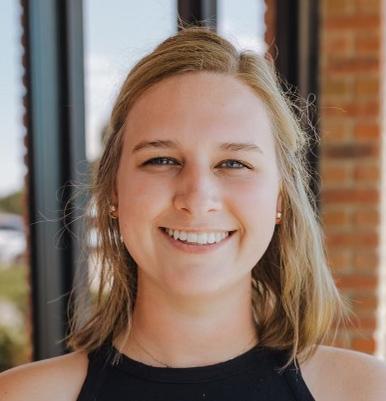

president of the American Legion Auxiliary and former president of the Salina Noon Rotary Club. Both of Hulse’s parents attended KWU. Blumanhourst, who lives in Wichita, brings 33 years of accounting experience to the board. She graduated from KWU in 1989 with a degree in Accounting and earned a master’s in Professional Accountancy from Wichita State. She has served on several
Education
the University of Southern California.
Rev. Karen Rice Ratzlaff
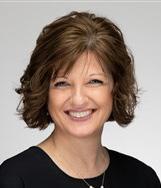
Following a career path into various forms of ministry extending more than 25 years, Rice Ratzlaff was installed as the district superintendent for Salina and Hutchinson for the United Methodist Church’s Great Plains Confer ence in 2021. Her leadership and ministry will continue the rich connection KWU has with the UMC.
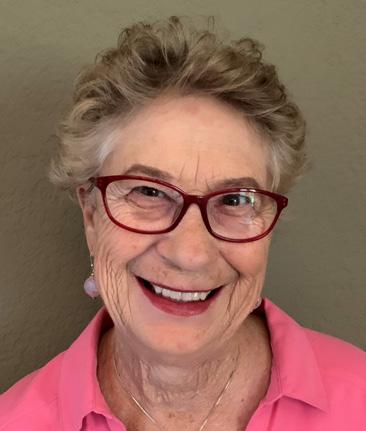
Rice Ratzlaff earned a bachelor’s degree from Bethel College and a master’s degree from Saint Paul School of Theology. Her experience in working with under-served populations and both large
and small churches, demon strates her passion for contributing to her community and church.
The board’s officers are led by chair Barry Weis ’10, a local resident and director of sales and support at Blue Beacon Truck Wash. Jeffrey H. Bieber ’71, Castle Rock, Colo., is the immediate past chair, while Marilyn Foster Kirk ’68, Evanston, Ill., is the board’s vice chair. Emily-May Richards, Peoria, Ariz.. is the treasurer and Ken Ebert, Salina, is the secretary. Richards and Ebert are past recipients of the Alumni by Choice distinction from the university.
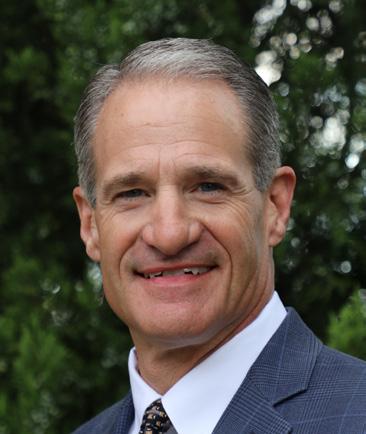
boards, most recently the Wichita Chamber Chorale. The KWU Foundation’s Board of Directors is:
Chair: Bob Meyer ’73
Vice Chair: Gus Applequist ’14
Treasurer: Tom Wilbur
Secretary: Cathy Doubrava Mike Baumberger ’96
Jandrea Blumanhourst ’89 Annie Boswell
David Branda ’76
Jenell Hulse Steve Scofield ’65
Jandrea Blumanhourst ’89
Foundation Board
MBA, Professional Accountancy Wichita, Kansas
Jenell Hulse
Foundation Board Commercial loan officer Bank VI Lindsborg, Kansas
Fall 2022 CONTACT 17
Dennis Berndt ’92 Trustee Owner/manager B&K Bail Bonds
Pamela Braxton Davis Trustee Diagnostic radiologist
Karen Franzen Johnson ’68 Trustee
consultant, retired
Rev. Karen Rice Ratzlaff Trustee District Superintendent UMC Great Plans Conference
Tennis coach has winning year
Numerous groups name Molino Coach of the Year; team surprises with wins
No one expected much from the Kansas Wesleyan men’s tennis team last spring, and with good reason.
The Coyotes lost all eight of their Kansas Conference matches and were 2-11 overall in 2020. Further, fourth-year coach Josh Molino had decided to build a roster dominated by freshmen.
“We had a lot of question marks,” he said.
While others saw continued setbacks and prob lems, Molino saw hope and opportunity.
“We brought in a fantastic class of good people,” he said. “The culture was there; the talent was there. We really worked through some of those freshmen issues, and they bought in for the most part.”
KWU’s six-man lineup included five freshmen, newbies to the college game and life. There were growing pains but there was growth – Molino’s primary objective.
“We trusted the process all the way through on building them physically, building their mental games and improving their tennis IQ,” he said. “We played a tough schedule; we got some good nonconference matches and we just continued to grow.”
After starting the season 1-5, the Coyotes reversed the trend and won eight of their last 11. They qualified for the KCAC Tournament and defeated Ottawa before losing to nationally ranked Southwestern in a hotly contested semifinal match.
“We continued to get better each practice,” Molino said. “Getting the freshmen to buy into that was difficult in the beginning, but as soon as they realized that was part of their development then the success started to follow.”
KWU finished 9-8, 7-2 in the conference. Molino was named coach of the year by three organizations — the KCAC, ITA (Intercollegiate Tennis Association)/NAIA Central Region and USPTA (United States Professional Tennis Association) Missouri Valley.
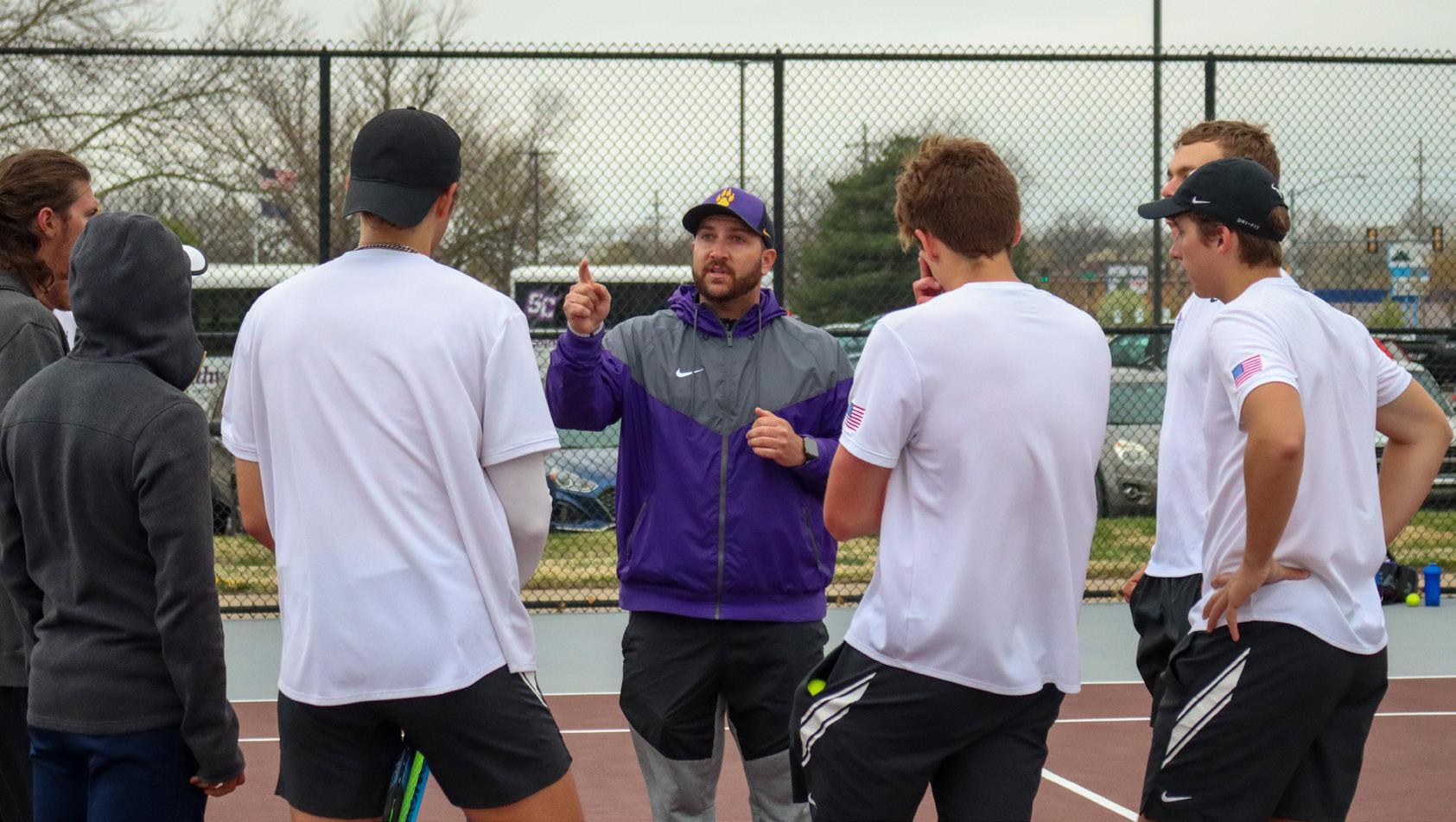
He also was chosen national team coach by the USTA (United States Tennis Association) Missouri Valley, serves as NAIA tennis vice president and is chairman of three groups — the ITA/NAIA National Operating Committee, NAIA National Awards Committee and KCAC tennis.
“The accolades are nice and fantastic — doesn’t hurt to have them — but it’s been a direct result of the process here at Wesleyan,” he said. “I can’t do it without the players and my other coaches and my administrators.”
MOLINO’S HONORS:
• KCAC Men’s Tennis Coach of the Year
• ITA (Intercollegiate Tennis Associa tion) Central Regional Coach of the Year
• USPTA (US Professional Tennis Association) Missouri Valley (Regional) Coach of the Year
• Serves as chair of the KCAC Tennis Coaches Committee, VP of the NAIA Tennis Executive Committee, and chair of the ITA’s NAIA Operating Committee.
• Selected to participate in the 202223 ITA/USTA Coaches Mentorship Program
Expectations are much higher for 2023. The Coyotes are older, experienced and won’t surprise anyone. The nonconference schedule is intentionally challenging, highlighted by play in the inaugural ITA/NAIA Men’s Indoor Championships on Feb. 3-5 at Overland Park Racquet Club in Overland Park. KWU will serve as the host institution for the next three years.
The Coyotes will compete this season along with the top seven teams from the 2022 Men’s Tennis Coaches Postseason Top 25 Poll.
“We actually had been talking about it in 2019 but COVID derailed those talks,” Molino said. “So, we circled back to it and put a great proposal together. We’re super excited for February.”
The benefits are numerous, most notably for
recruiting.
“When prospective athletes are looking at schools, they want to know what you do, how you participate and how the university backs you,” Molino said. “We feel like we’re included in the top 10.”
KWU has played its home matches at Salina Central High School in recent years but will move to a state-of-the-art facility that’s nearing completion across the street from Tony’s Pizza Events Center in Kenwood Park. The unnamed 12-court venue is scheduled to open in November.
“This will help build tennis in Salina in every way,” Molino said. “We’ll be able to host regional tournaments, national tournaments and, hopefully, some prize-money pro tournaments.
“As far as Wesleyan goes, it gives us a premier feel to what we’re already doing for national indoors and the networking the university is doing. We’re really proud and are going to be there all the time representing the city of Salina.”
The ever-busy Molino also serves as director of tennis at Salina Country Club, the locale for Coyote practice sessions.
“Jason Ingermanson (president and CEO of JRI Hospitality, which operates the Country Club) has been a great mentor, a great person to the city of Salina, a great mentor to me,” he said. “We’re really thankful for that partnership.”
Molino believes KWU’s tennis fortunes are rapidly ascending.
“We’re just really excited for the future,” he said. “We’re as healthy as any program in the country, regardless of division, and we feel like we’ve got great people in the program.”
By Bob Davidson
18 CONTACT | Fall 2022
Josh Molino coaches the men's tennis team. Not only did the tennis team have a great year, but Molino garnered several honors in the process.
Senior experiences life in forensic science lab
Spending the summer testing various bodily fluids for foreign substances would not be most people’s idea of an ideal internship. For Cortney Hanna, however, it fit right into her plans.
The KWU Biomedical Chemistry major spent eight weeks at the KBI toxicology lab in Topeka testing blood, urine and vitreous humor, mostly for drugs.
“It’s a good mix of consistency and surprises,” she said. “You’re doing the same processes every day, but it’s a different case, a different matrix, blood or urine. You never know what you’re going to find. It’s not too monotonous, but it’s not just like all over the place.”
The $30,000 gas chromatography-mass spectrometry machine she ran most blood samples on “was amazing to work with,” Hanna said. She used the GCMS almost every day, under supervision, but also worked with a liquid chromatography-mass spectrometry machine.
It was a busy summer, 20-25 hours a week, 180 hours over the eight weeks, Hanna said. Besides doing the testing and gaining authorization, each of the interns had a research project.
“My project was working to determine the level of detection on the GCMS for the top 50 percent of controlled drugs of 2021,” Hanna said. “I was trying to prove how sensitive their instruments are, to prove that yes, our results are what they say they are.”
She was able to prove the machines can detect as little as 1 percent of a drug in a person’s blood.
The top drugs included some opioids, depressants and anti-depressants. Results detecting meth and crack cocaine laced with fentanyl also came in, she said.
She has a better understanding of the entire forensic science process.
“I got to watch toxicologists testify in court,” Hanna said. “You get to see a case from beginning to end.”
Competition was stiff for the internship. At least 20 others applied for the unpaid internship. Hanna worked in the toxicology lab, three others worked in firearms, digital evidence, and biology DNA amplification and sexual assault.
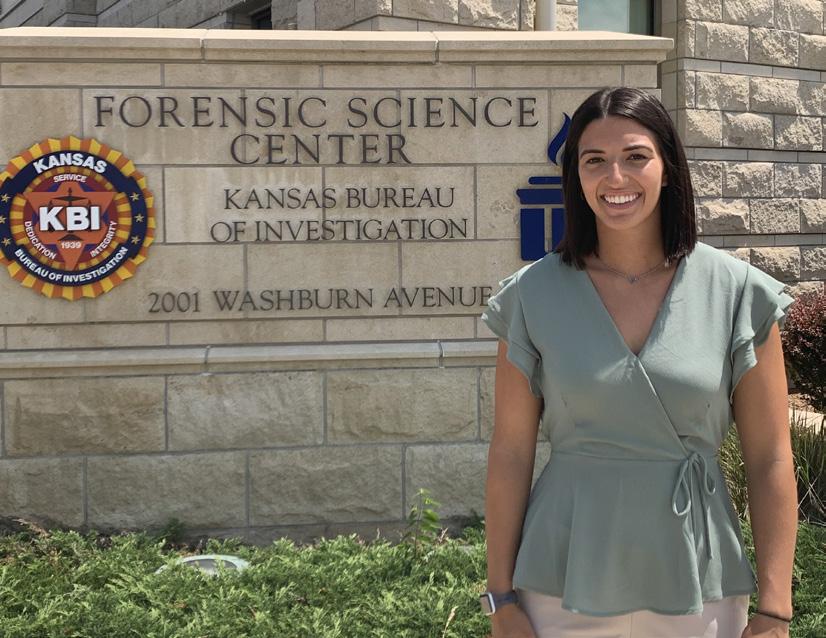
Hanna, from Lawrence, was able to live at home.
Applicants were screened as strictly as if they had applied for a job as an agent.
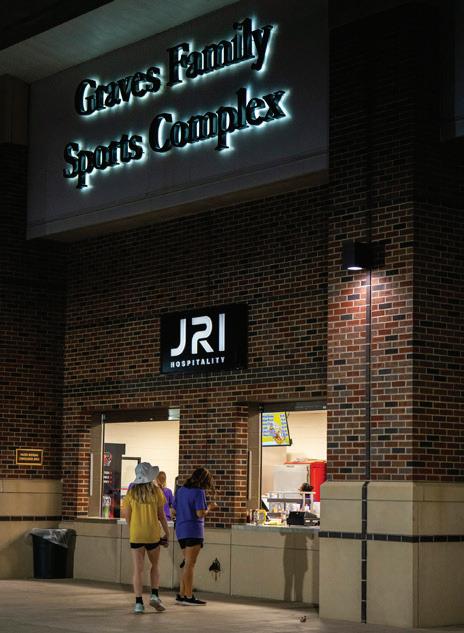
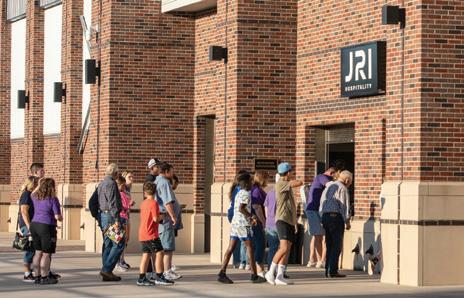
“The background investigator talked to my volleyball coach, roommate, parents, former employers …” Hanna said.

Hanna thinks her Kansas Wesleyan education gave her an edge.
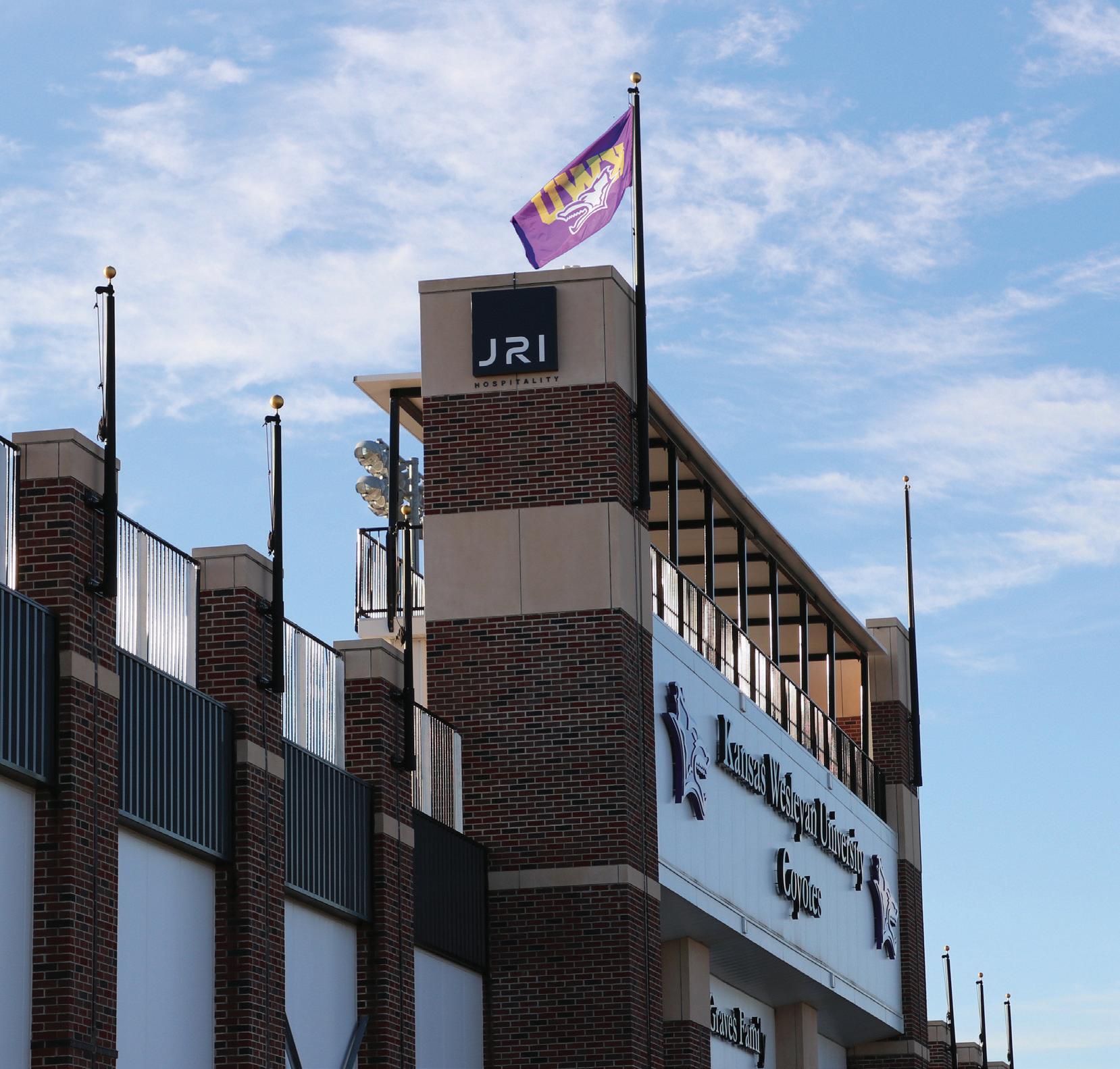
“I think they were really impressed with me knowing some about mass spectroscopy already, MRI already, she said. "They were really impressed I was proficient in micropipetting before I got there. It was just nice they didn’t have to take time to train me.”
Hanna is graduating early, in December, and planning to go on to graduate school in Chemistry or Forensic Science next year.
Many of her fellow Biomedical Chemistry majors hope to go to med school, but Hanna knew that wasn’t for her.
“I always wanted to help people, the same as doctors, but I just can’t do surgery, can’t stick people with needles. That’s just not my cup of tea,” she said.
Hanna realized that it was her lab classes she enjoyed.
“That’s my favorite part of the day, doing handson stuff,” she said. “I would say, if you don’t know if you want to go to med school, do something where you’re in the lab. It will open up doors. You don’t have to go to med school to be successful in health science and chemistry. There are other options.”
By Jean Kozubowski
Fall 2022 CONTACT 19
JRI Hospitality and KWU announced a 10-year naming rights agreement on Sept. 3! The university’s football, track and soccer stadium is now known as JRI Stadium at Graves Family Sports Complex.
Cortney Hanna had a summer internship working in the forensic lab at the KBI.
Refer a student TODAY!
Referring a student who attends KWU for four years is the equivalent of a $60,000 gift to the institution.
college is tough; JD Koons is here to help
As the director of the Albert Nelson Student Success Center, Joseph “J.D.” Koons plays an important role in the development, implementation and execution of the Student Success coaching program, which helps firstyear students transition from high school to college.
“Life doesn’t start after you graduate, it starts now,” he said. “Building those habits now, making connections to your career and future now as a new student is vitally important.”
Koons began his professional career at the Flint Hills Job Corps Center, which ignited a passion in him to help students set and reach their personal, educational and career goals.
Stops at Highland Community College and Cloud County Community College, where he was the Dean of Student Affairs, followed. However, his desire to work with students more directly drew him to this position in June.
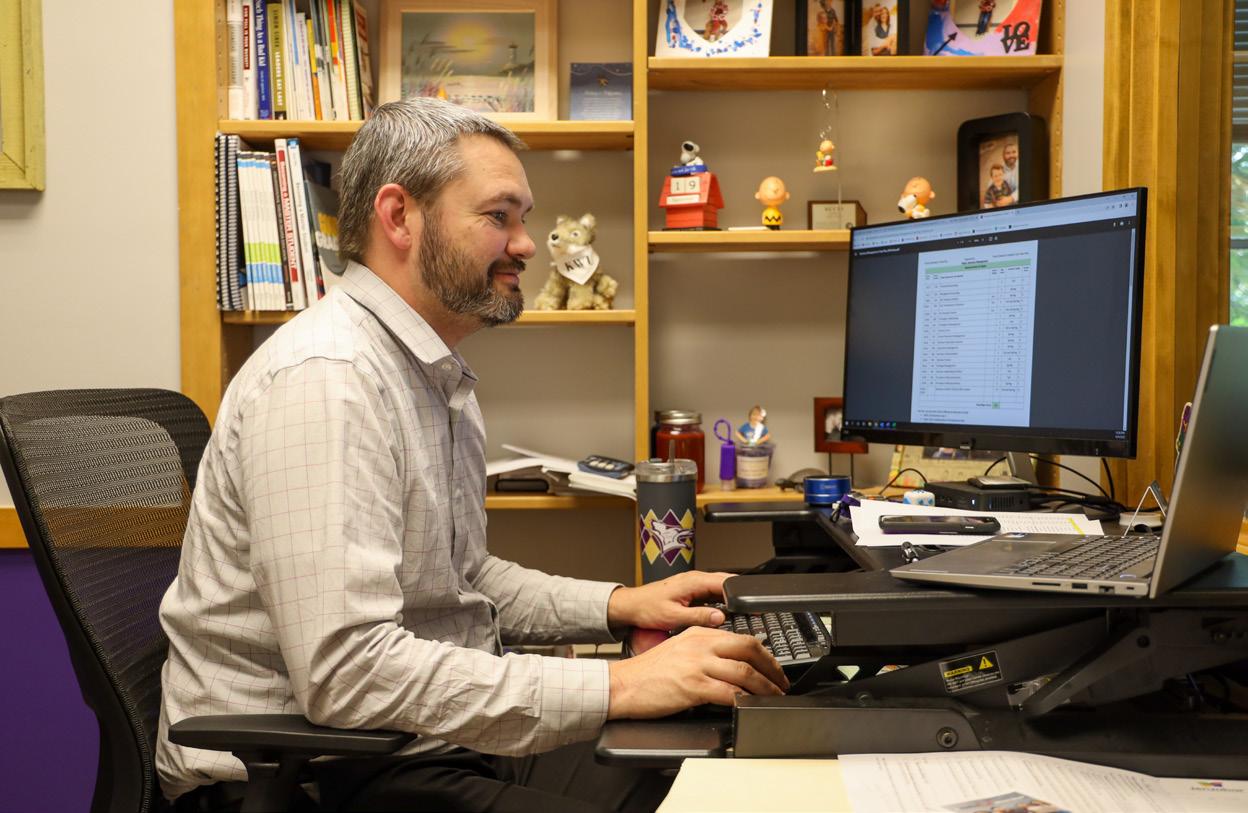
“What I love about this job is I get to work one-on-one with students and help them set and reach their
goals, overcome barriers and realize their strengths,” he said. “I also like that I get to direct and lead the Student Success coaching program that will affect not only this year’s class but next year’s class and many more to come.”
While the Student Success coaching program, based in Memorial Library,
is currently offered only to first-year students, Koons hopes to expand it to all students.
“A vision we have for next semester is to really have a good transition process between the success coach, who is acting as their advisor their first year, and then in sophomore year they’ll meet with a faculty advisor in
their major,” he said. “That way, a student is not walking in blind going, ‘I don’t know who you are and why I have to talk to you but they told me to come here.’”
Career Services moved to Memorial Library this fall, joining Student Success, tutoring and library services.
“It's a one-stop shop,” he said, for academic services.
Koons, who himself transferred universities while he was an undergrad, realizes the value in both the size of the KWU enrollment and the ability of the Student Success Center to affect students from the day they step on campus until the day they graduate.
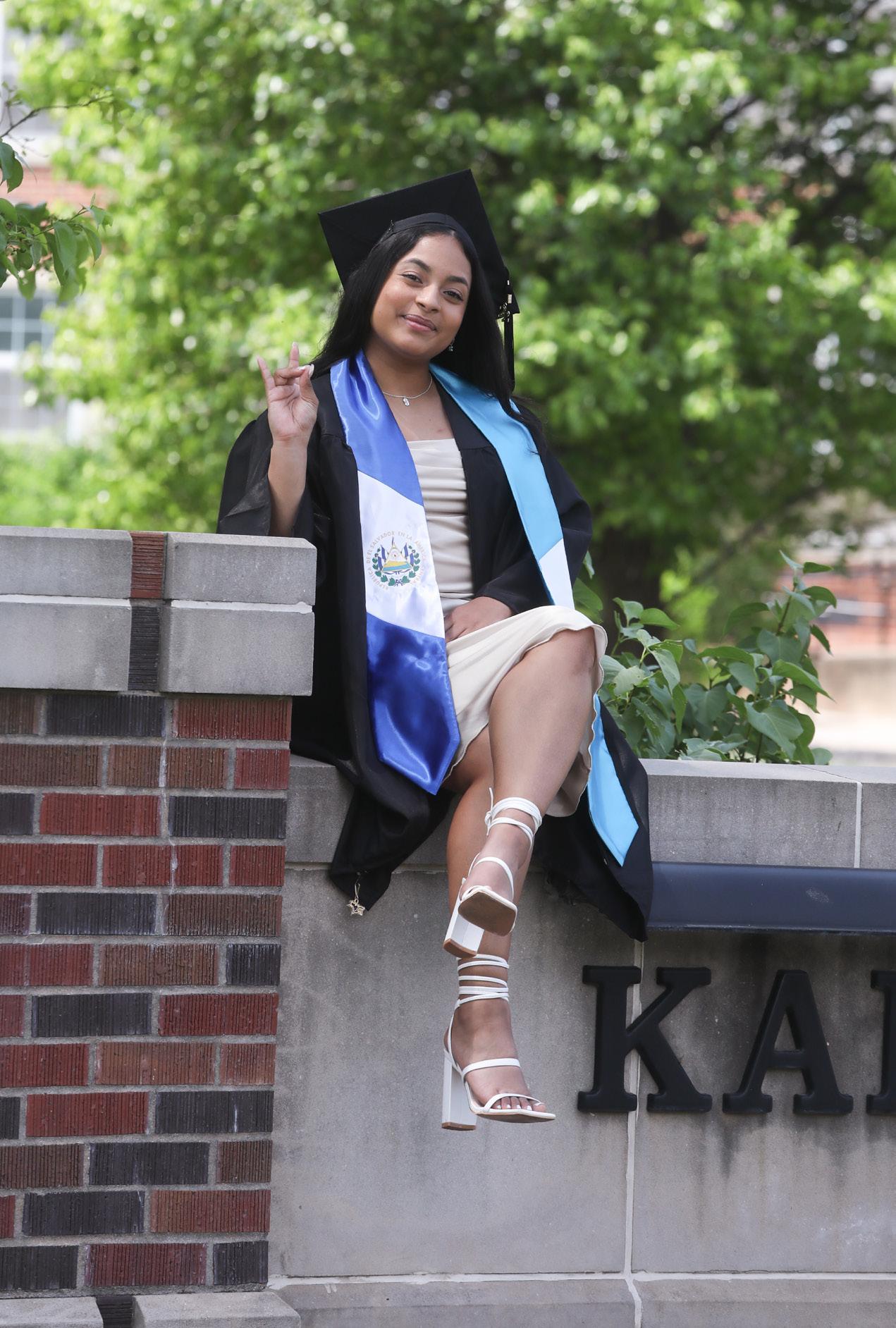
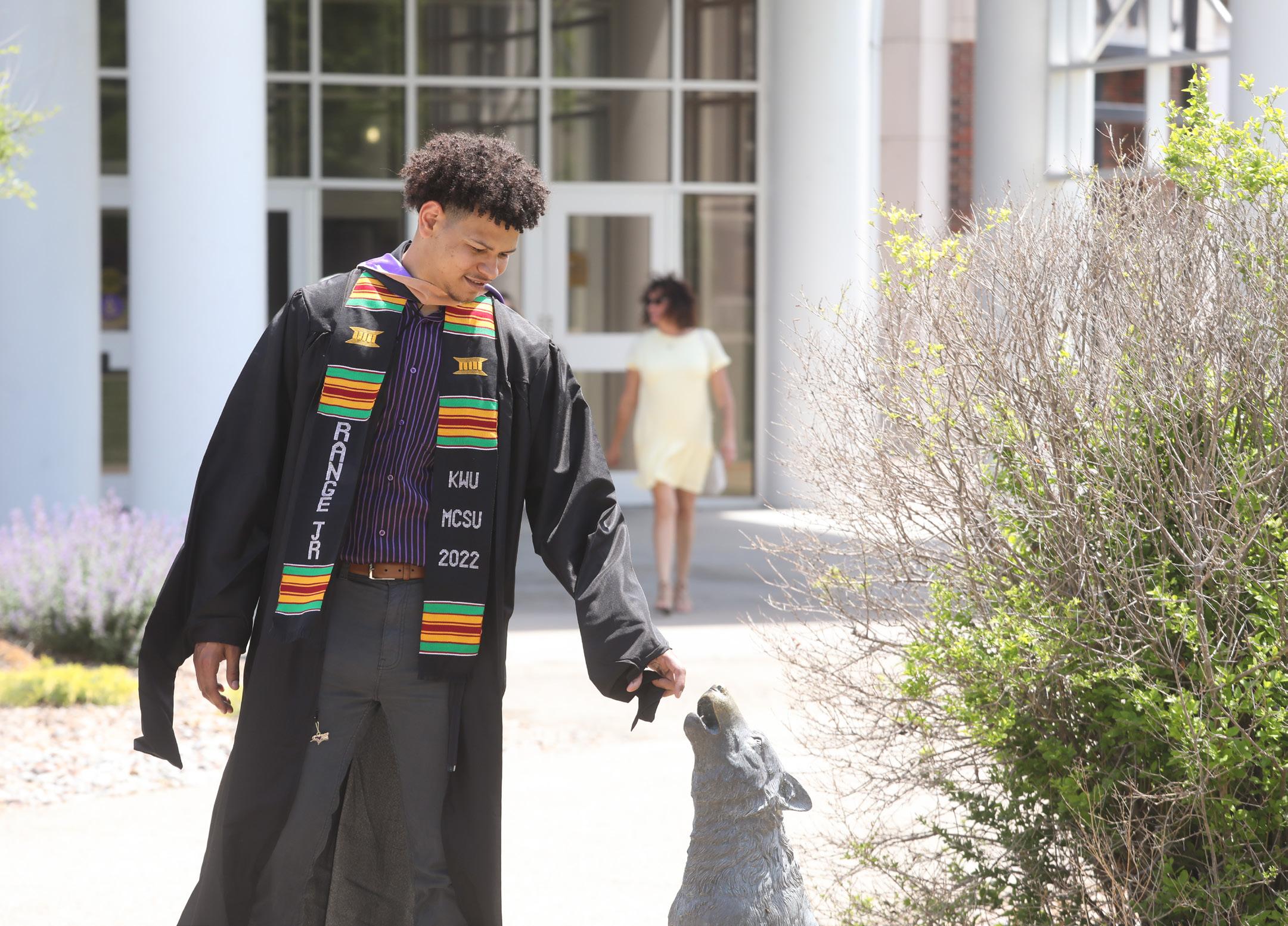
“You don’t get the opportunity to be anonymous at small schools and in smaller environments,” he said. “If you have those struggles, someone is going to find you and say, ‘I want to help you. What can I do?’ I don’t want any student to be in that boat where they disappear and none of us knows why.”
By Dan Froehlich
20 CONTACT | Fall 2022
Have you experienced the greatness of a KWU education?
Do you want to give back to the institution that’s changed the lives of so many?
JD Koons, director of the Albert Nelson Student Success Center, works in his office in Memorial Library.

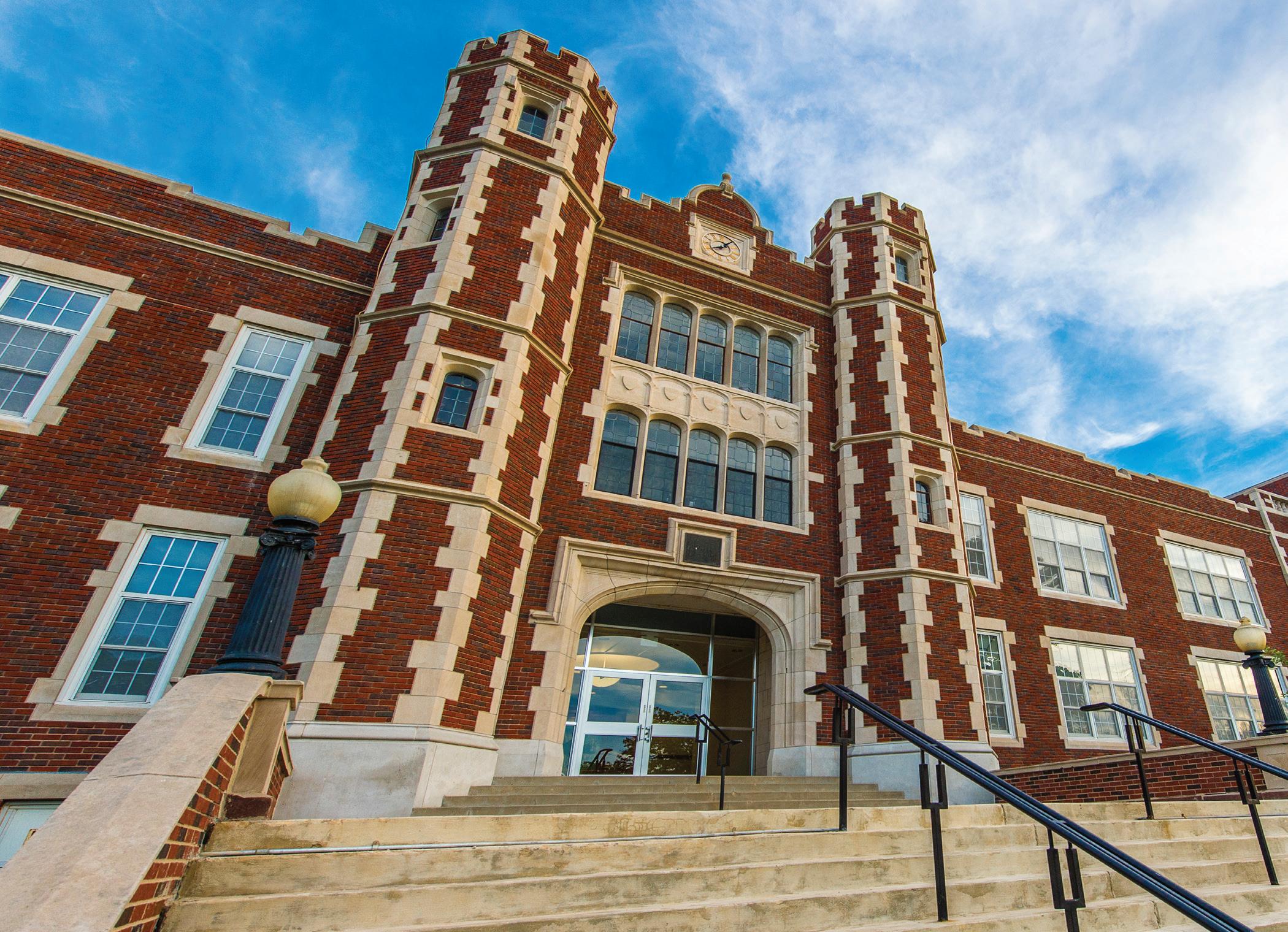
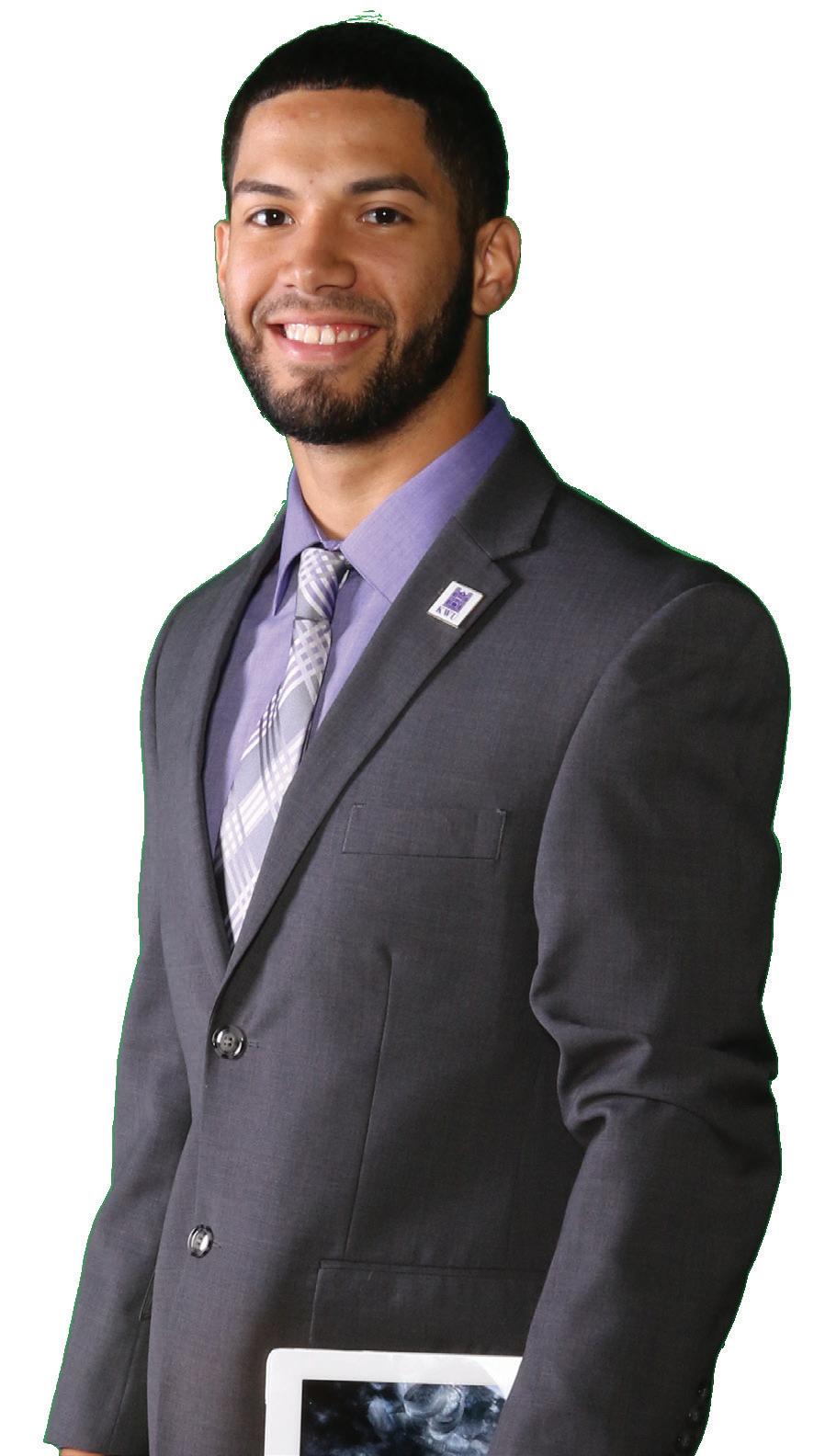
Fall 2022 CONTACT 21 KWU by the nUmbers 1-50 ......... Alumni 51-200 .... Alumni 201-550 .. Alumni 755 .......... Alumni 4668 ....... Alumni 201-550 Another 755 ..........Gold 4668 KWU Purple Did you know there are KWU alumni living in every U.s. state?* There are more than 11,000 alumni on file! *Numbers denote currently living KWU alumni with addresses on file with the university’s Advancement and Alumni offices. Check out the map to see how many are in your home state! Enroll today at www.kwu.edu/MBA MBA Elevate your skills and earn an online or on campus! Classes start Jan. 9!
A duo with a difference
Faculty duo offers mix of classical and unexpected pieces
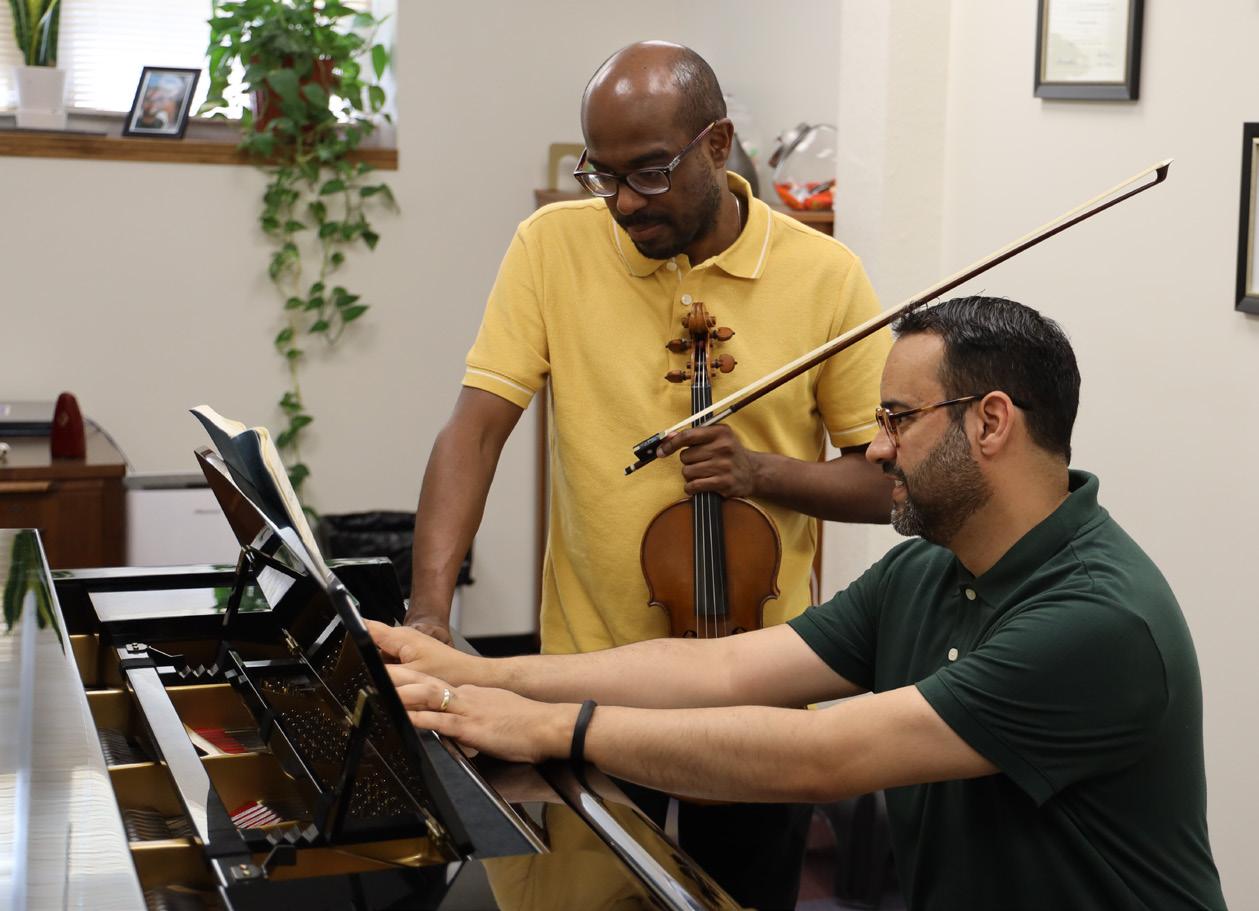
It’s the same old story: You travel thousands of miles to make a friend of someone from your hometown.
Leonardo Rosario and Gustavo do Carmo were hired to teach in the Music Department at Kansas Wesleyan in 2020.
But they first met when they played in the same orchestra in do Carmo’s hometown of Belo Horizonte, Brazil, from 2009 to 2012.
Rosario, too, is from Brazil, but calls São Paulo his hometown, about eight hours from Belo Horizonte.
“We played together from the beginning, maybe a little indirectly,” Rosario said. “He played piano, I was in the middle of the violin section.”
They knew each other, but they didn’t really talk, he added.
Now they are colleagues and collaborators at Kansas Wesleyan and with the Salina Symphony.
As assistant professor of music, Rosario teaches violin and viola, directs the strings program, and conducts the string ensemble and the new KWU Honors String Quartet for students.
Do Carmo is the university’s collaborative pianist and conducts.
“I think since we arrived here, they’ve asked us to play at events or represent the department or represent the university,” Rosario said. “So we started playing together, and at some point we said, ‘Let’s establish a faculty duo,’ and we’re playing a lot.”
They’ve been playing so much they haven’t come up with a name for the duo yet. Maybe someday, Rosario said.
“When we play what people enjoy, we bring so many things to the concert,” he said. “Sometimes they expect to hear just one kind of music that they’re used to, then we start this way and we break a lot of barriers when we start. We play, of course, Brazilian music, then we play some
Cuban, African music.”
“Why I like playing with him so much is there are so many different things that we play,” do Carmo said. “Everything I talk to him about, ‘Yeah, let’s do this!’”
They share a mission to reintroduce neglected composers to audiences.
“One of our goals as a duo is to play those composers people have forgotten,” Rosario said, “to play traditional repertoire but also to expose the audience to a different kind of chamber style.”
“I think that’s also a good thing to do in terms of research in music and performances,” do Carmo said, “to get those repertoires and start performing them more often.”
When Rosario was working on his master’s degree at the Boston Conservatory of Music, he looked around for something different to play at a recital. A Brazilian piece, he said, would have been different for the audience, but not for him.
“Then I found the title of this one piece that caught my attention, ‘African Dances.’ I started listening — wow — this is such a great, great piece!”
“African Dances” is by Samuel
Coleridge-Taylor, an early 20thcentury African-English composer. At one time, Coleridge-Taylor’s three-cantata “Wedding of Hiawatha” was sung more often that Handel’s “Messiah,” Rosario said.
“I did my research on the violin works,” Rosario said. “They’re not easy works for the instrument.”
Rosario and do Carmo performed “African Dances” at one KWU recital.
“It starts, like so easy, and we can play that,” Rosario said.
“It started going well,” do Carmo said, “then the first turn of the page and we went, ‘Uh-oh.’”
Do Carmo also researched a forgotten musician, the 20th-century Brazilian composer and teacher Ineh Machado Sandoval, usually called Tia Ineh, for his doctoral study.
“I contacted her family, and they gave me all the information on her works,” do Carmo said. “I edited everything and created a catalog, and I’m starting to record.”
Many of Tia Ineh’s pieces she wrote for her piano students, so the level of difficulty goes from early beginner to late advanced, do Carmo said.
But what some people didn’t like about her compositions was her combining musical styles.
“She started to make things jazz, samba, choro — started to mix that with classical piano,” do Carmo said.
Now it’s called fusion, and it’s a popular approach to music.
“She was ahead of her time,” Rosario said. “Both of us believe she deserves her spot in the composers. People need to know about her, play her pieces.”
Like Tia Ineh, Do Carmo, too, likes to mix his styles.
While working on his doctorate at the University of Iowa, do Carmo said, he had to have a secondary major and he chose jazz.
“When I told my advisor I wanted to do jazz, he was, like, but why?” do Carmo said. “Later, he thought it was a good idea.”
At a recent pops concert, do Carmo and Steve Leuth, lecturer and director of the jazz ensemble, played dueling pianos.
“I’m very glad we got him, because he’s good,” Rosario said of do Carmo. “I mean, a fantastic player, but also a good friend and a good person, too. He’s a very skilled person. He can play trumpet, he can conduct, play piano.”
Rosario, too, is highly skilled, earning his doctorate from the University of North Carolina at Greensboro. He won second prize at the International Chamber Music Competition of the Chamber Music Foundation of New England in 2009. He served as assistant concertmaster of the Fayette, N.C., Symphony and Boston Conservatory orchestra.
Rosario was recently named the conductor of the Youth String Ensemble with the Salina Symphony, where he also plays first violin.
Do Carmo holds the Charlotte Miller Endowed Chair for piano with the Symphony.
Each has an active performance schedule, together or with different groups.
Whatever they play is bound to be excellent, intriguing and unexpected. Kind of like finding a friend here that you first met half a hemisphere away.
By Jean Kozubowski
22 CONTACT | Fall 2022
Drs. Leonardo Rosario (left) and Gustavo do Carmo have formed a popular faculty duo for concerts and recitals. They first met in Brazil, where both are from.
NURSING STUDENT, ARMY MEDIC, SMILES AT BEING IN KANSAS
The middle of Kansas was not where a man from Reseda, Calif., a neighborhood of Los Angeles, expected to find himself.
He knew he wanted to go to nursing school, but he was in training to be a medic in the U.S. Army Reserve. He didn’t have access to a computer — or time — while in basic training. He’d missed the deadlines for applying to nursing schools in California.
“My mom, bless her, found out about Kansas Wesleyan, and I was, like, I’ll take a shot,” Asur said. “It was the only nursing program I applied to and I got in.”
She had to fill out most of the application materials for him.
He doesn’t know how his mother found out about KWU, he said, but he’s happy she did.
“The nursing program is phenomenal,” Asur said. “The professors all care about you. They want you to succeed, they want you to pass. They really dedicate their time to help you succeed. I really cherish that.”
Kansas Wesleyan cherished him back.
‘Always smiling’
Whenever anyone talks about Ethan Asur, they always mention his smile.
He was always smiling, said Janeane Houchin, director of nursing education at Kansas Wesleyan University.
“All of his evaluations from a clinical setting were glowingly positive,” Houchin said. “He’s one of the students you’d like to clone.”
“His smile always brightened the room and brought smiles to the faces of his classmates and professors,” said Anita Strommen, administrative assistant to Houchin.
Asur’s basic training and job training as a medic ended in February 2020, one week before the COVID-19 shutdown. He started at Kansas Wesleyan in August 2020, coming in with enough credits to
finish in two years. He received his bachelor’s degree this May.
His studies in the Army and nursing complement each other, Asur said.
“The Army, it’s a really good starting point,” he said. “The nursing program is really difficult. Being a medic in the Army really helps that.”
Medics and nurses both focus on similar topics, such as triage, patientcentered care and ABCs (airway, breathing and circulation), just to name a few,” he said
“Being in the Nursing program for two years really enhanced my medic skills,” Asur said. “It really helped sharpen all my medical skills, whether it comes to nursing or combat medic.”
Change of scenery
Kansas was “a real change of scenery from the city, where I am originally from,” Asur said. “I really love the farmland. It’s really nice.”
He embraced it, and he came
prepared. He’d finished his medic training in San Antonio, which happened to be having a cowboy convention of some sort downtown. This being Texas, somebody was selling cowboy hats.
“This needs to be done,” he told himself at the time. “I got a cowboy hat and never looked back, a good $70 worth of spending.”
He wore the hat when he rode the nursing float in Smoky Hill Museum’s annual Street Fair parade.
“Kansas really treated me well,” Asur said. “I had no problems in Kansas whatsoever. Everyone was so sweet and so nice in Kansas.”
When one of the instructors brought some “very sweet” dwarf goats in for stress relief during the semester’s final weeks, he embraced them, too.
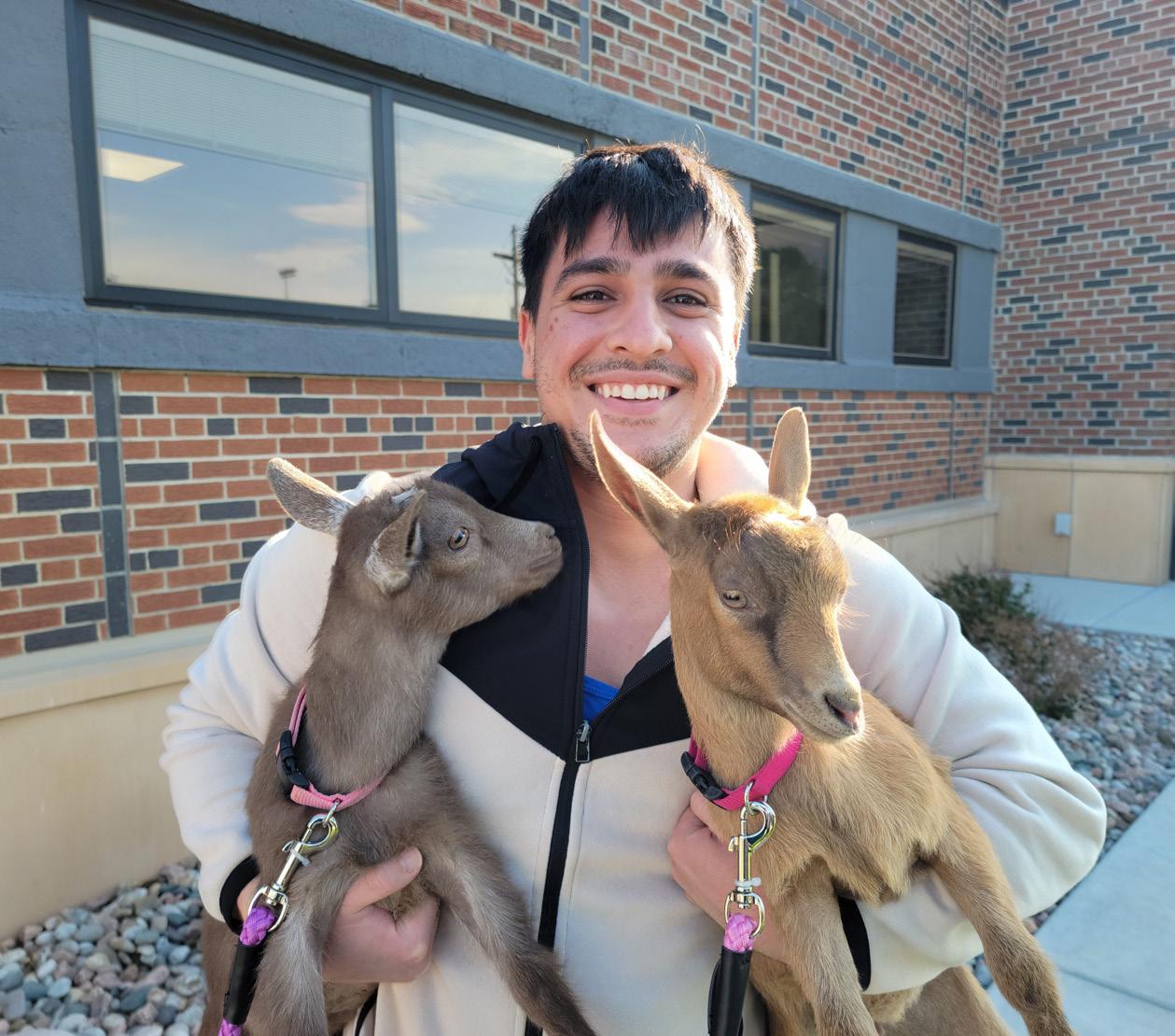
He was touched when, last Christmas, the nursing program added Hanukkah decorations to the Christmas decorations last year, said Asur, who is Jewish.
Asur always went the extra mile, Houchin said.
“He had close friends, but he reached out to those who were struggling and offered to help,” she said.
When Asur noticed some of his classmates had problems, he helped some of them with math, EKG strips and other tasks a few times throughout the two years.
He downplayed his contribution.
“Everybody graduated and that’s all that matters,” he said.
Houchin saw it as a form of paying it forward.
“It very much comes from a place of appreciation, she said. “Even when he struggled, he remained appreciative of all the help and resources that were provided him.”
Although he embraced country life, Asur hopes to work in big cities.
He’s passed the NCLEX, the national nursing exam, so he is licensed for his career in nursing and hopes to work in an emergency room in the Los Angeles area. He is, of course, open to unexpected possibilities.
“I’m so grateful and so blessed that I went to KWU,” he said. “I loved it.”
By Jean Kozubowski
Fall 2022 CONTACT 23
Ethan Asur beams as he holds two dwarf goats that a Nursing instructor brought to school for stress relief at the end of the semester. Asur graduated from the Kansas Wesleyan School of Nursing in May but is also a medic in the U.S. Army Reserve.
“Being in the Nursing program for two years really enhanced my medic skills. It really helped sharpen all my medical skills, whether it comes to nursing or combat medic.”
— Ethan Asur ’22
Growing in Ministry
Campus program moves, merges and expands
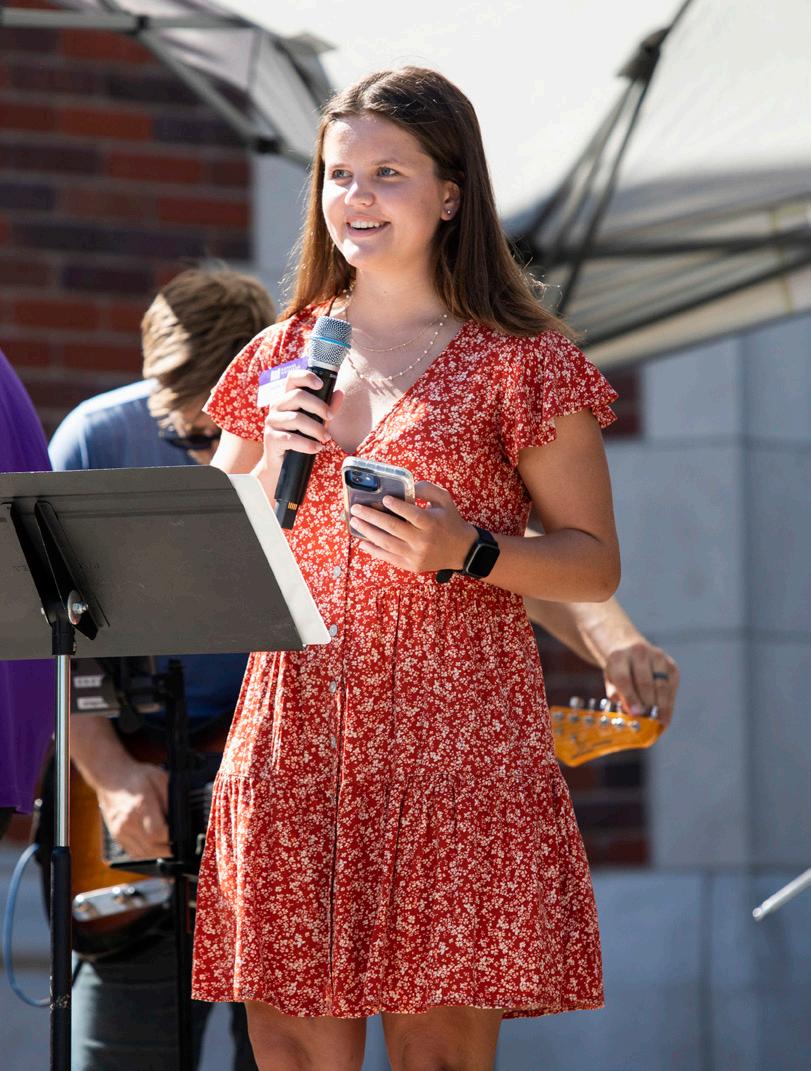
Campus ministry has always been a crucial part of the KWU experi ence. Spiritual development is one of the university’s four key pillars, stated directly in its mission statement. Recent changes, including this past spring’s announcement of increased ties with University United Methodist Church (UUMC) have brought the importance of this idea back to the forefront.
This fall, Campus Ministry moved its offices into floor "M" of UUMC, centralizing spiritual services for students. A grant provided by KWU enables Rev. Nick Talbott to take a greater role in the Campus Ministry program, joining campus minister Scott Jagodzinske as an official university pastor.
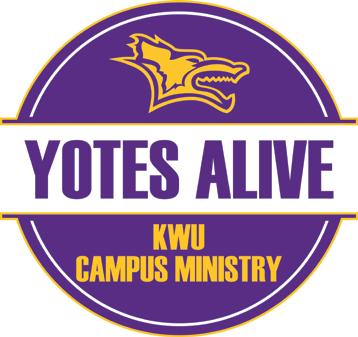
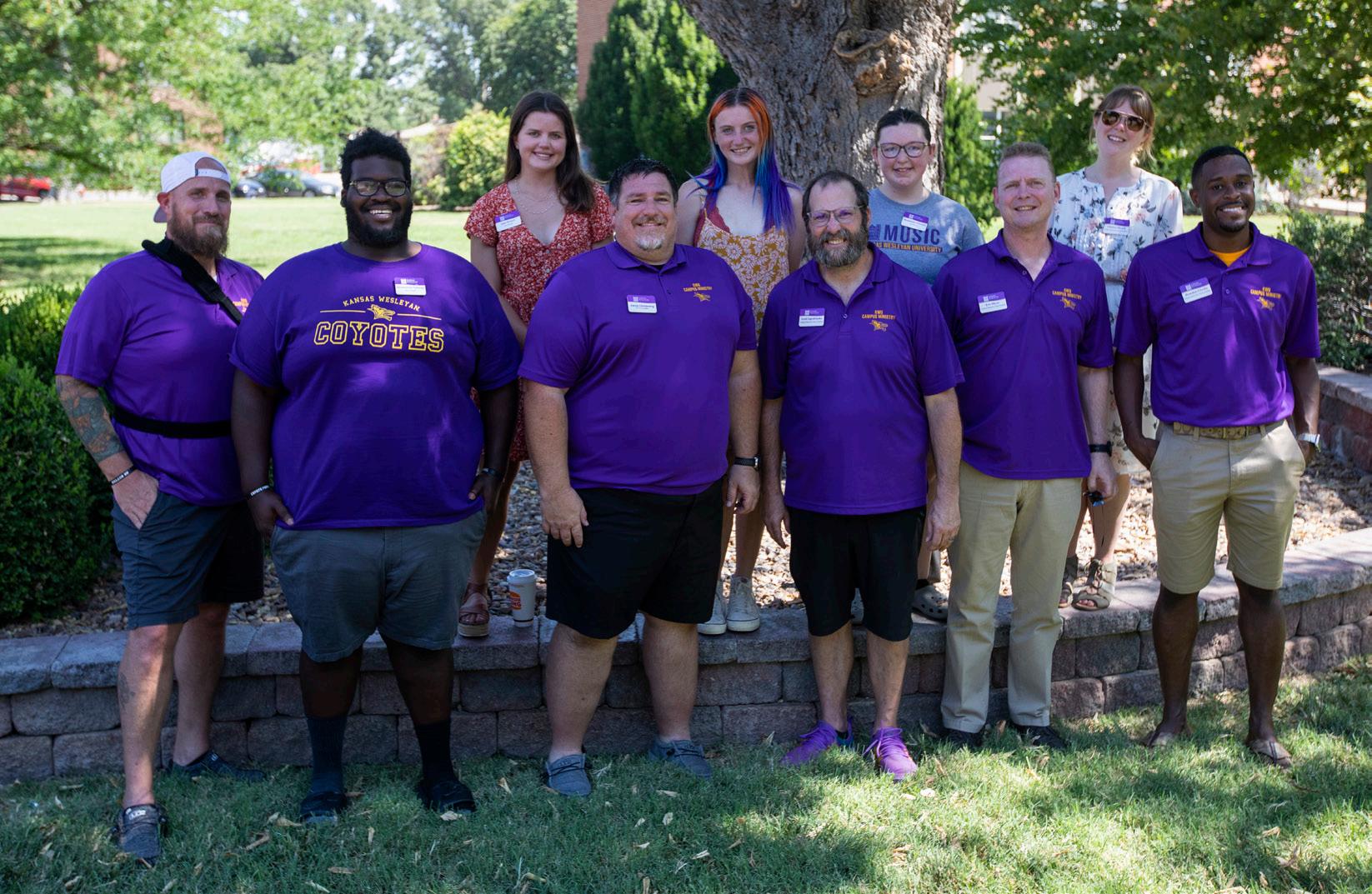
Campus Ministry continues to offer a variety of important spiritual opportunities for students on campus, including, but not limited to:
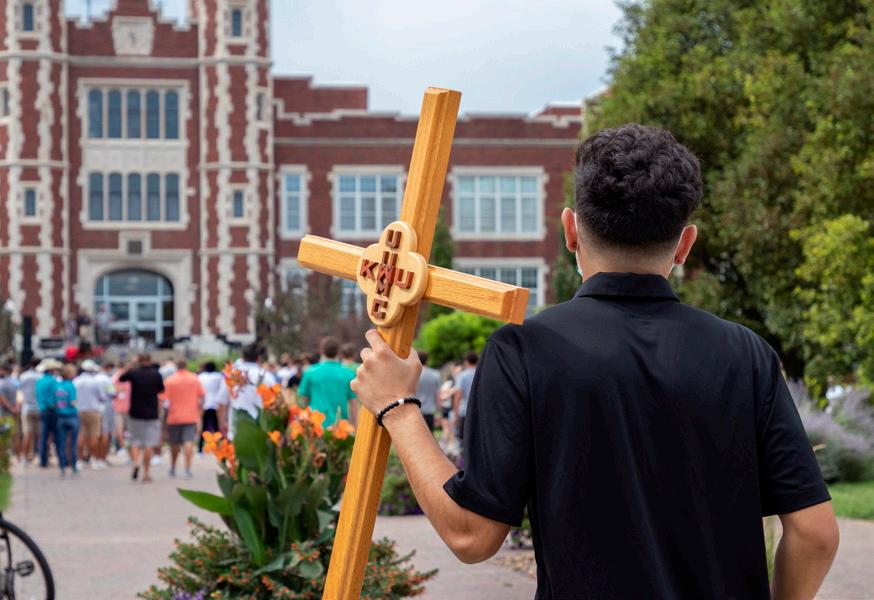
• Monday Night Alive – a campus-wide worship service, taking place every Monday evening in UUMC
• Life Groups – weekly, small Bible group studies and accountability groups
• Peer Ministers – a group composed of upper-level student leaders that serve their fellow students
• Blessings on the Go – Students can pray with one of their peers at the movable pop-up booth
• CampusServe – throughout the semester, students are given the opportunity to serve their community alongside their peers; various projects are offered during each CampusServe event
• Chaplains for each athletics team and activ ity group
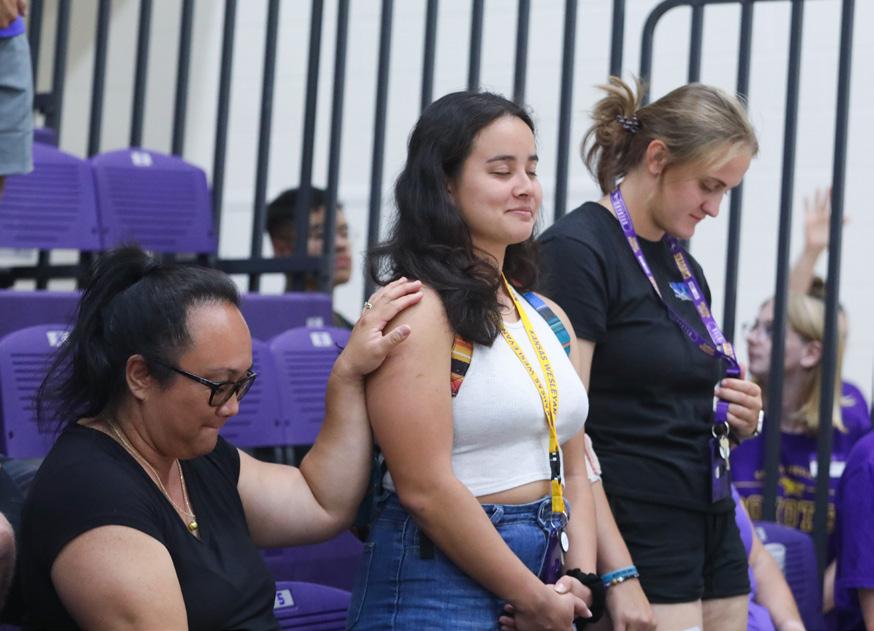
24 CONTACT | Fall 2022
The Campus Ministry team is pictured during move-in week’s Blessing of the Pack. Front Row (L to R): Nick Talbott, Quinterious Sullivan, Aaron Glendening, Scott Jagodzinske, Eric Meyer, Brandon Cheeks; Back Row (L to R): Jada Renner, Avery Smith, Madeleine Johnson and Chelsea Schrack.
Zack Brown ’13 takes on new role as president of Alumni Council
Hi, Coyotes!
I am beyond excited to begin my tenure as the Kansas Wesleyan Alumni Association president for the 2022-24 term. I look forward, along with the rest of the Alumni Council, to representing all our Coyote alumni. I graduated from KWU in 2013 with a double major in History and Speech.
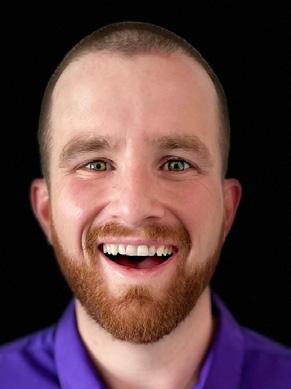
During my time at Kansas Wesleyan, I played football, competed on the debate and forensics team, held various roles in the Student Government Association, hosted or co-hosted a few different radio shows on KKWU Radio, and even spent a couple of basketball seasons on the cheer squad. All of this to say, being a Coyote
brings me a great deal of pride!
As president of the Alumni Association, my primary goal is to build on the great work of our Alumni Association as we continue to grow the Association and connect our alumni with in-person events across the country. As the university has grown these past few years, so has support of the Alumni Association.
My primary goal is to get every chapter using the Advancement office and their dedication to assisting, supporting, and promoting alumni events. I want to see the KWU network flourish and Coyotes be able to connect with one another no matter where they land postgraduation.
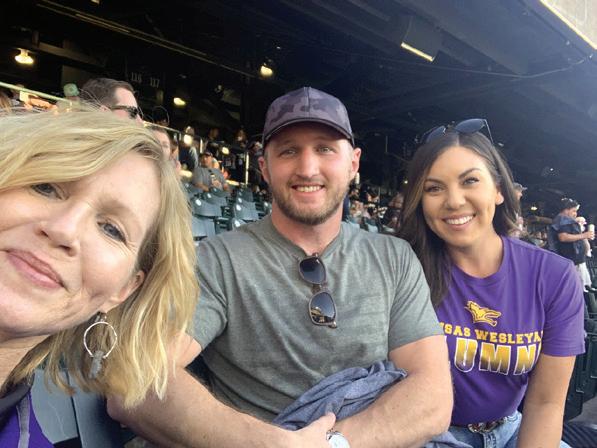
In our commitment to grow the Alumni Association and connect alums, the Association has eliminated annual dues! With that, we are honoring all of those who previously purchased lifetime memberships and we are still offering
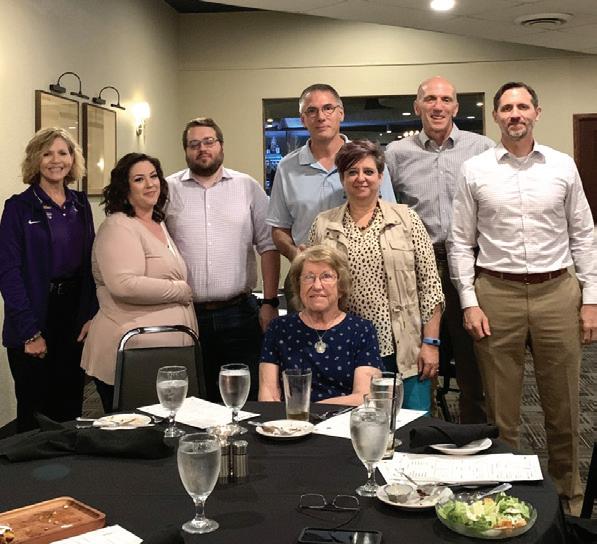
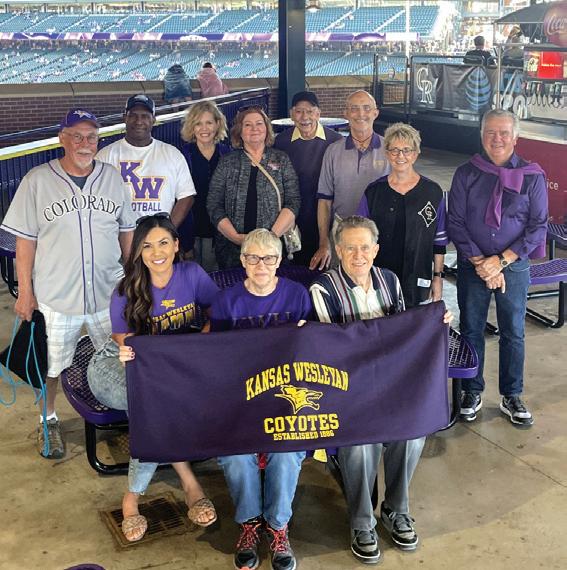
the opportunity to become lifetime members for $360 for individuals and $390 for couples. Lifetime members receive free attendance to all fine arts and regular season athletic events! All contributions to the Alumni Association go directly to the Alumni Association endowed scholarship, ensuring that your contributions and support of the Alumni Association directly benefit students at KWU.
I invite you to join us this year and beyond in attending alumni events in your area, getting involved with the alumni council, volunteering your time at university events, and/or becoming lifetime members of the Alumni Association.
I hope everyone and their family stay in good health and spirits and, as always, Go Yotes!
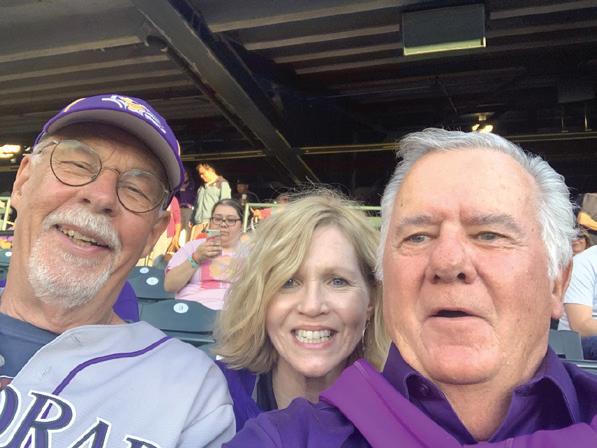 Brown ’13 KWU Alumni Association President
Brown ’13 KWU Alumni Association President
Fall 2022 CONTACT 25
Zack
Alumni gatherings have taken place throughout the region this fall! Pictured are events in Wichita and Colorado. We look forward to more opportunities to gather with members of the Coyote Family this spring! To receive the latest news on upcoming alumni events, make sure to update your contact information at alumni@kwu.edu Alumni Gatherings www.kwu.edu @goKWU | Kansas Wesleyan University | Kansas Wesleyan University
Zack Brown
KWU says goodbye to beloved emeriti
“One of the joys of working at Kansas Wesleyan University is engaging shoulderto-shoulder with faculty who embrace the university’s mission of academic excellence, spiritual development, personal well-being and social responsibility. For some, this
Dr. Yuan C. Chiang
Chemistry
A chemistry professor at KWU for 32 years (1966-2002), Dr. Yuan C. Chiang was born in China, received his bachelor’s degree from National Taiwan University and later completed his Ph.D. in chemistry at Kansas State University.
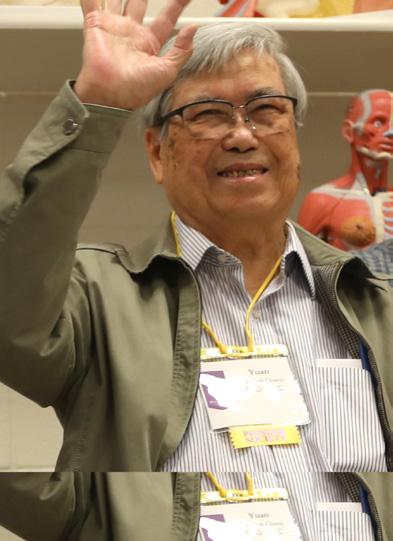
He died April 5, 2022 in California.
Chiang pioneered the field of ozone detection and measurement, earning himself and the university national attention.
Dr. Susan McDonald Physics
Dr. Susan McDonald, professor emeritus of physics at Kansas Wesleyan University, died April 12, 2022. She taught physics at KWU from 2001 to 2012 and was chair of the department. In 2015 she received emeritus status.
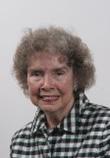
In December 2006, the Physics Club, overseen by Dr. McDonald,
Dr. William F. Edsall ’39, Pittsburgh, Pa., passed away April 12, 2022.
Fay I. (Snyder) Blackburn, ’51, Acton, Mass., passed away June 15, 2022
Barbara (Hummel) ArensmanSnyder ’53, Hutchinson, Kan., passed away March 20, 2022.
Mary Lou (Sprague) Kelly, ’54, Penacook, N.H., passed away July 10, 2022.
Richard Doering ’54, Eugene,
is not just a statement visited a few times a year, but a way of life. These four were a shining example of commitment to that mission.
New faculty were amazed by their energy and commitment to teach, advise students
He retired in 2002 with emeritus status.
In 2016, Chiang was honored with funds from the Breakthrough Project, which raised $340,000 to support the sciences at KWU. A nuclear magnetic resonance spectrometer was purchased with the funds and named for him.
He was popular with the students and was voted Most Supportive Faculty for basketball and KWU Chief Cook for grilling hamburgers at football tailgate parties. Chiang was noted for always having a camera with him.
Consuelo Diaz Spanish
On Consuelo Choca Diaz’s office door was a quote from Ralph Waldo Emerson: “Nothing was ever achieved without great enthusiasm!”
Diaz's passions included, besides her two children, languages, classical music, mall walking and chocolate.
(who always seemed to congregate around their offices), continue their own research and immerse themselves into the life of the community and the campus.”
— Prof. Barbara Marshall Nickell
Her students knew her as a woman willing to open her home to them, introducing new foods and culture to them.
launched a high-altitude weather balloon, which reached heights of 96,000 feet and contained multiple measuring implements.
A grant she co-wrote provided seismometers to KWU and two area grade schools in 2005.
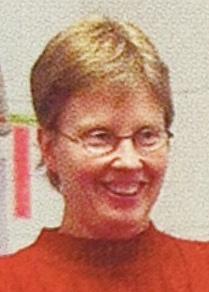
She lived in Lindsborg; Marquette, where was known to area students as “Science Sue”; and McPherson.
Dr. McDonald was diagnosed with stage IV stomach cancer in 2012.
She died March 12, 2022.
Diaz taught Spanish to generations of Kansas Wesleyan students, from 1968 to 2008, retiring with emerita status, at age 82.
Dr. Rosalee Steimel Computer Studies
Rosalee Mary Steimel, 61, of Salina, died July 25, 2022.
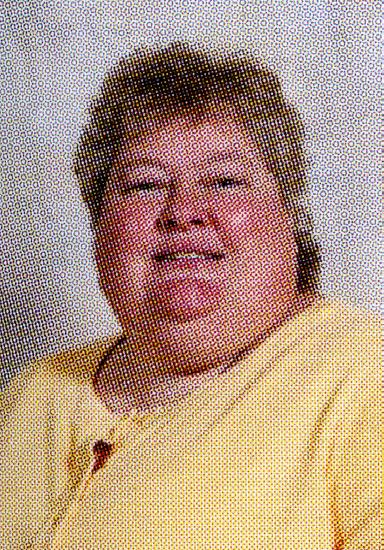
She graduated from Barton County Community College with a full tennis scholarship. She earned a B.S. magna cum laude in 1982 and an MBA in 1983 from Fort Hays State University, and Ph.D. in 1991 from Kansas State University
Diaz was born Dec. 27, 1926, in Havana, Cuba. She left to escape the Castro regime with little except her son and daughter, Michael and Sylvia (D’Angelo) in 1961. In 1968, Diaz and her children moved to Salina, where she began teaching languages and literature at Kansas Wesleyan.
In 2017, an endowed scholarship for English and Music students at KWU was established in her name.
in Curriculum and Instruction within Computer Science.
Rose taught at Marymount College, Benedictine College in Salina, and Kansas Wesleyan University (in 1996). Dr. Steimel served as chair of the Department of Computer Science and chair of the Division of Natural Sciences. She retired from KWU in 2020 and was named professor emeritus in Computer Studies.
Ore., passed away May 11, 2022. He and his wife, Joan, met at KWU and were married 69½ years.
William E. Baughman ’54, of California, passed away May 8, 2022.
Darlene Jennet (Anderson) Harris-Lindsley ’55, Dallas, Texas, passed away June 14, 2022.
Raymond H. Wilbur ’55, Lawrence, Kan., passed away Aug. 18, 2022. Mr. Wilbur was an inductee to the KWU Hall of Fame for his role on the 1954 basketball
team, as well as a notable high school teacher in Lawrence.
Dr. Vandelia (Klockenteger) VanMeter ’57, Richland Hills, Texas, passed away Nov. 25, 2021.
Dr. William F. Edsall, ’63, Pittsburgh, Pa., passed away April 12, 2022.
Maryalice (Wagner) Futrell ’65, Olathe, Kan., passed away March 3, 2022.
Paul W. Darby Jr. ’65, Conroe, Texas, passed away June 24, 2022.
Bruce Rankin ’69, Murphy, Texas, passed away July 31, 2020.
James E. Wilson ’70, Ulysses, Kan., passed away Sept. 17, 2022.
Brenda (Isaman) Branstetter ’87, Kinsley, Kan., passed away July 8, 2022.
Greg S. Downing Sr. ’88, Crystal River, Fla., passed away April 15, 2022.
Michele (Schneider) Longabaugh ’96, Sabetha, Kan, passed away April 7, 2022.
26 CONTACT | Fall 2022
In Memoriam
1970s
Dr. Stephan Ginell ’71 is a visiting scientist at the Hauptman-Woodward Medical Research Institute at Argonne National Lab. He was elected treasurer of American Crystallographic Association in December 2021. He was elected treasurer of IUCr 2026 LLC for the 2026 International Union of Crystallography meeting in Calgary, Canada, and elected as a Fellow of the American Crystallographic Association.
1980s
John H. Brooks ’84 of Bloomfield, N.J., was inducted into the Newark Athletic Hall of Fame. John is a security officer at Clifton Public Schools.
2000s
Melissa (Casper) Hardman ’03 is the head volleyball coach for Northwest Colorado Community College (heading into her 14th year of coaching at the collegiate level). Her husband, David G ’13, is the vice president of student services at Northwest Colorado CC. They have two boys, an eighth-grader and a second-grader.
Terri Van Slyke ’04 has moved back to Salina and is the recruiter and Rural Pathways coordinator for the University of Kansas Medical School, School of Nursing.
Heather Barkley Galvan ’06 is the new principal at Meadowlark Ridge Elementary School in Salina. Heather earned her bachelor’s degree and special education endorsement from KWU.
Amber Canterbury ’06 is the business manager/ junior high girls’ basketball coach/high school assistant track coach at Cotopaxi Consolidated School District in Cotopaxi, Colo.
Dr. Suzann F. Thompson Bouray ’08, G’09, Ellinwood, Kan., completed a doctorate in Educational Leadership at Liberty University –Lynchburg, Va.
2010s
Hannah Rivers ’11 graduated with her master’s from Fort Hays State University in 2021 and received her teaching certificate. She is a special education teacher at USD 475, Junction City High School, and serves on Salina’s Human Relations Commission.
Andrew Gabel ’12 has his first patent pending.
Chania Kirby ’16 married Matthew Ogden on April 22, 2021, and the Ogdens have now moved to Winter Haven, Fla., where Chania is the marketing and communications specialist for Warner University.
Wes Fleming G’17 has joined the Nebraska Cornhuskers as an analyst, working alongside Nebraska defensive coordinator Eric Chinander, the Huskers’ fifth-year defensive play-caller and a 20-year college coaching veteran.
Meagan Contreras ’18, G’20 is the director of ticketing operations at Sam Houston State Uni versity.
Austin Cross ’19 is a regional account salesman for Simon Products in Conroe, Texas, selling commercial roofing, surfaces and paint materials, among other smaller product lines.
Nissa Inzunza ’19, G’21 is working in the marketing department of the Orlando Magic.
Jordan Matheney ’19 is an admissions recruiter at Metropolitan Community College in Kansas City, Mo.
Autumn Zimmerman ’19 is teaching at Odessa College in Odessa, Texas.
2020s
Pedro Beltran ’20 received his Master in Accountancy from Kansas State University in May 2022 and is employed as an associate at SSC Advisors in Salina.
2022
Melissa Anderson is the director of Advancement and university events at Kansas Wesleyan University.
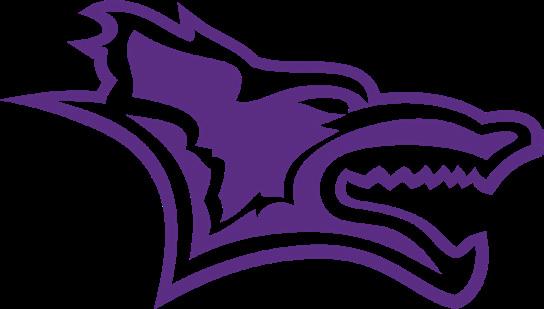
Makenzie Archer, Kelcie Bailey, Tabetha Deines and Hailey Delisle are teaching at USD 305 in Salina.
Cole Bryden is a credit analyst at Bennington State Bank.
Morgan Bryand is a personal trainer at Sharp Performance.
Katie Conley is teaching music at USD 466 in Scott City, Kan.
Mallory Dowell is a youth case manager at Cen tral Kansas Mental Health Center.
Madison Elskamp is an autism support specialist at OCCK in Salina.
Ryann Kats is a graphic designer at the Hansen Museum.
Michael Mathews is a field appraiser with Saline County Appraiser’s Office.
Brian Nelson has secured a public accounting position at Long & Association.
Haylie Rodriguez is employed at Exline at a staff accountant.
Samantha Rossin is a dispatcher with the Salina Police Department.
Zofia Selwesiuk is an IT support specialist at Bennington State Bank.
Hailey Vandevanter is the events and communications coordinator at Austin Better Business Bureau in Austin, Texas.
These Nursing graduates are employed at Salina Regional Health Center: Gia Bryant in Rehab; Kaitlyn Clements in Surgery, JayCeee Flowers in ICU, Kelcey Hinz in the Emergency Department, David Mares in ICU, Mackenzie Pease in Ambulatory Care, Lora Ray Shinn in the Emergency Department and Sara Taylor on 3 SE.
Fall 2022 CONTACT 27
Please make sure to update your contact information with the alumni office, alumni@kwu.edu, to receive the latest news from KWU!
Class Notes
100 E. Claflin Ave. Salina, KS 67401-6196
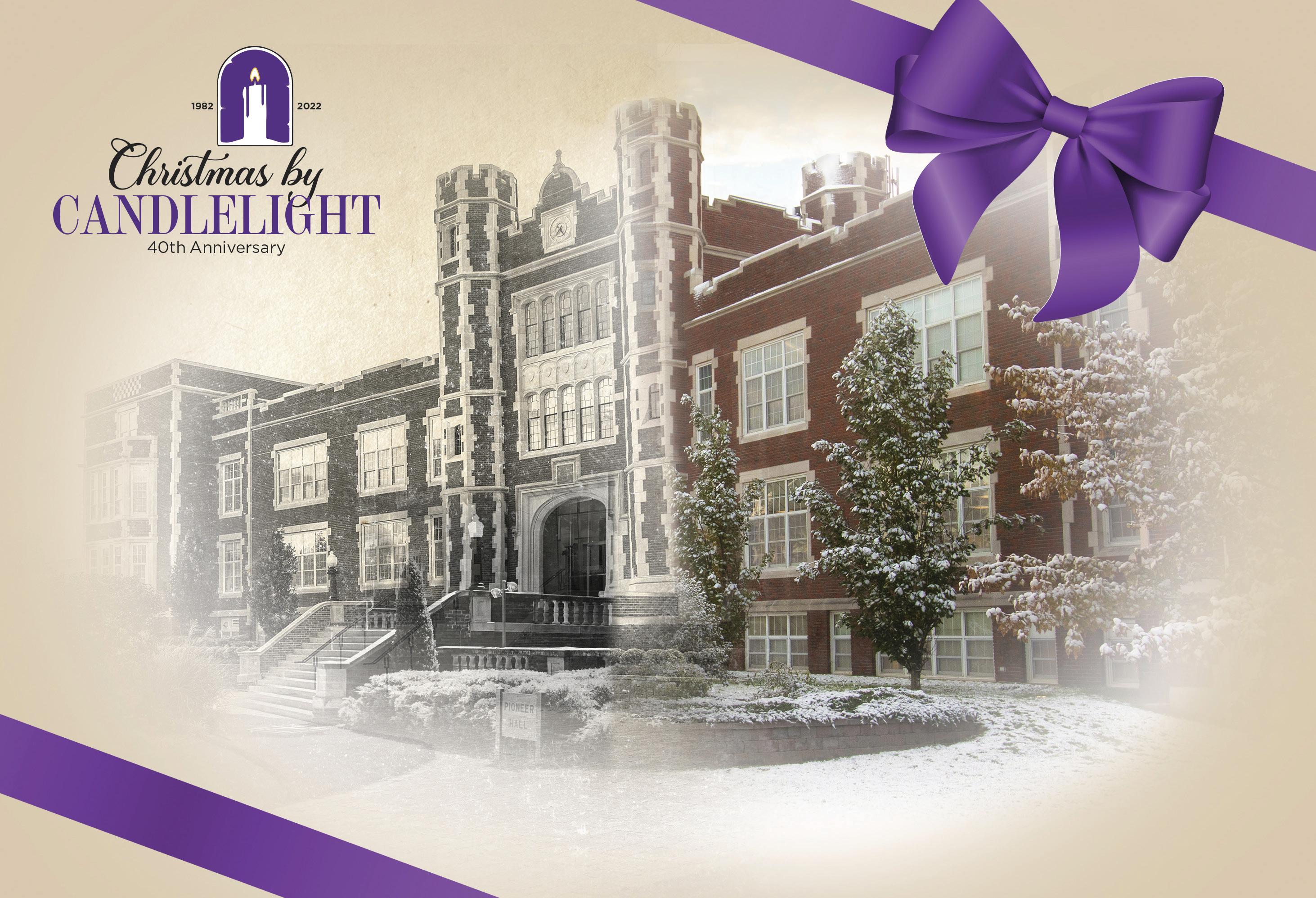
Nonprofit Org. U.S. Postage PAID Permit 122 Salina, KS 67401 KANSAS WESLEYAN UNIVERSITY Sams Chapel | Dec. 4 | 5 p.m. For live streaming information and other details, visit www.kwu.edu/CBCL22




































































 Brown ’13 KWU Alumni Association President
Brown ’13 KWU Alumni Association President





